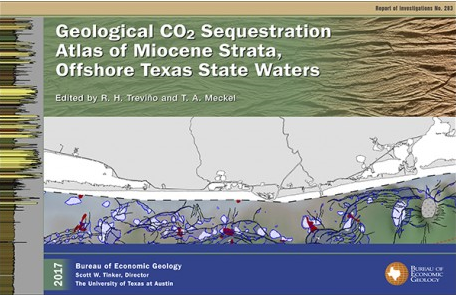News 2024

December 17, 2024: Alex Bump will be the keynote speaker at The Geoscience Energy Society of Great Britain’s (GESGB’s) CCS4G Symposium, organized by the “Exploring the Energy Transition” Special Interest Group. Alex’s keynote speech is entitled, “Playing for Keeps: Exploring for Carbon Storage.” Download the agenda here.
December 17, 2024: Carlos Uroza will virtually participate in the SEG EVOLVE Program, and will have a presentation entitled, "CO2 Storage Opportunities in the Gulf Coast area."

December 9–13, 2024: GCCC representatives, including Ruichang Guo, Hailun Ni, Ramón Treviño, and Hongsheng Wang, will attend AGU in Washington, D.C. at the Washington Convention Center. Presentations include:
Monday, December 9
- 13:40–17:30 - Deep Learning-based Parameterization of Complex CO2 Saturation Data in Large-scale Geological Carbon Storage [Poster Presentation] by Hongsheng Wang & Seyyed Hosseini (Hall D, Poster Hall)
- 13:40–17:30 - Pore-scale investigation on cyclic injection-withdrawal process in porous media in hydrogen-brine-rock systems by Ruichang Guo, Reza Ershadnia & Seyyed Hosseini (Halls B-C, Poster Hall)
Wednesday, December 11
- 16:00–17:30 - Hailun Ni is the main convener for an oral session entitled, Removing Technical Obstacles to Large-Scale Deployment of Geological Storage Systems (Salon B)
- 16:00–16:10 - A Proposed 4-Phase Workflow for Defining Permit-Ready Locations for Large-Volume CO2 Injection and Storage [Oral Presentation] by Ramón Treviño, Sue Hovorka, Dallas Dunlap, Richard Larson, Tucker Hentz, Seyyed Hosseini, Shuvajit Bhattacharya, & Michael DeAngelo (Salon B)
- 17:00–17:10 - Simulation Study of Fault Boundary Conditions on Cross-Fault Flow in Carbon Geological Storage [Oral Presentation] by Zhicheng Wang & Seyyed Hosseini (with alternate presenter Hongsheng Wang, Salon B)
Thursday, December 12
- 08:30–12:20 - Hailun Ni is the main convener for a poster session entitled, Removing Technical Obstacles to Large-Scale Deployment of Geological Storage Systems (Halls B-C, Poster Hall)
- 08:30–12:20 - A laboratory and simulation study on the impact of small-scale heterogeneity on field-scale CO2 plume migration and trapping [Poster Presentation] by Hailun Ni, Jose Ubillus, Sahar Bakhshian, David DiCarlo, Tip Meckel (Halls B-C, Poster Hall)
- 13:40–17:30 - Leakage assessment of hydrogen through abandoned wells in depleted gas reservoir for underground hydrogen storage by Ruichang Guo, Hongsheng Wang, Jianqiao Leng & Seyyed Abolfazl Hosseini (Hall B-C)
Friday, December 13
- 10:30–10:40 - Exploring the Development of Multiple Injection Projects in the Same Basin: A Case Study of the US Gulf Coast by Seyyed Hosseini & Zhicheng Wang (with alternate presenter Ruichang Guo, Salon B)
- 11:30–11:40 - Using sand-tank laboratory experiments to better understand and de-risk a CO2 controlled release field experiment (Invited) [Oral Presentation] by Hailun Ni, Andrew Feitz, Eric Tenthorey, Hadi Nourollah, Katherine Romanak, Sue Hovorka (Salon B)
December 6, 2024: The GCCC's graduate students graduating December 2024 presented their final M.S. Presentations at 11 am in the Main Conference Room at the Bureau of Economic Geology. Presentations included:
- The Value of Stratigraphic Well Data for a Geological Carbon Storage Project by Sawsan Almalki.
- Effect of Sub-seismic Reservoir Heterogeneity on CO₂ Plume Migration, Onshore Gulf of Mexico by German Chaves.
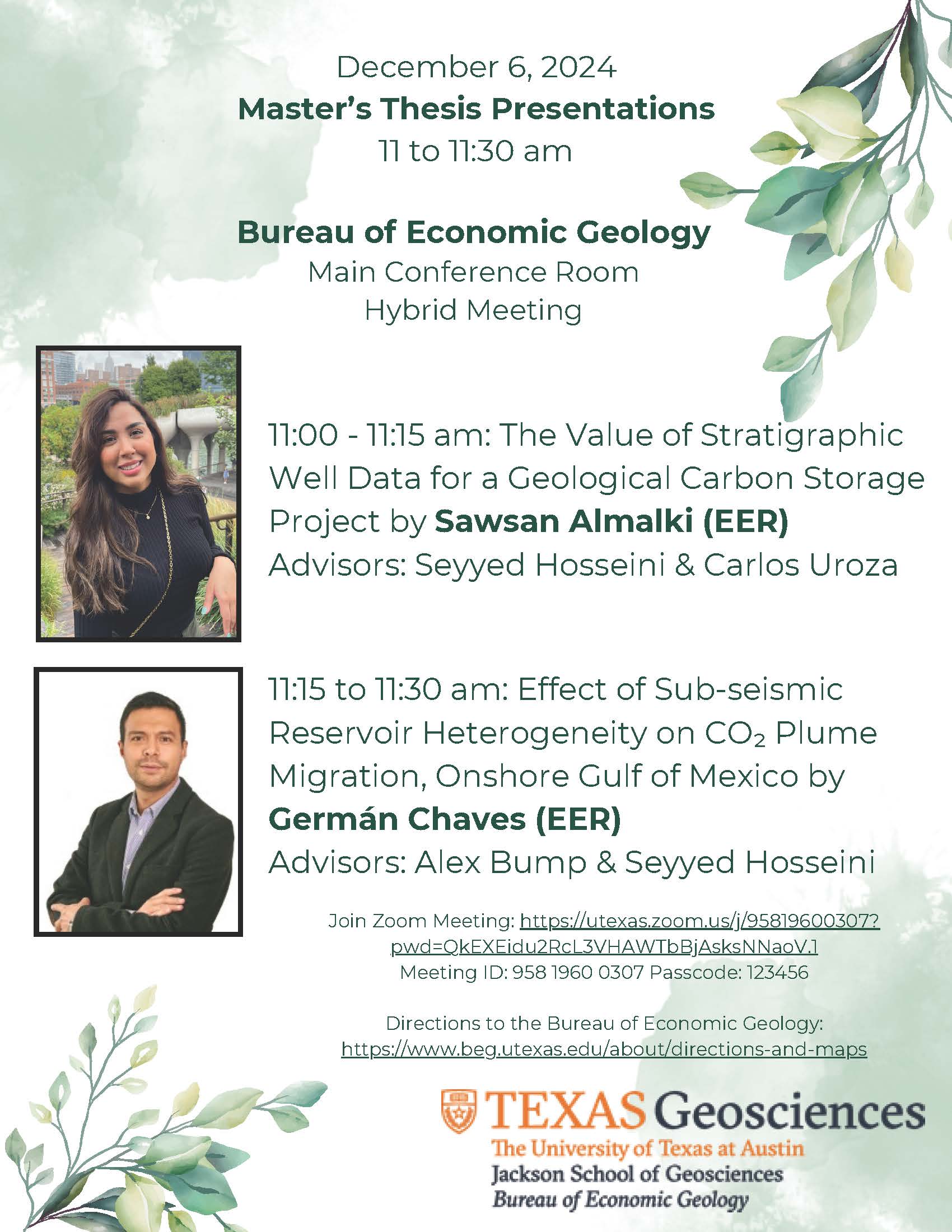
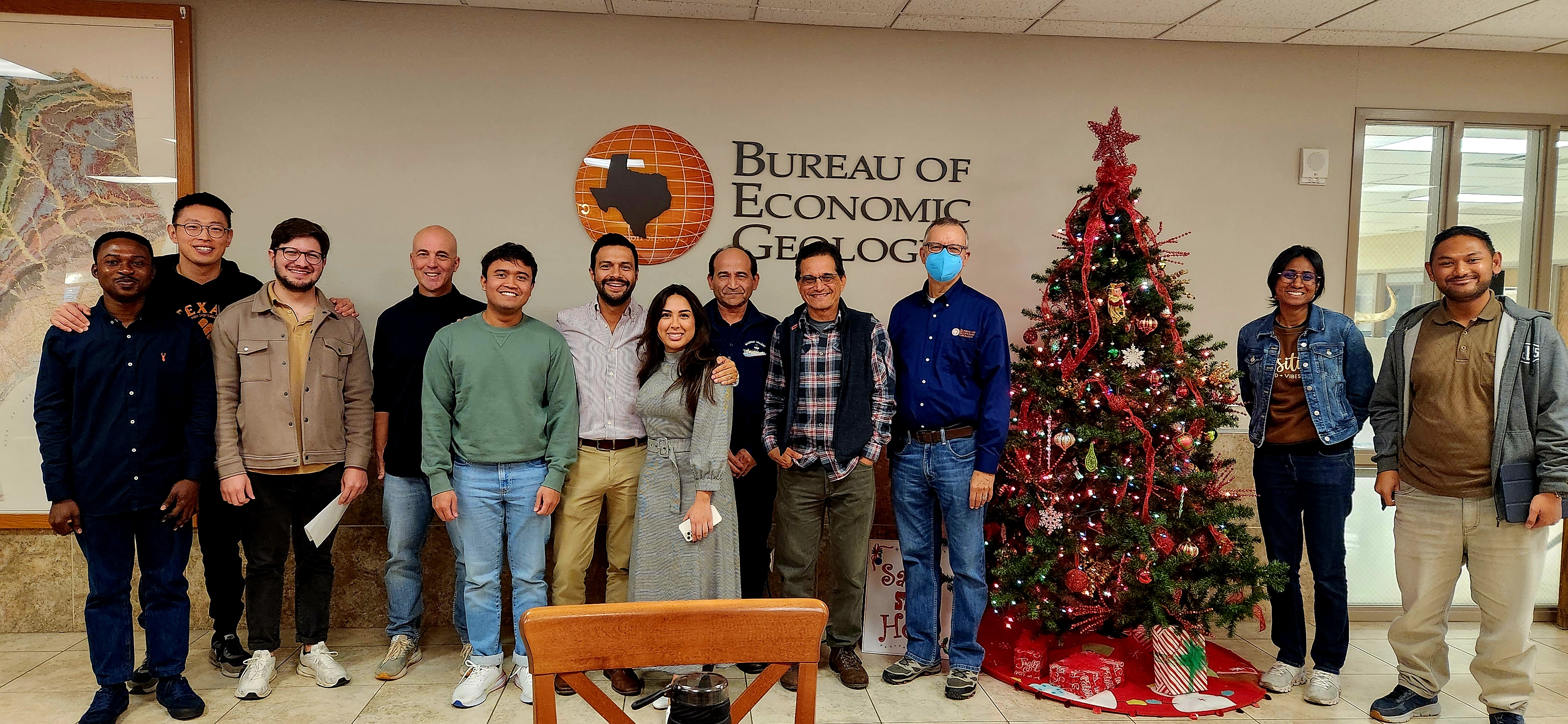
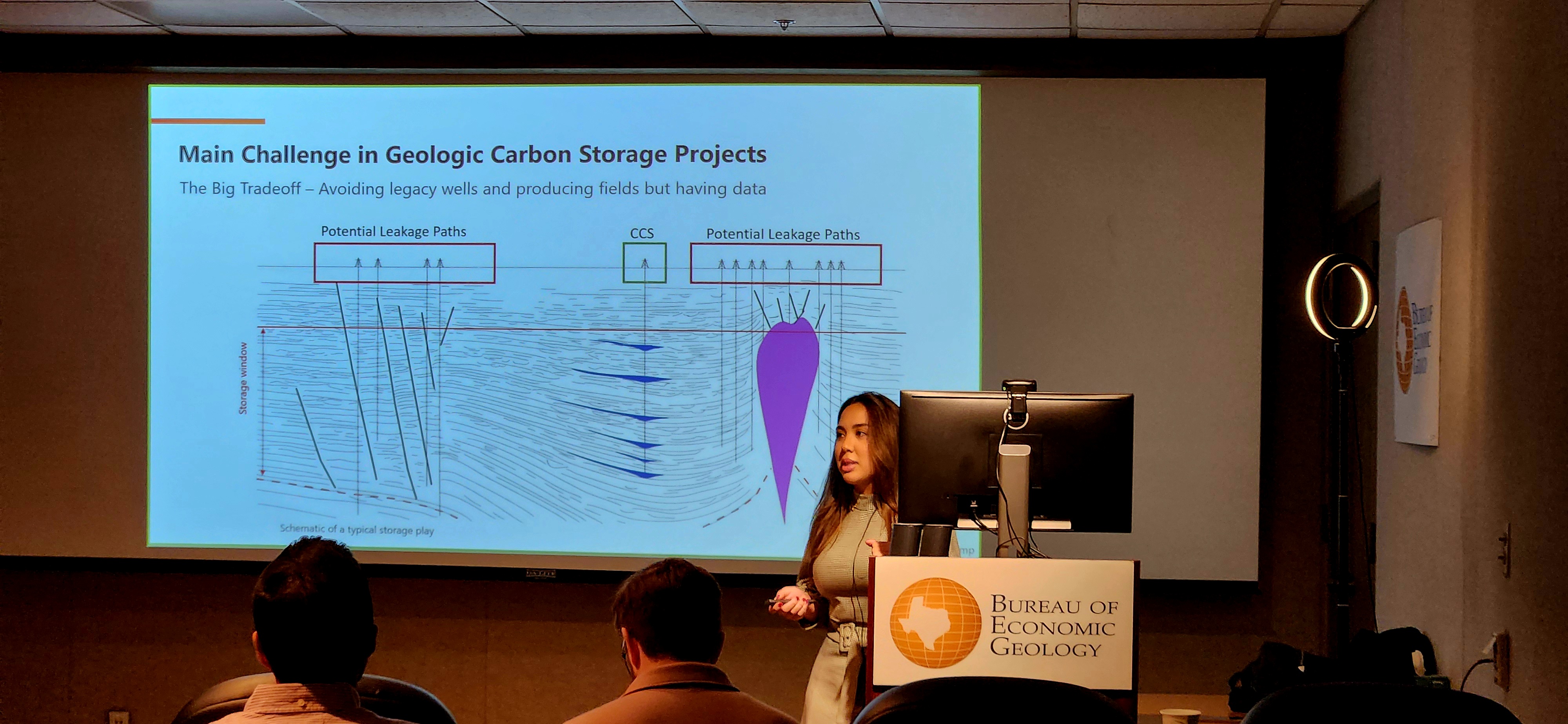
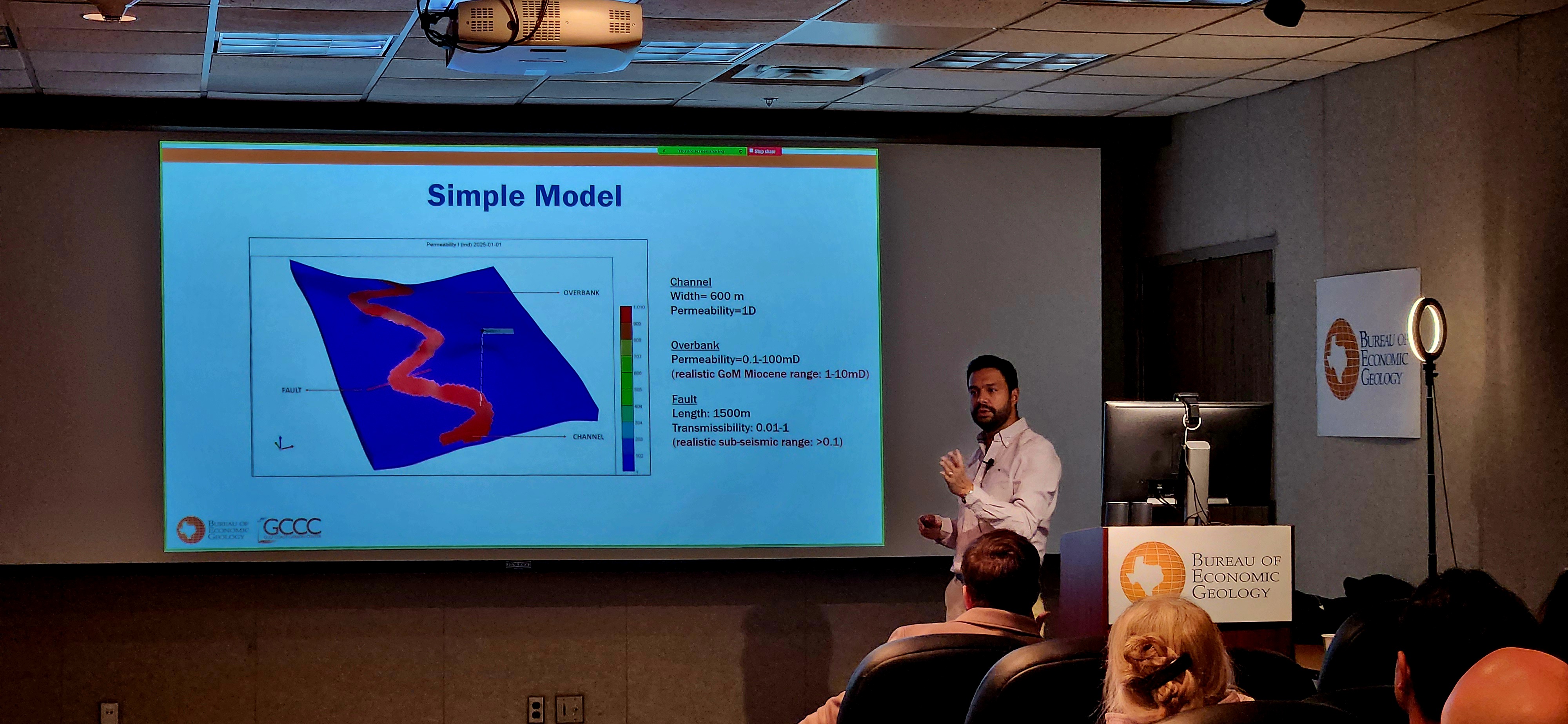
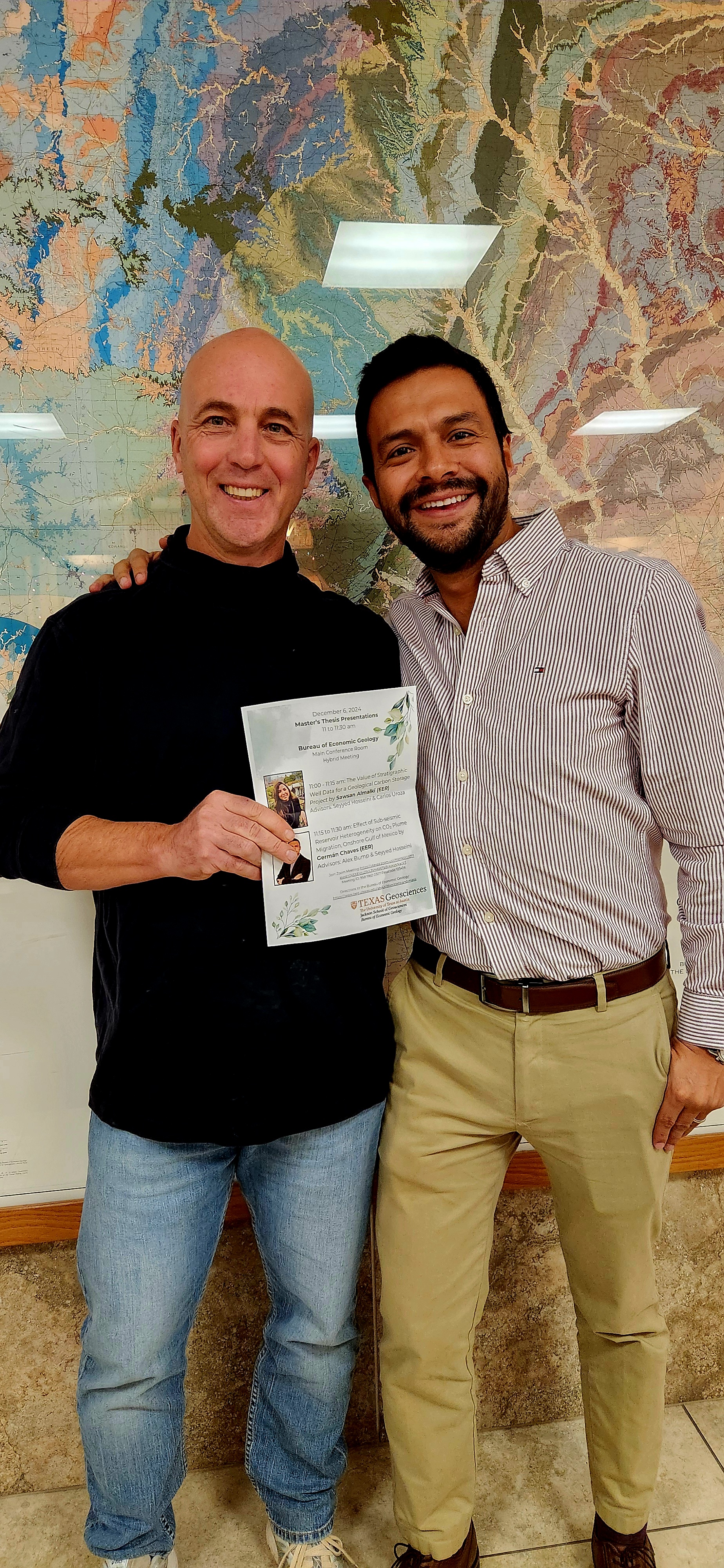
December 4–5, 2024: Katherine Romanak was invited to present at the “Workshop CCUS – An Opportunity for Growth and Progress Towards the Energy Transition” hosted by ICPET (Instituto Colombiano del Petroleo y Energias de la Transicion) and EcoPetrol. This workshop will be held in the city and municipality of Piedecuesta in the Santander Department in northeastern Colombia. Katherine will discuss “Leak Monitoring in CCS Projects” within a session about challenges and the future of CCUS projects in the subsurface. Katherine will also participate in a Q&A session with another presenter Sarah Seltzer, which will be moderated by Mario Guzman. Click here to review the agenda.
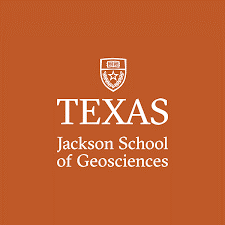
December 4, 2024: Alex Bump was invited by Professor Tim Shanahan to provide a talk for a freshman-level environmental course at the Jackson School of Geosciences. Alex provided a presentation entitled, "Climate change, CCS, and the need for geoscientists."
December 2–4, 2024: Several researchers from the Gulf Coast Carbon Center will attend the GCSSEPM 40th Annual Perkins-Rosen Research Conference in Houston, Texas and are associated with a several oral presentations:
- On Monday, 1:00–1:25 pm – “CO2 storage resources of the offshore Gulf of Mexico continental shelf” by Alex Bump* & Ismail Faruqi.
- On Monday, 3:45–4:10 pm – “Calibrating performance predictions for large-scale injection” by Chinemerem C. Okezie, Alex Bump*, Susan D. Hovorka
- On Monday, 4:35–5:00 pm – “Modeling CO2 plume migration and retention with physical analogs by Hailun Ni*
- On Monday, 5:25–5:50 pm - “The impact of capillary heterogeneity trapping on field-scale CO2 geologic storage simulations” by Jose Eduardo Ubillus*, Hailun Ni, Sahar Bakhshian, David DiCarlo, Tip Meckel
- On Tuesday, 2:25–2:50 pm – “Geological characterization of the Chandeleur Sound 3D seismic survey area, offshore Louisiana, and the potential for anthropogenic carbon sequestration within a newly discovered Middle Miocene submarine canyon” by Marcie Phillips*, Annie Walker, Dallas Dunlap, John W. Snedden, Michael L. Sweet, Shuvajit Bhattacharya. Please note: The research for the Phillips, et al., presentation was conducted as part of the GoMCarb Partnership, which the GCCC leads.
- On Wednesday, 9:00–9:25 am – “The role of salt tectonics in the energy transition: An overview and future challenges” by Oliver Duffy, Michael Hudec, Frank Peel, Gillian Apps, Alex Bump, Lorena Moscardelli*, Tim Dooley, Naiara Fernandez, Shuvajit Bhattacharya, Ken Wisian, Mark Shuster
Alex Bump co-chaired a session entitled, CCUS Regional & Site Evaluation, and Hailun Ni co-chaired a session entitled, Modeling and Risking of Carbon Storage and Containment. Click here to read the agenda.
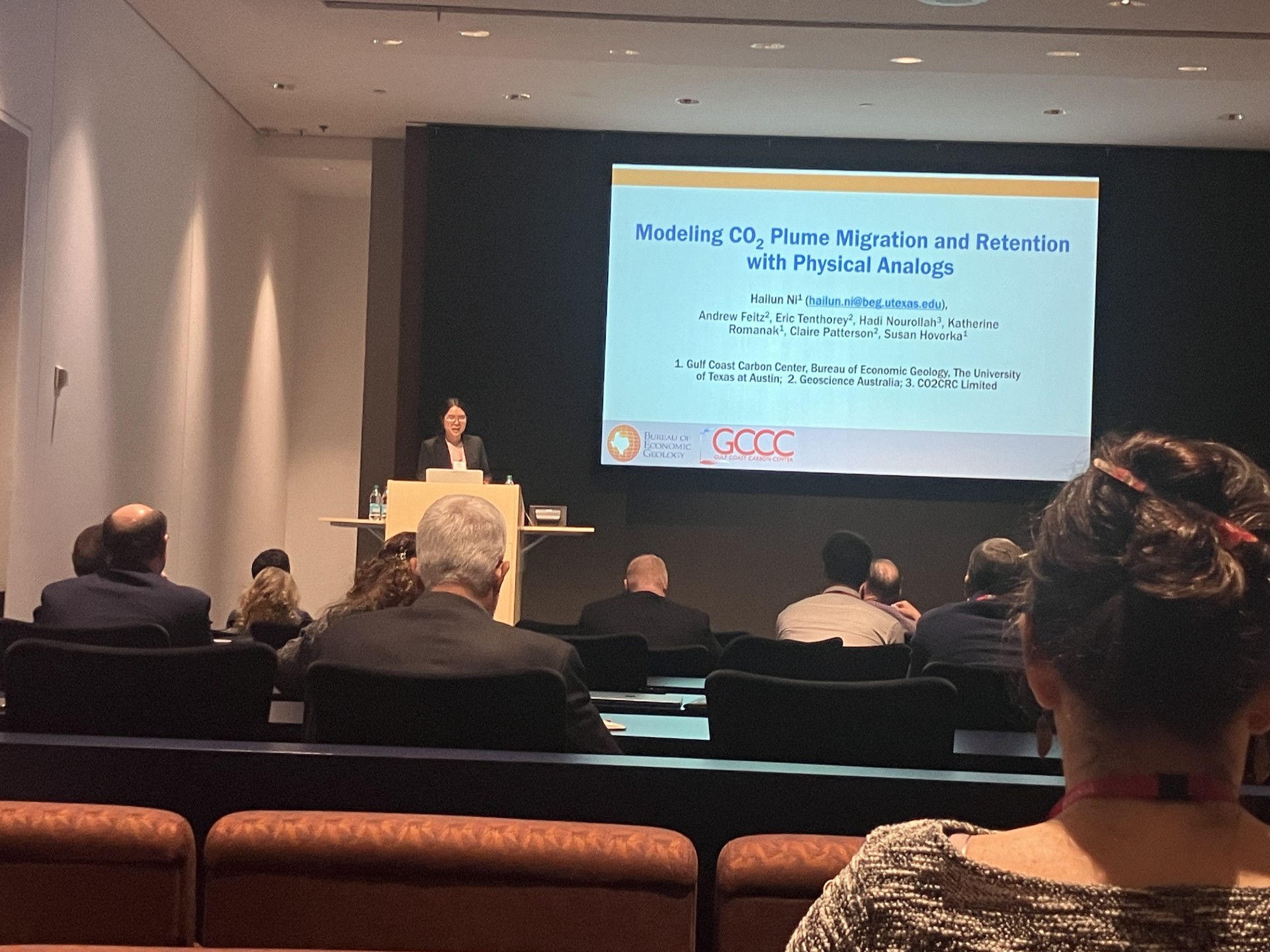
November 22, 2024: The GCCC weekly group meeting this week features M.S. presentations and project discussions by Sawsan Almalki and Germán Chaves who are currently wrapping up their M.S with the Energy and Earth Resources at the Jackson School of Geosciences this semester. Sawsan will present on, The Value of Stratigraphic Well Data for a Geological Carbon Storage Project. Germán will present on, Sub-Seismic Fault, Channels, and CO2: Modeling Unintended Plume Growth in an Heterogenous World. Hook’em Horns!
November 20, 2024: Sue Hovorka attended the Stanford Center for Carbon Storage’s Monitoring, Measurement, and Verification (MMV) Workshop at Stanford University where she was a keynote speaker.
November 20, 2024: As part of Katherine Romanak’s activities at COP 29 in Baku, Azerbaijan, she participated in a Caribbean-focused event. Trinidad and Tobago “shared their progress and learnings with developing carbon capture and storage (CCS), including being awarded Green Climate Fund funding for capacity building on CCS, in order to help other Caribbean countries understand whether CCS is a mitigation option for them.” This session was moderated by moderated by Tim Dixon (IEAGHG) and speakers for this 1-hour event included:
- Moderator and Scene-setting – Tim Dixon, IEAGHG
- Welcome - Brad Crabtree, Assistant Secretary at FECM US Department of Energy
- What is CO2 Geological Storage – Professor Katherine Romanak, University of Texas
- Developments in Trinidad and Tobago - Professor David Alexander (UTT) and Professor Raffie Hosein (UWI) (remote)
- CCS Potential in the Caribbean Region and Green Climate Fund - - Professor Donnie Boodlal (UTT) (remote)
- CCS in Guyana – Adiola Walcott (University of Guyana) (remote)
- The role of the Caribbean Community Climate Change Centre in accessing Green Climate Fund funding in the Caribbean - Mr Donneil Cain - Caribbean Community Climate Change Centre (CCCCC).
- Questions from the audience
November 19, 2024: At COP29 in Baku, Azerbaijan, Katherine Romanak participated in an Official UNFCCC Side Event entitled, Is there any Climate Finance for Carbon Capture and Storage, Especially in Emerging Economies? There were great discussions, presentations, and perspectives from the following speakers:
- Tim Dixon (IEAGHG - Moderator and scene-setting)
- Brad Crabtree (Assistant Secretary at the US Department of Energy – Welcome)
- Sarah Jones (UK Minister for Industry and Decarbonization – Welcome)
- Dr. Katherine Romanak (Research Professor, The University of Texas at Austin – Safety and De-risking Geological Storage)
- James Fann (President and CEO, International CCS Knowledge Centre – Canadian Incentives and De-risking Capture)
- Olivia Powis (CEO, CCSA – UK Policies and Incentives)
- Jonas Helseth (Director, Bellona – EU policies)
- Clarine Ovando (Climate Technology Advisor, UNEP – CCS in TNAs)
- Donneil Cain (Senior Project Development Specialist, CCCC – Role of the CCCCC in the Green Climate Fund and success in Trinidad and Tobago)
Photos by IISD/ENB | Matthew TenBruggencate:
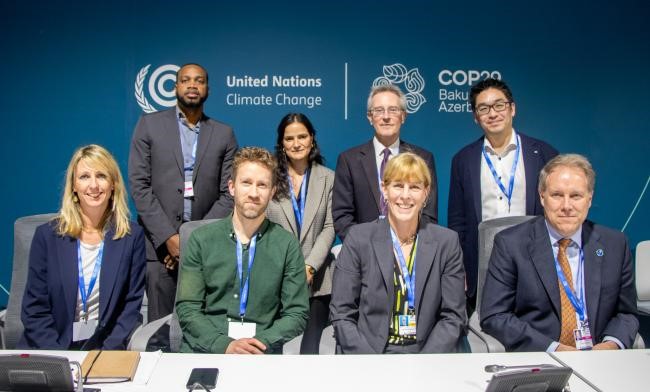
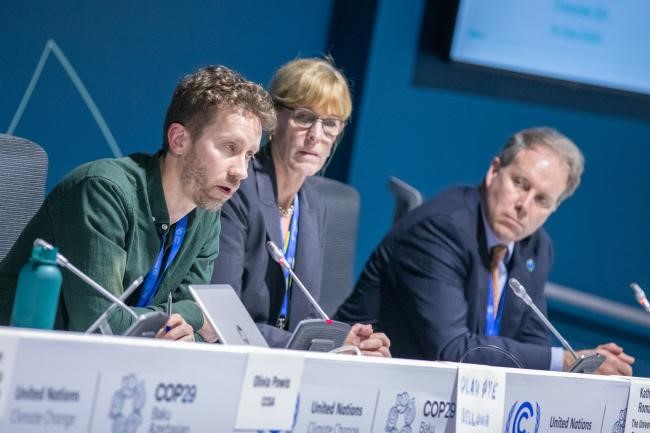

To read more about this event, click here.
November 18–21, 2024: At COP 29 in Baku, Azerbaijan, the Gulf Coast Carbon Center with IEAGHG, Carbon Capture & Storage Association (CCSA), and the International CCS Knowledge Centre hosted an exhibit booth (number 27) about Carbon Capture and Storage (CCS). Click here to read the information and links that were shared at this COP 29 exhibit booth. Katherine Romanak (GCCC), Tim Dixon (IEAGHG), Olivia Powis (CCSA), and James Fann (CCS Knowledge Centre) spent time talking about CCS and sharing resources at the booth. Special thanks to Dolores van der Kolk for creating the poster booth materials.
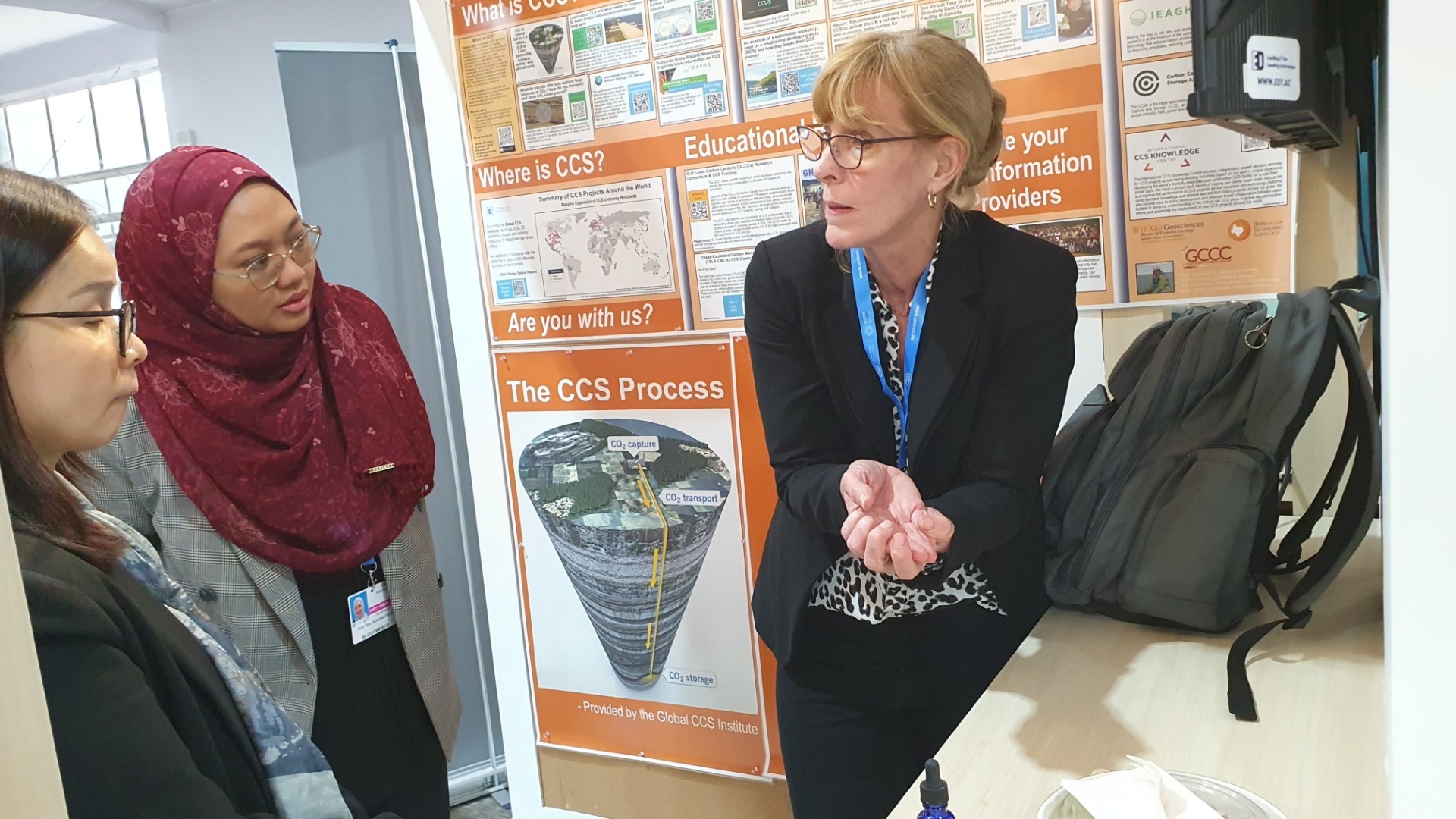
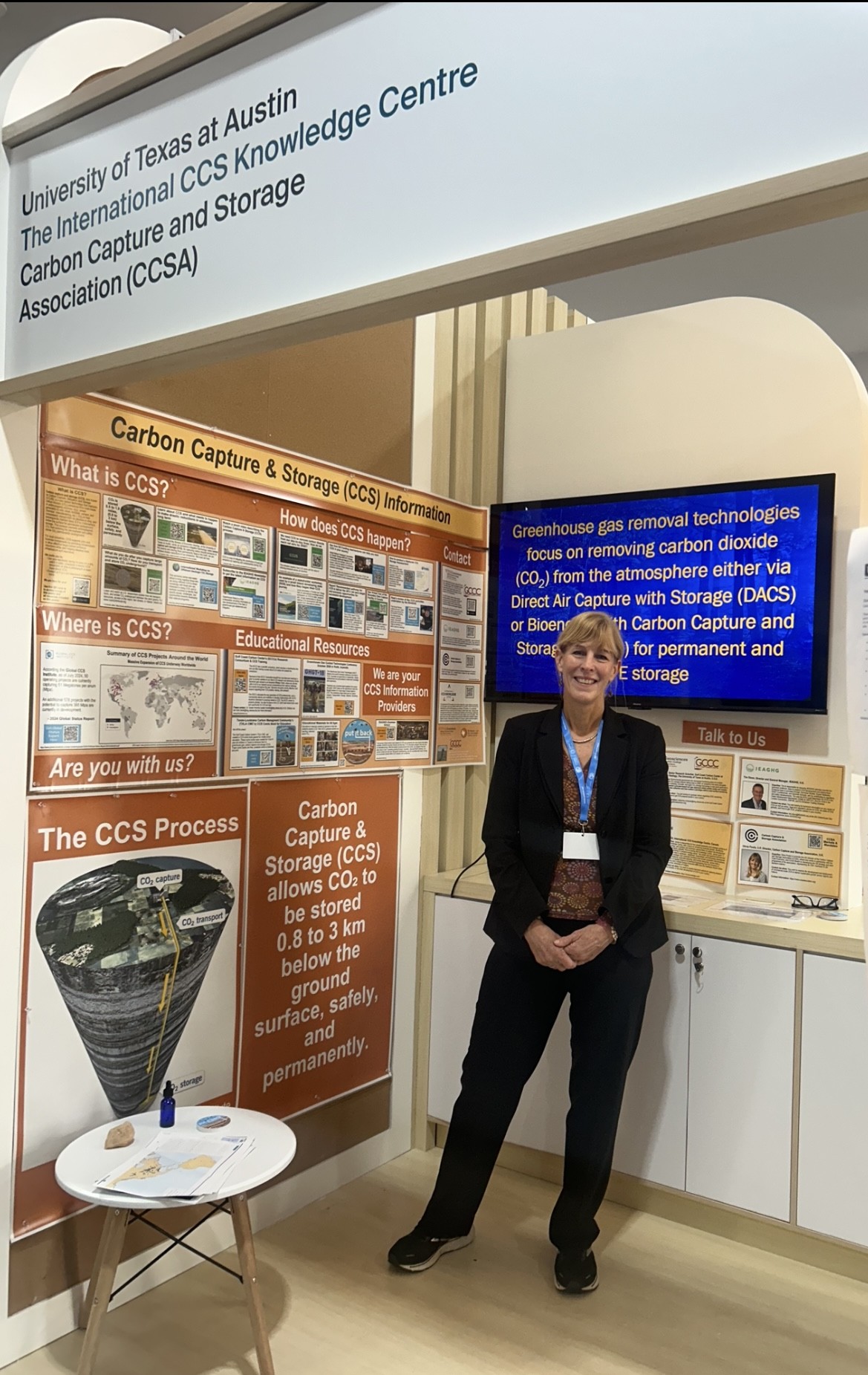
November 18, 2024: At COP29 in Baku, Azerbaijan, Katherine Romanak participated in a panel discussion at the China Pavilion entitled, “Experience Sharing on Policies related to Green and Low-Carbon Industries.” She discussed U.S. Policy and the need for incentivizing CCS in the US and in Developing Countries. The panel was moderated by LIANG Xi (Deputy Director, CCUS Professional Committee of Chinese Society for Environmental Sciences/ Professor, Sustainable Transitions in Construction and Infrastructure at University College London/ Secretary General, UK-China [Guangdong] CCUS Centre) and panelists included:
- MA Jinfeng, Professor, National & Local Joint Engineering Research Center of Carbon Capture and Storage Technology, Northwest University
- YANG Xiaoliang, Country Manager China, Global CCS Institute
- Katherine Romanak, Senior Research Professor, Bureau of Economic Geology, The University of Texas at Austin
- XU Tong, Fellow, Cambridge Centre for Environment, Energy and Natural Resource Governance, University of Cambridge
- ZHANG Dayong, Vice Secretary General, China Association for the Promotion of Industrial Development
- WANG Lele, Director, Industrial Research Department of Biomass Energy Branch, China Industrial Development Promotion Association
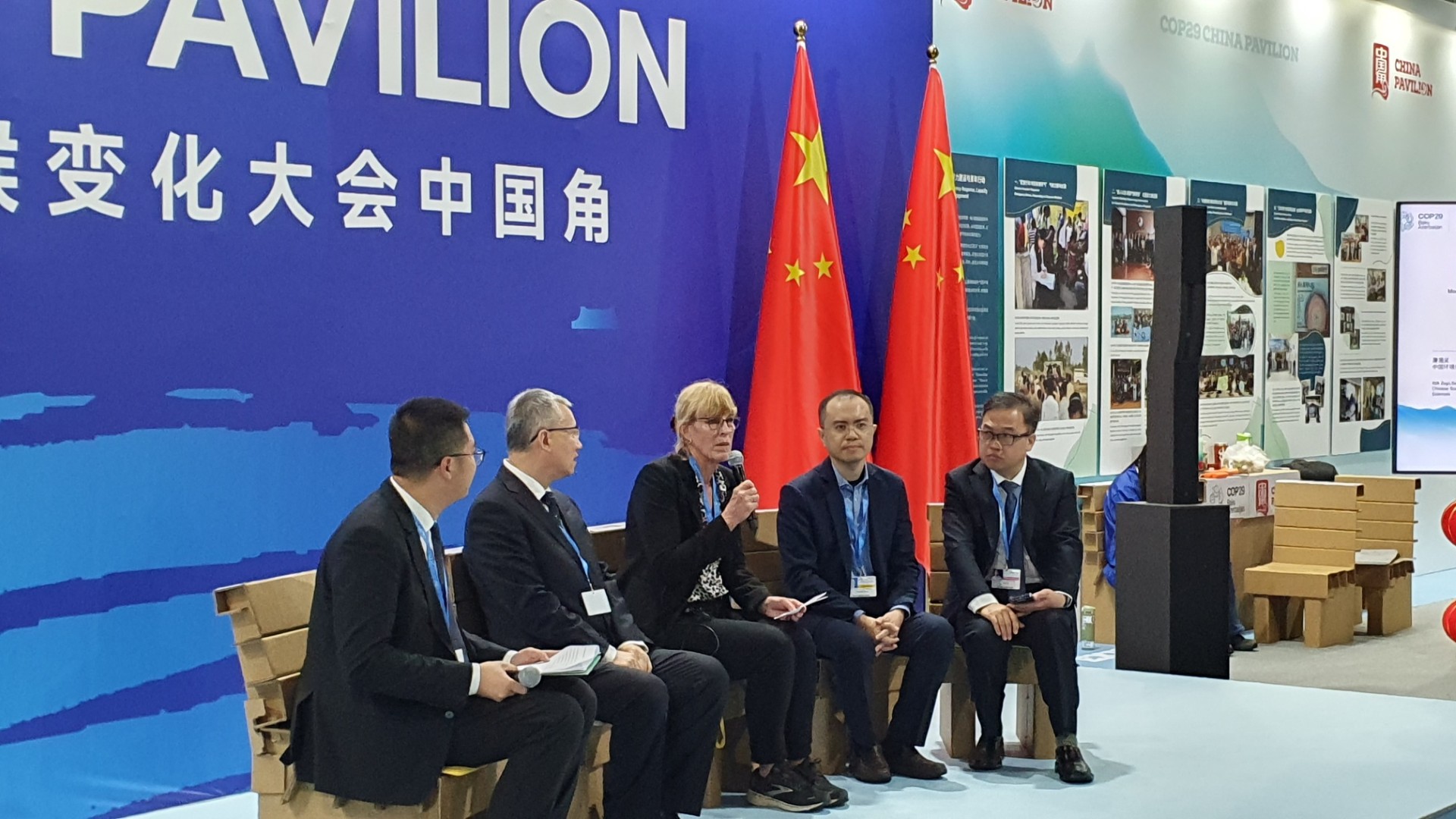
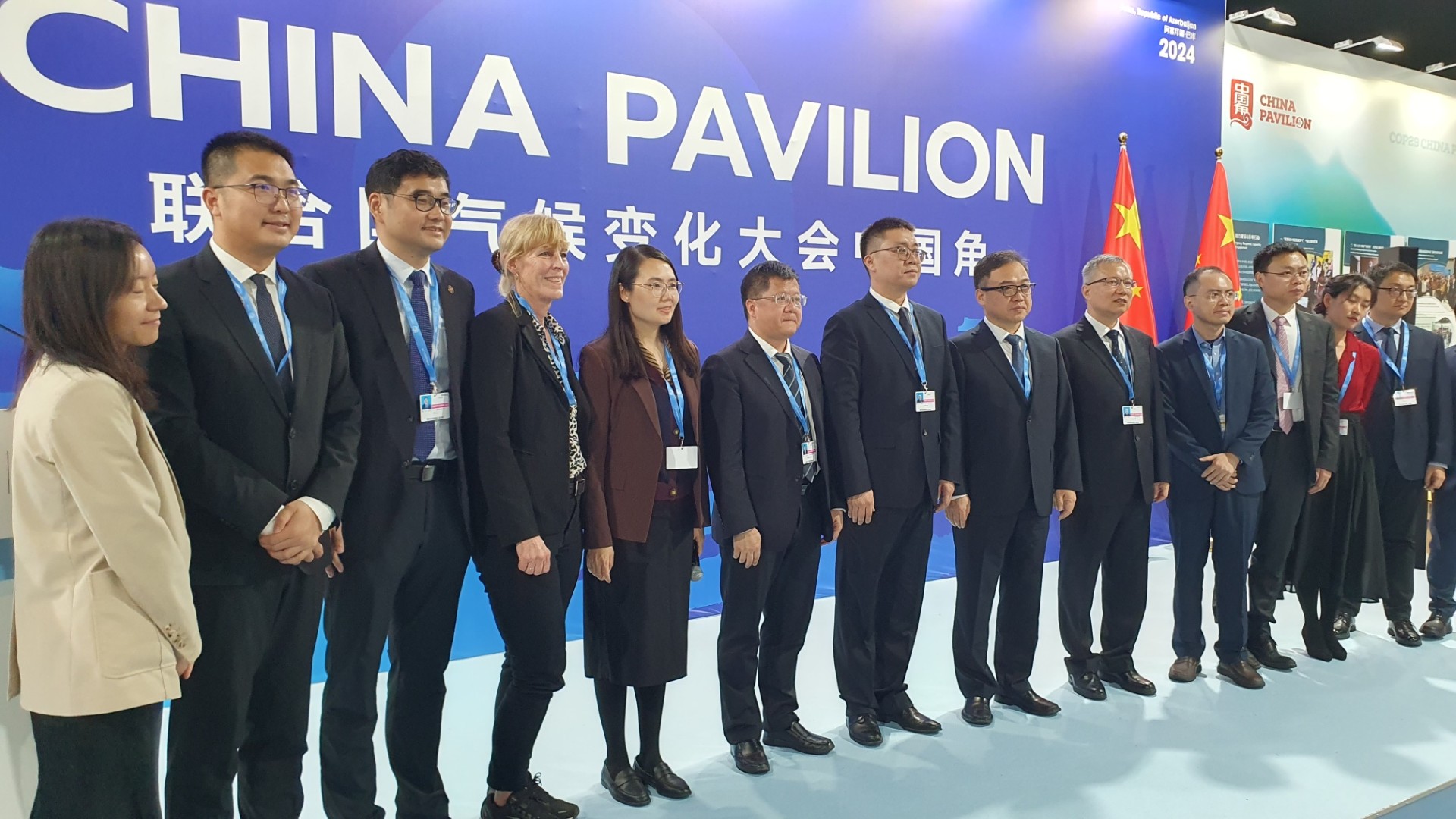
November 15, 2024: At the GCCC's weekly group meeting, Professor Jonathan Ajo-Franklin from Rice University provided our group with a virtual presentation. The presentation entitled, "The Sound of Seafloor CO2 Leakage Detected by DAS: Recent Results from the Lab and Field" was attributed to both Jonathan Ajo-Franklin and Brianna Miranda from Rice University.
November 14 – 16, 2024: Sue Hovorka, Angela Luciano, and Linda McCall attended the Science Teachers Association of Texas Conference for the Advancement of Science Teaching (CAST24) in San Antonio, TX. The group handed out over 300 recently released CCS comic books by the Gulf Coast Carbon Center (GCCC) that were specifically designed using Texas educational standards for 8th graders.
Back in July 2024, the GCCC hosted 3 middle school teachers for a STEM workshop about how to incorporate carbon capture and storage (CCS) concepts into STEM education while also providing teachers with the latest information about CCS developments in Texas. For the Carbon-not Ambassador Program, organized by the Texas-Louisiana Carbon Management Community, Dr. Cynthia L Hopkins from Corpus Christi Independent School District (ISD), Julia Dolive from Fort Bend ISD, and Stephanie Hurst from Cleveland ISD were selected. These Master Teachers worked with GCCC Researchers to create CCS curricula and resources suited for 7th and 8th graders based on Texas learning standards (Texas Essential Knowledge and Skills, known as TEKS). For more information, check out: www.put-it-back.org
- For the duration of the conference, the Bureau of Economic Geology, with support from GCCC Researchers, hosted a booth to distribute resources and awesome prizes to help boost STEM education.
- November 14 at 8 am – Dr. Cynthia L Hopkins and Stephanie Hurst hosted a workshop for science teachers about CCS-related, STEM lessons that are tied to the new TEKS learning standards that were created from our July workshop.
- November 16 at 9:30 am – The Bureau of Economic Geology participated in the TESTA Share-a-thon to spread awareness about lessons, demonstrations, and walk away with resources to learn more.
November 11, 2024: In exciting news, the Jackson School of Geosciences wrote an article about outreach facilitated by our new program, known as the Texas-Louisiana Carbon Management Community. Special thanks to our middle school teachers Cynthia Hopkins, Julia Dove, and Stephane Hurst for being our first Carbon-not Ambassadors! This JSG article was picked up by yahoo news and newsbreak.com.

November 7, 2024: Katherine Romanak gave a keynote presentation at the 9th International VDZ Congress in Dusseldorf Germany, a forum for the worldwide exchange on the key topics of cement process technology and the decarbonization of the entire value chain of cement and concrete. Her talk was on the “Role of CCUS.” For those unfamiliar, VDZ stands for Verein Deutscher Zementwerke (VDZ), which is the German Cement Works Association.

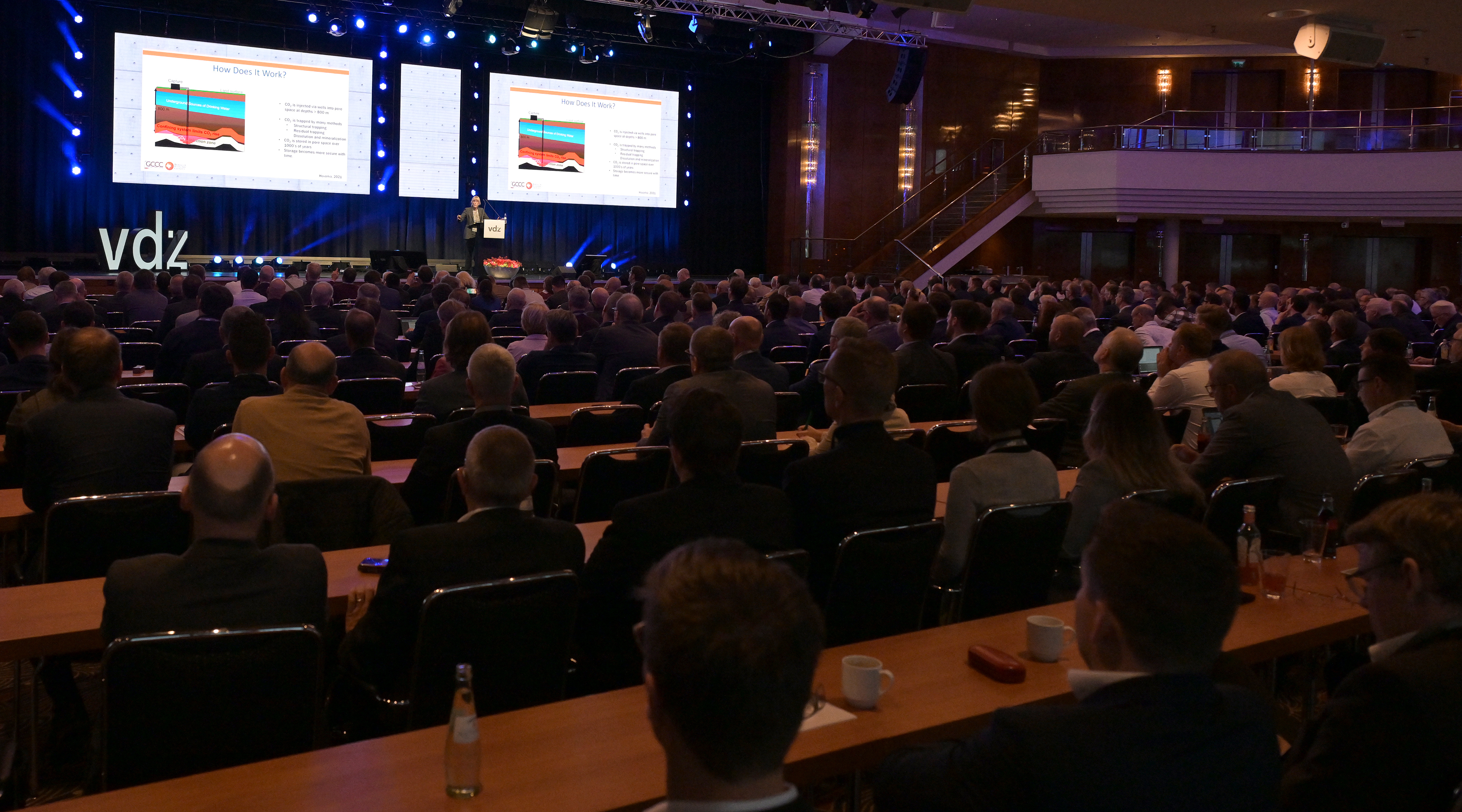

November 1, 2024: We had a special visit from Franz Hiebert (Independent Advisor, Investor, Energy Transition & Carbon Storage) who joined our GCCC weekly meeting to discuss observations and great take-a-ways from GHGT-17 held in Calgary between October 21–25, 2024. In addition, we celebrated our postdoctoral researcher Dr. Zhicheng (William) Wang’s last day as he moves to Dallas, TX to work as a Reservoir Characterization Engineer with Aethon Energy. Congratulations, William!
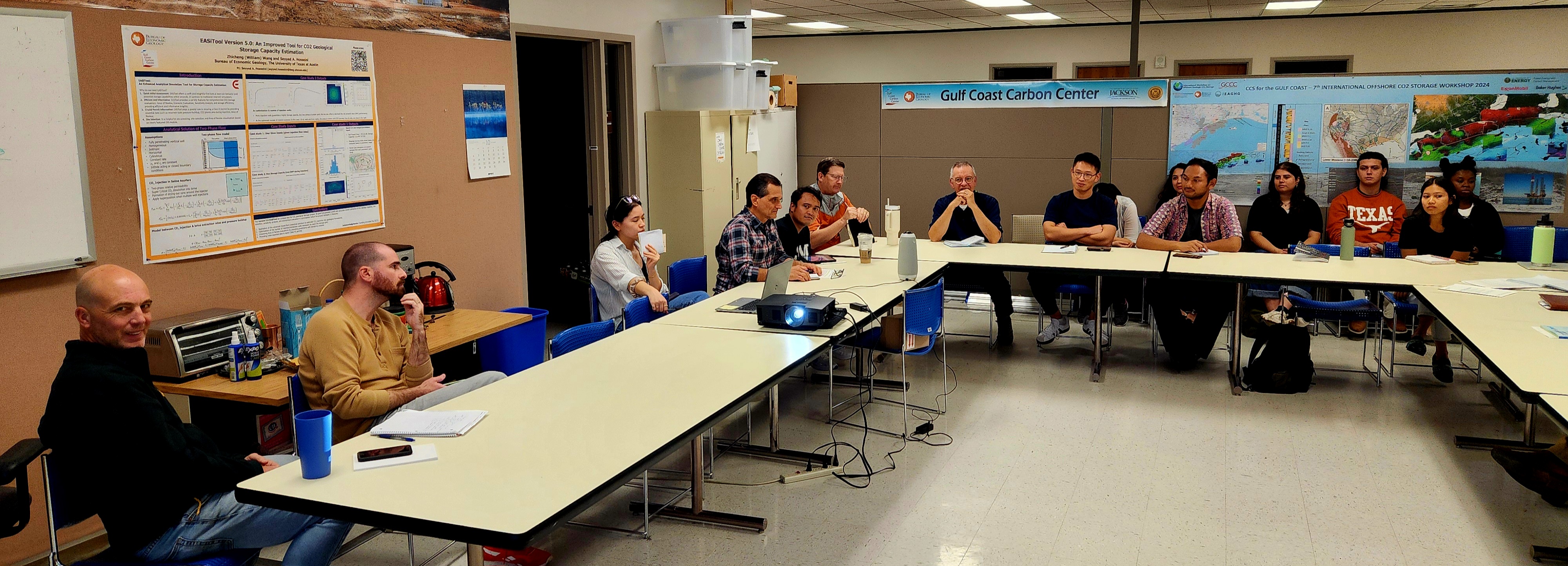
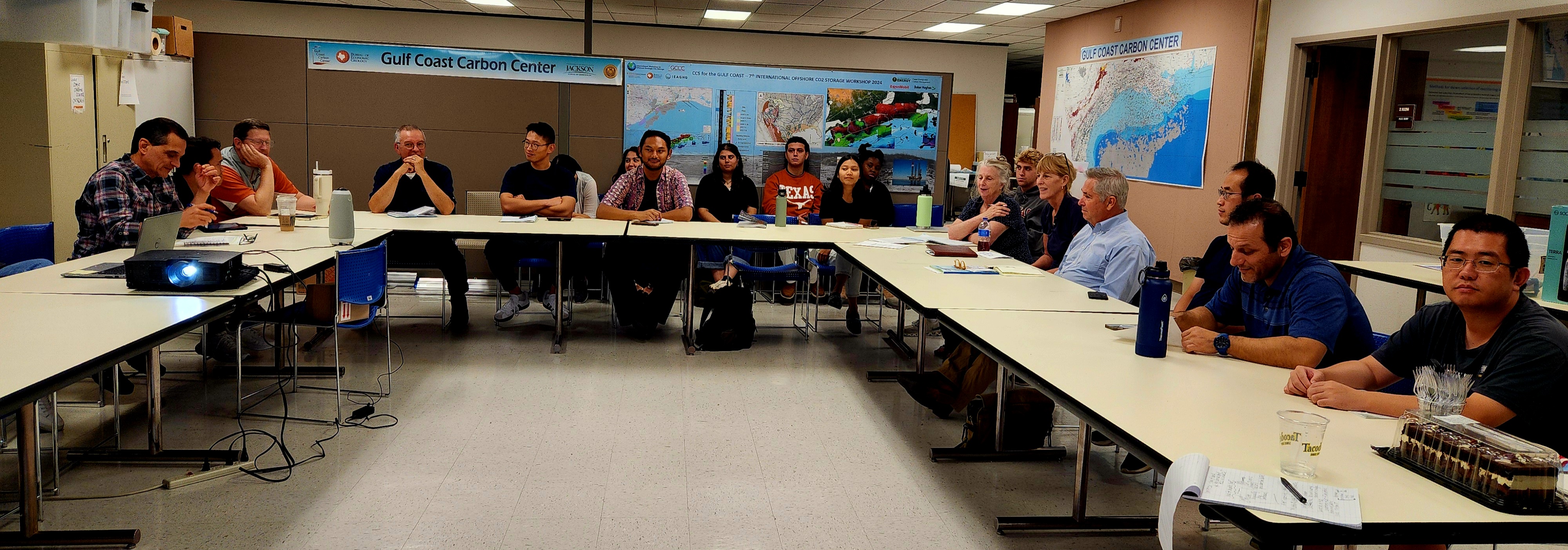
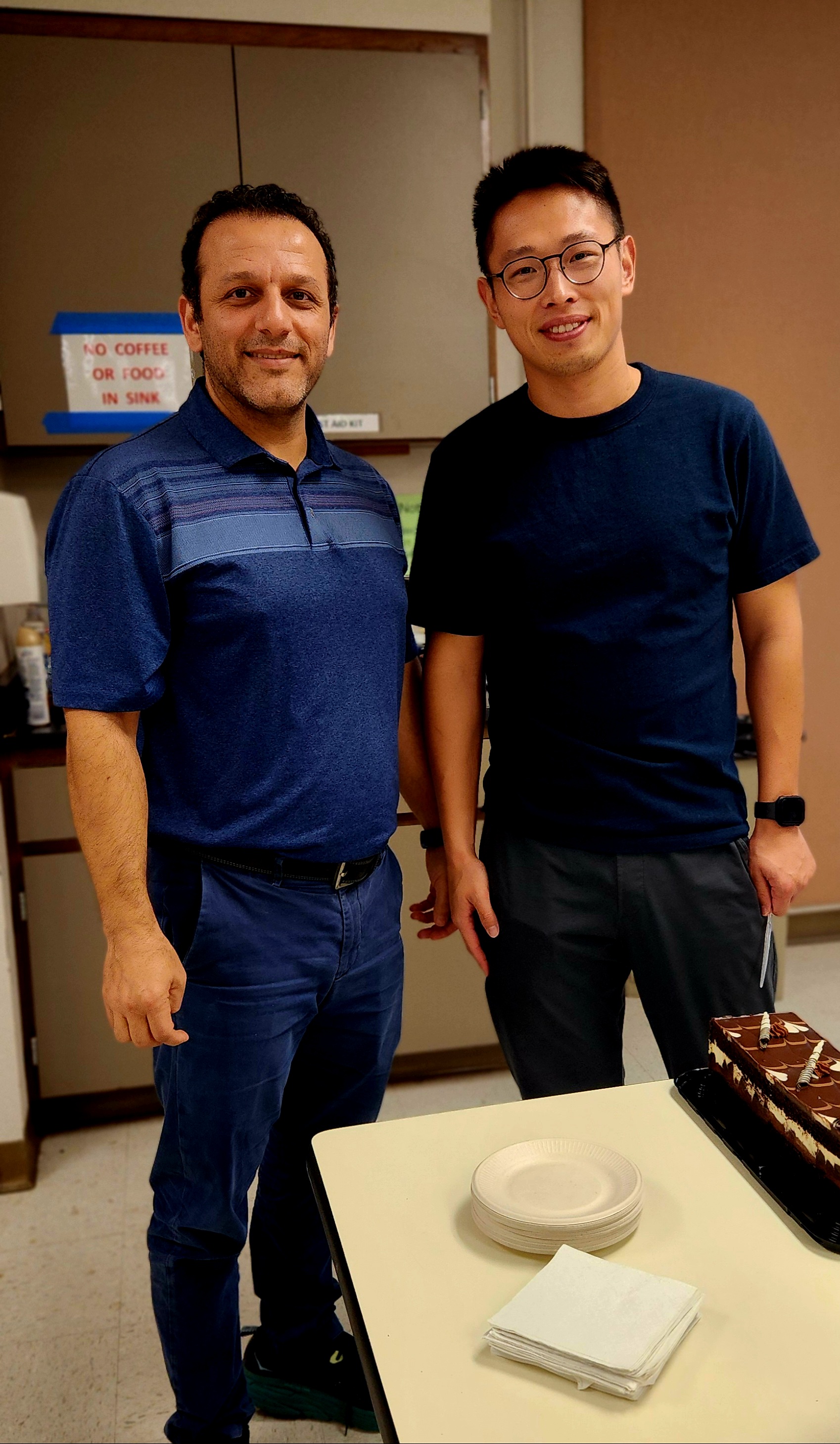
October 29, 2024: As part of the Bureau of Economic Geology’s Seminar Series, Katherine Romanak provided a presentation entitled, “Carbon Capture and Storage (CCS) and Wider Society.” Watch this presentation here:
October 21–25, 2024: Representatives from the Gulf Coast Carbon Center have 15 presentations at the 17th Greenhouse Gas Control Technology Conference (GHGT-17) held in Calgary, Alberta, Canada this week. Several projects will be presented, but GCCC presenters include: Sue Hovorka, Hailun Ni, Katherine Romanak, Alex Bump, Tip Meckel, and Seyyed Hosseini.
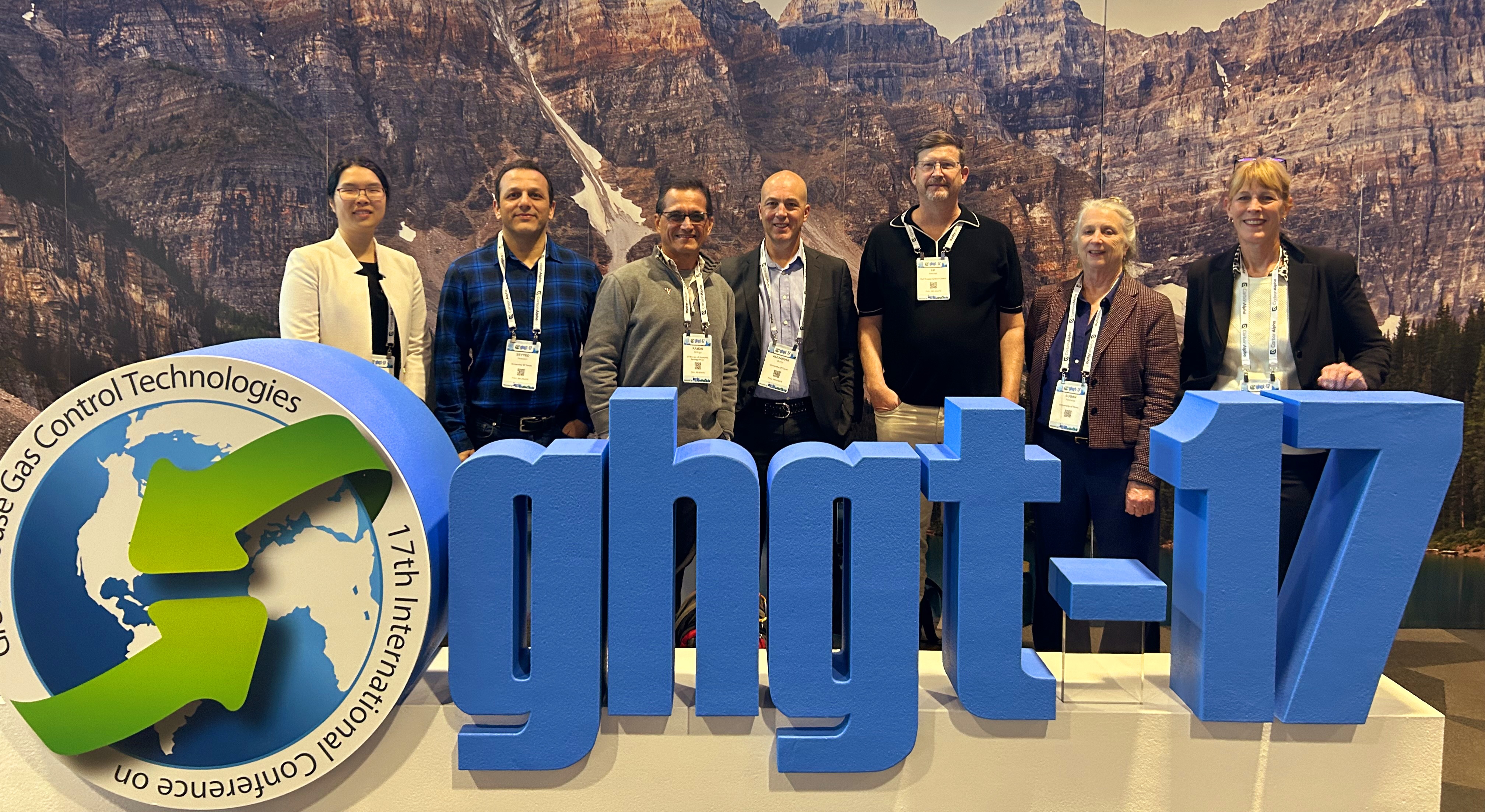
Our group chaired several sessions: Katherine Romanak chaired a session on Near Surface Monitoring, Sue Hovorka chaired sessions on Microseismic Monitoring & Optimizing Sparse Seismic Monitoring, Tip Meckel chaired a session on Seismic Monitoring Over Life of a Project, and Ramón Gil-Egui chaired the Life Cycle Assessment session. Click here to see GCCC presentations with days, times, and locations.
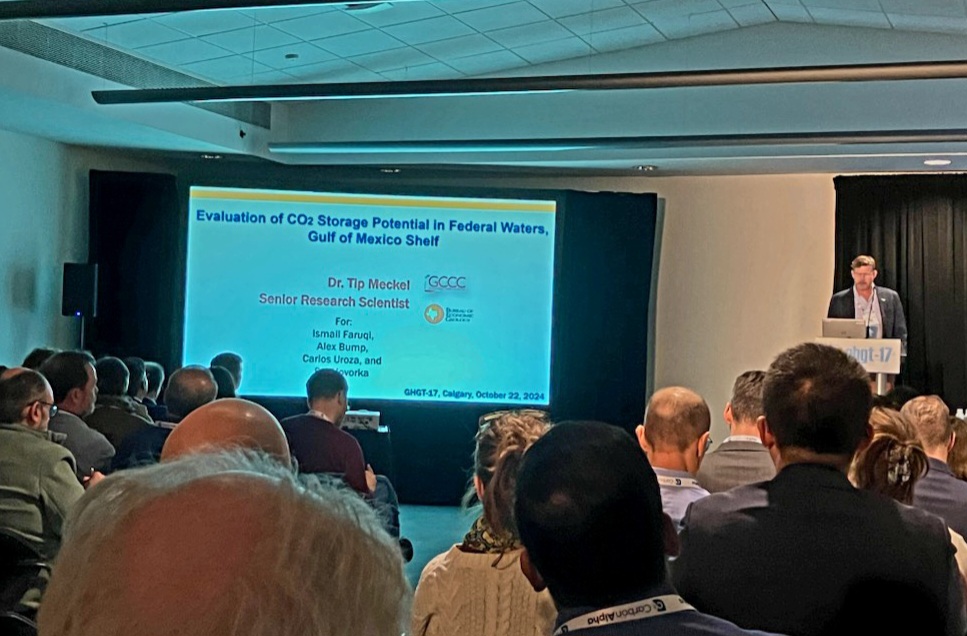


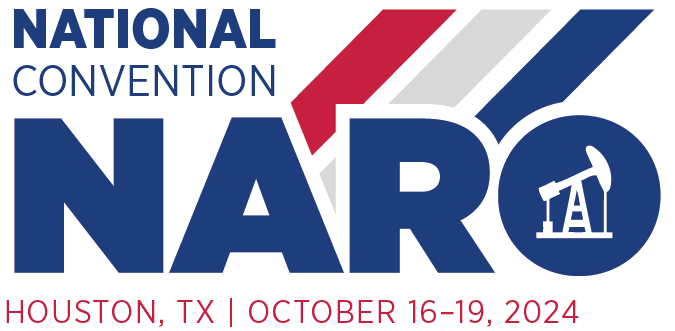
October 18, 2024: Sue Hovorka presented “Carbon Capture and Storage - Update on New Uses of Subsurface Resources” at the National Association of Royalty Owners (NARO) National Convention in Houston, TX.
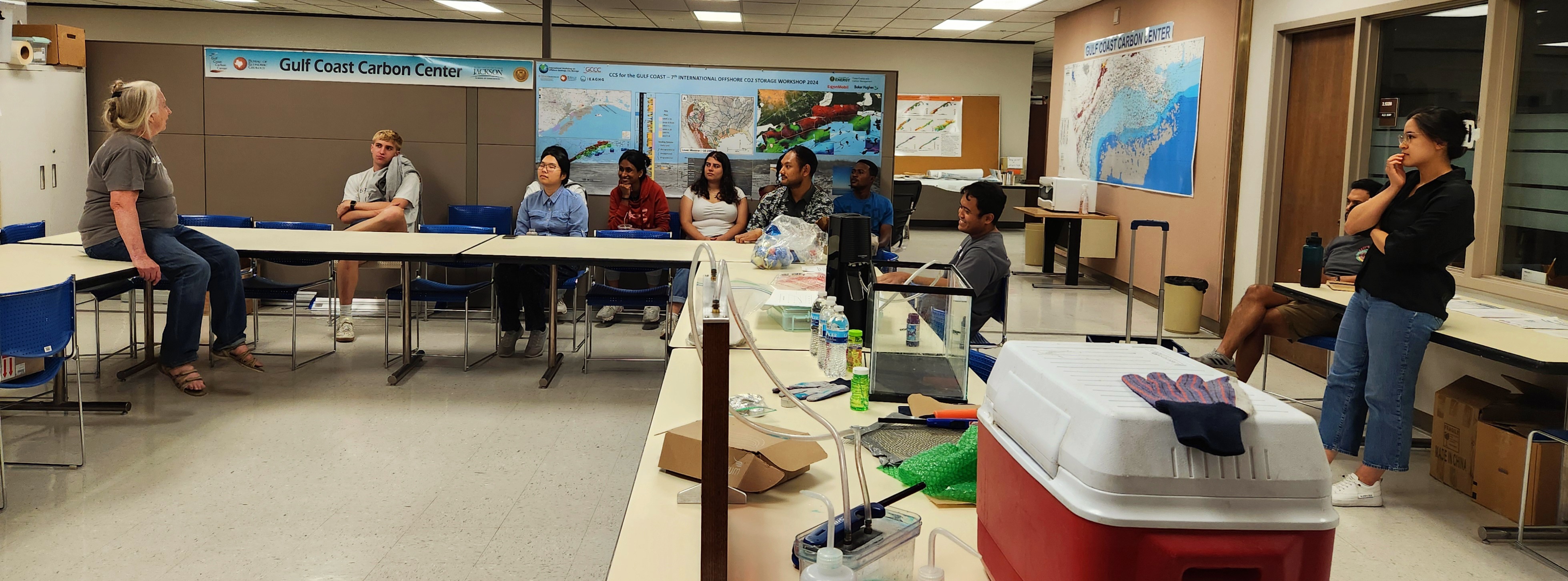
October 11, 2024: At our weekly GCCC meeting this week, our current GCCC Research Assistants were provided with the GCCC’s outreach training to help teach people and children about carbon dioxide and carbon capture and storage (CCS). Thanks to Sue Hovorka for providing great demonstrations.
October 10, 2024: “ExxonMobil is leasing more than a quarter million acres of subsea land off the coasts of Galveston, Chambers, and Jefferson Counties to trap and store carbon dioxide permanently. Funds from the lease will benefit Texas’ Permanent School Fund.” The GCCC’s Researcher Tip Meckel was interviewed about this historic milestone, click here to read more.
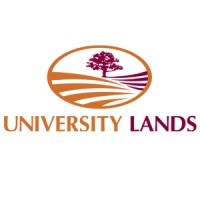
October 9, 2024: Ramón Treviño presented an overview about the GCCC and our CCS research, past, present and future to two visitors from Texas University Lands. “University Lands (UL) manages the surface and mineral interests of 2.1 million acres of land across nineteen counties in West Texas for the benefit of the Permanent University Fund (PUF). The PUF is one of the largest university endowments in the United States and benefits more than twenty educational and health institutions across both The University of Texas System and Texas A&M University System.” University Lands is interested in emerging energy systems (e.g., hydrogen, CCS geothermal, etc.) and how the UL system and the PUF might benefit from them in the future.
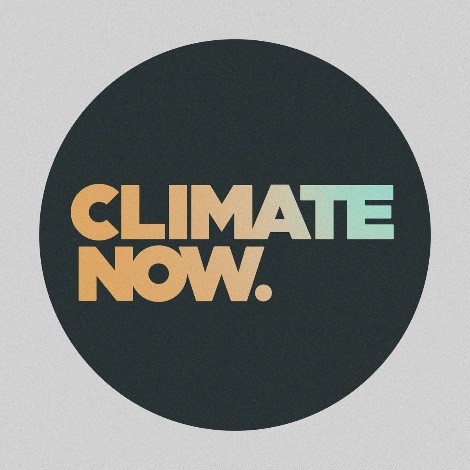
October 8–10, 2024: The GCCC’s Sue Hovorka, Angela Luciano, and Ramón Gil-Egui attended Climate Now’s public information meetings in the cities of Beaumont, Pasadena, and Texas City in Texas. These meetings included open house events, presentations, and panels on various CCS topics. Sue Hovorka provided 10-minute introductions about CCS Management 101 & Why It Matters Locally, and the Gulf Coast Carbon Center also provided an interactive booth with demonstrations during the open house events. Other presenters and panelists included representatives from Climate Now, DOE, EPA, Lamar University, Pipeline and Hazardous Materials Safety Administration (PHMSA), Laborers’ International Union of North America (LiUNA), City Officials, local community leaders, and the Texas Campaign for the Environment.


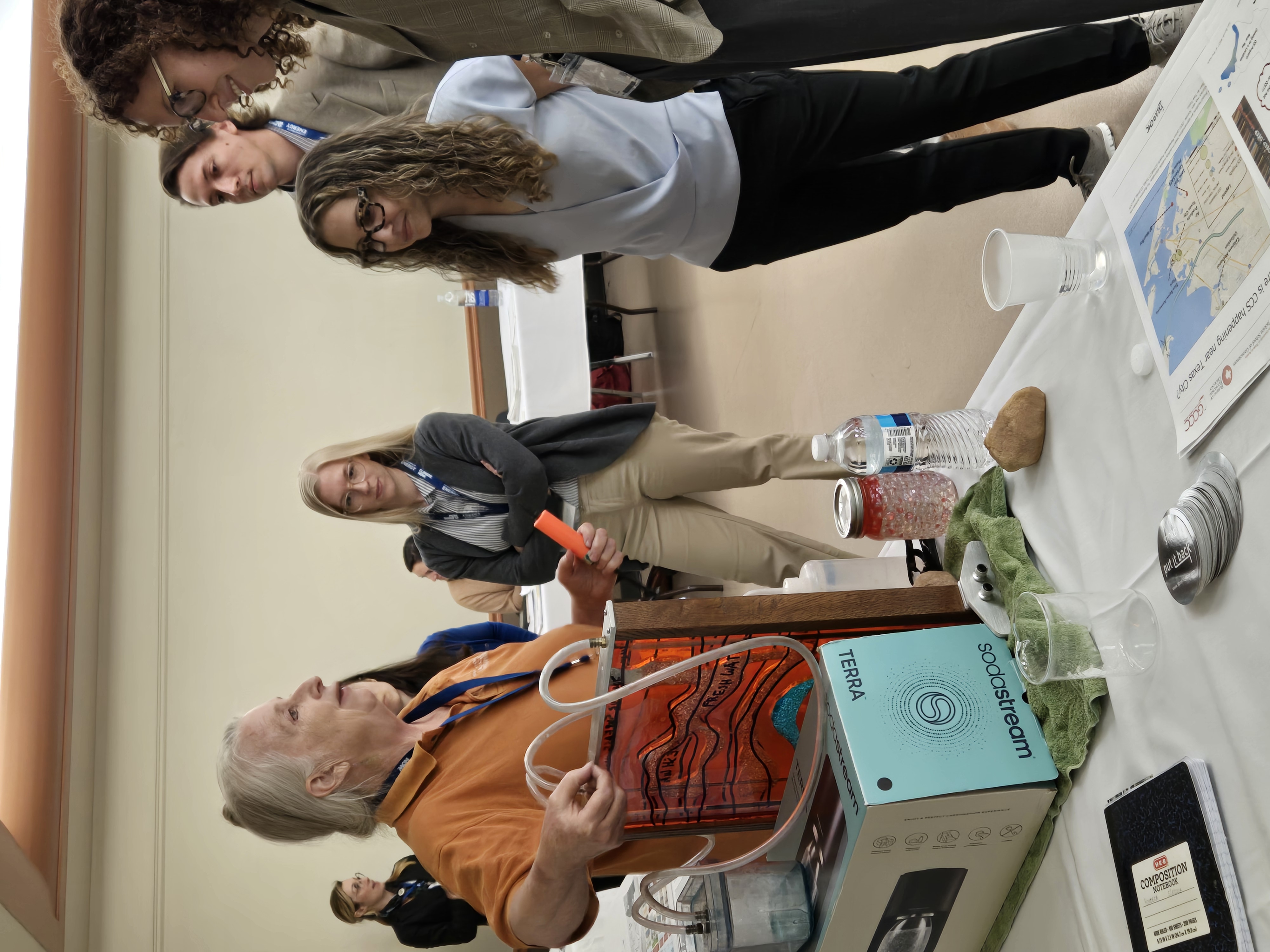
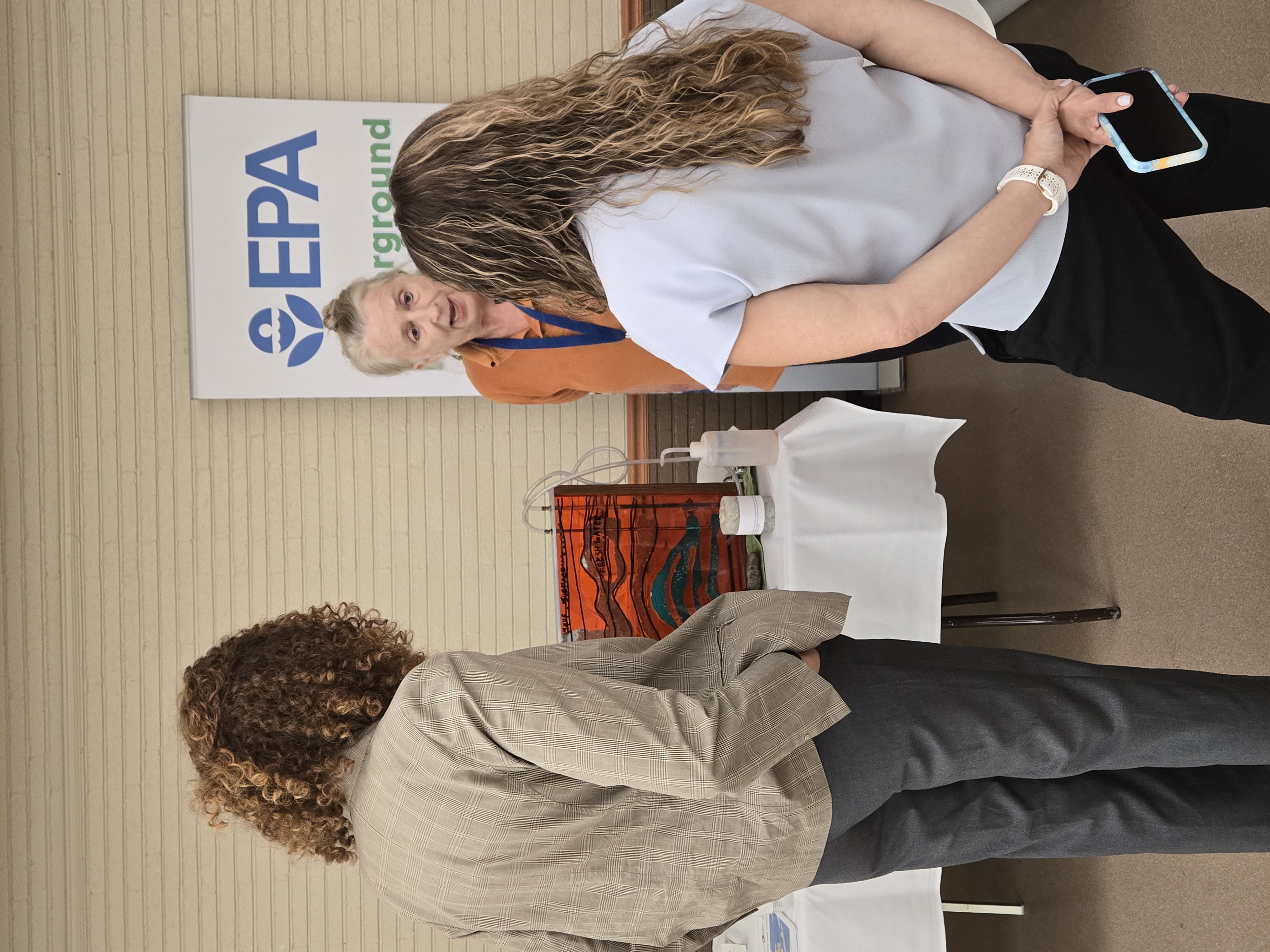
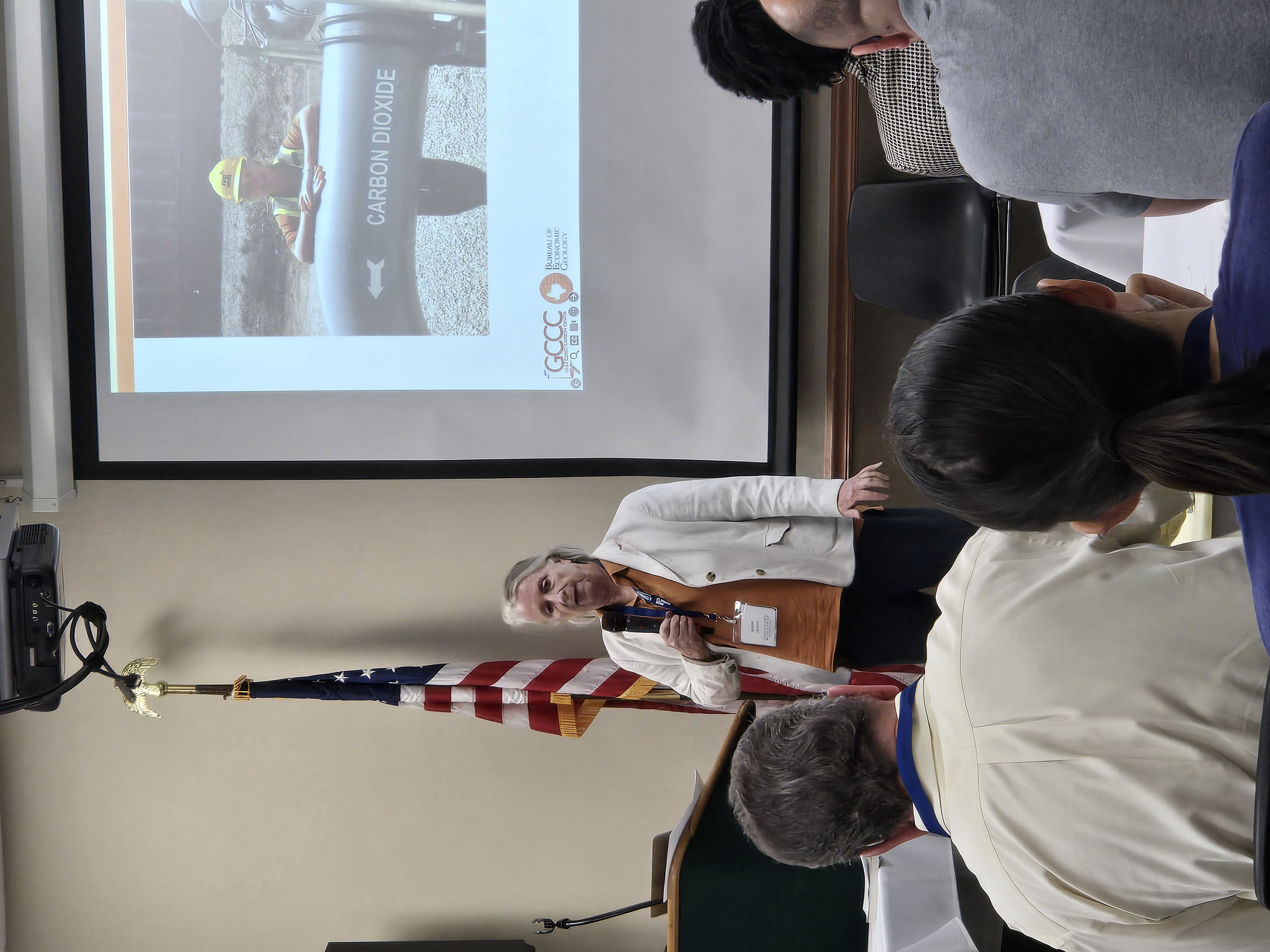
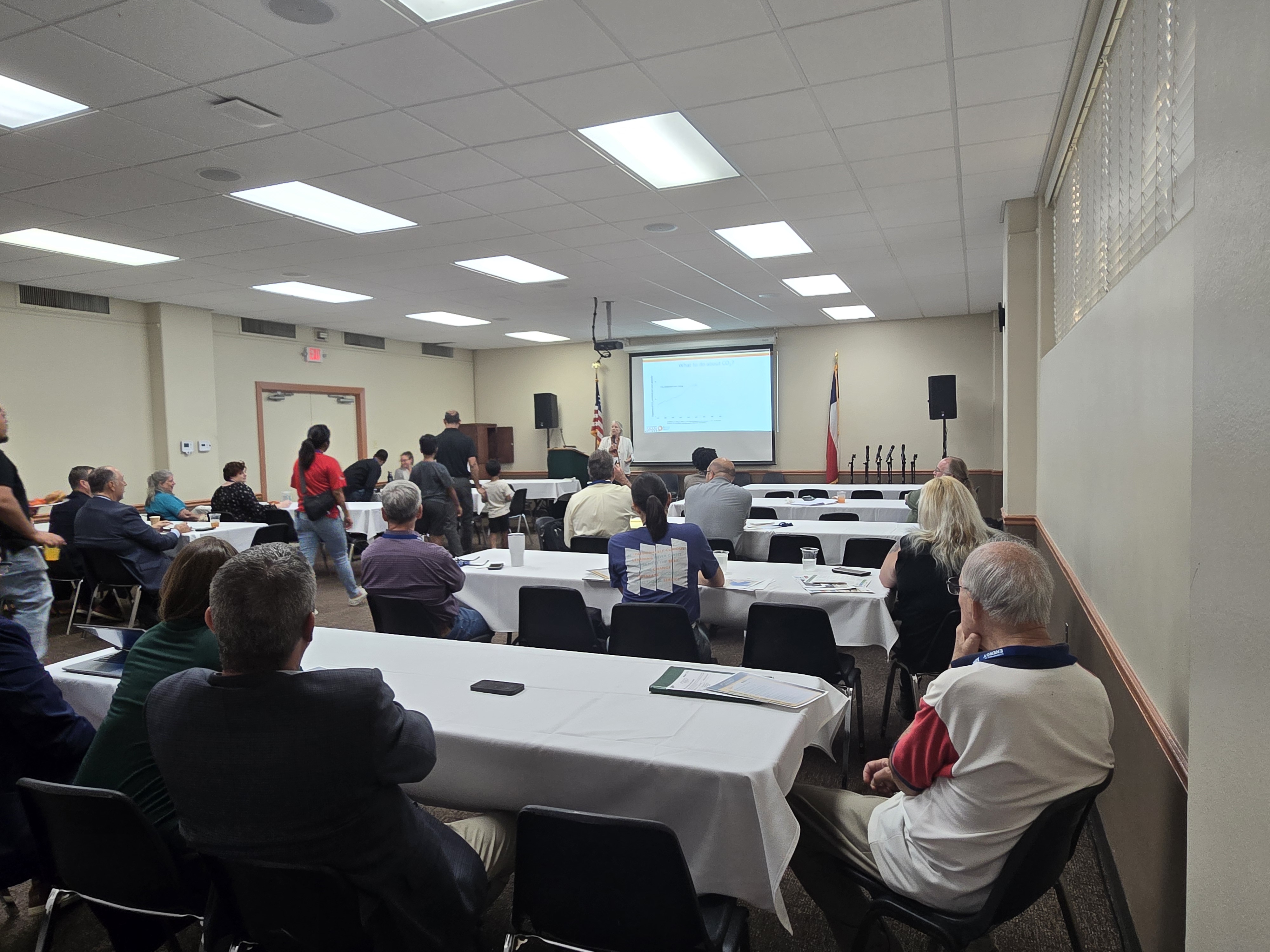

October 1, 2024: Congratulations to the Bureau of Economic Geology’s Jerry Jensen and Carlos Uroza for their manuscript entitled, “Testing and Application of a Probe Permeameter in the Lower Wilcox Formation,” released in Petrophysics from The Society of Petrophysicists and Well Log Analysts (SPWLA) Journal.
September 30, 2024: The GCCC’s PI, Susan Hovorka, presented on “Storage as part of CCS” to a student group studying “Negative Emissions Technology” at UT’s Engineering Department. Students are working on direct air capture (DAC) and biologic pathways to removals.
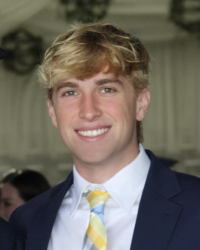
September 27, 2024: The GCCC welcomes Cecil Armstrong as an undergraduate research assistant who will be working with Angela Luciano and Sue Hovorka on Texas-Louisiana Carbon Management Community’s outreach, teaching materials, and miscellaneous preparation for the GCCC’s activities. Cecil is currently pursuing a Bachelor of Science in Environmental Science at the Jackson School of Geosciences with a business minor in Energy Management. Cecil is interested exploring the field of carbon markets and would like to pursue a career in low-carbon energy.
September 26, 2024: Susan Hovorka traveled to Leesville within the Vernon Parish, LA to discuss the geologic aspects of storage with a community focus group. This area is in development as a site to host future large-scale storage in a project lead by Capture Point. Participants were very interested in details of how storage sites are characterized, modeled, and monitored.
September 25, 2024: As part of the Regional Initiative for Technical Assistance Partnerships (RITAP) to Advance Deployment of Basin-Scale Carbon Transport and Storage and Community Engagement, the U.S. Department of Energy (DOE) has selected a UT-led consortium for a $5 million RITAP grant.
The consortium’s goal will be to “accelerate the equitable and environmentally responsible deployment of geologic storage-based carbon management in the northwestern Gulf of Mexico Basin region (onshore and offshore) by providing unbiased, factual, technical assistance to regulators, project developers and communities weighing the benefits and risks of the new carbon geosequestration industry, an industry, which may have significant positive impact on communities across the project region, particularly in areas experiencing the economic consequences of declining petroleum production.”
The effort, officially called Project GuMBO - Gulf of Mexico Basin Opportunities, is led by the GCCC Principal Investigators, Alex Bump, Seyyed Abolfazl Hosseini and Katherine Romanak. For this 3-year project, the Gulf Coast Carbon Center (GCCC) will partner up with representatives from the HARC | Houston Advanced Research Center, Louisiana State University, Texas A&M University's Energy Experiment Center, Texas A&M University-Kingsville, Los Alamos National Laboratory and the University of Houston. Congratulations to all! Read more about this in JSG’s news here.
September 23–25, 2024: Postdoctoral Fellow, Zhicheng (William) Wang attended the Society of Petroleum Engineers (SPE) Annual Technical Conference and Exhibition (ATCE) in New Orleans, LA. At this conference, William presented “Impact of Residual Fluid Composition and Injected Gas Purity on the Storage Capacity of the Depleted Shale Oil Reservoirs in the Presence of Diffusion and Sorption” by Khaled Enab and Zhicheng Wang. Read more about this presentation here.

September 23, 2024: The GCCC celebrated the Texas-Louisiana Carbon Management Community’s (TXLA CMC’s) Birthday while the GCCC’s International Fellow, Tim Dixon, was visiting from the U.K. If you would like to subscribe to becoming a member of the TXLA CMC phonebook or network, click here.

September 23, 2024: As everyone prepares for the next SPE-AAPG-SEG CCUS Conference that will be held in Houston, TX between March 3–5, 2025, our researcher Hailun Ni has been featured as part of the conference page advertisement with 3 of her students from Jackson School of Geosciences CCS course held at UT Austin. Hook’em Horns!
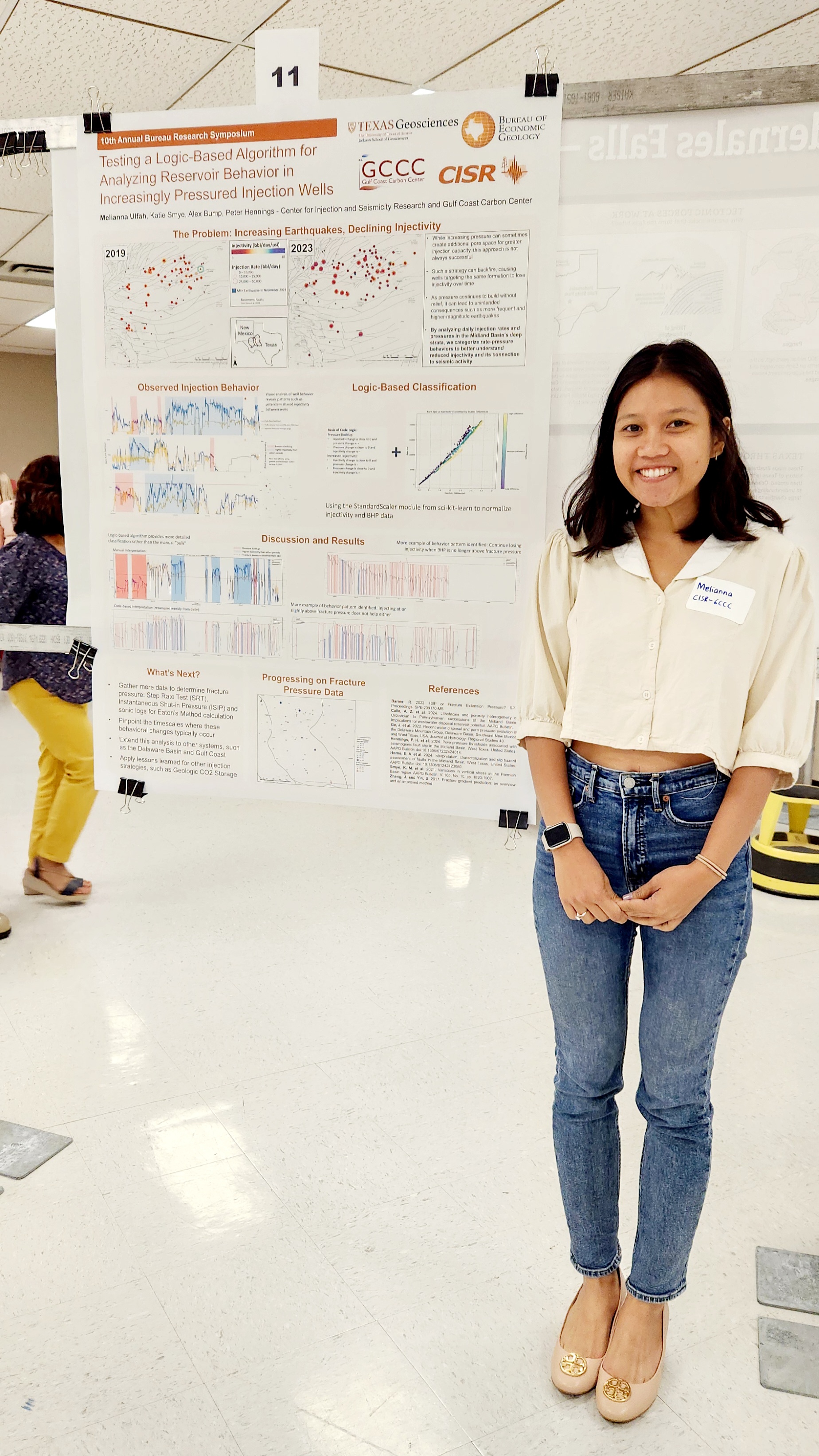
September 20, 2024: The Bureau of Economic Geology held the 10th Annual Bureau Research, which included a session with 13 “Nano Talks” and 2 sessions with 23 posters total. GCCC Scientists had the following presentations:
GCCC Nano Talks
- “Are the fears justified? Observations of Gulf Coast fault seal and predictions for CCS” by Alex Bump
- “Is your seismic monitoring of CO2 plume effective?” by Shuvajit Bhattacharya
GCCC Posters
- “CCS Comic Book Adventures: Designing Science Materials for Middle School Education in Texas” by Dolores van der Kolk, Valerie Tran, Francine Mastrangelo, Susan Hovorka, and Angela Luciano
- “Socioeconomic and Environmental Barriers to CO2 Storage Site Selection in the Gulf Coast” – Ramon Gil-Egui
- “Testing a Logic-Based Algorithm for Analyzing Reservoir Behavior in Increasingly Pressured Injection Wells” – Melianna Ulfah
- “Efficient Dimension Reduction of Complex Three-Dimensional CO2 Saturation Using Deep Learning Models” – Hongsheng Wang & Seyyed Hosseini
Congratulations to Dolores and her team for tying with Hassan Dashtian for best poster at the Symposium. Read more about the symposium here.
September 17–19, 2024: Sue Hovorka, Katherine Romanak, Tip Meckel, and Angela Luciano traveled to Port Arthur, Texas to attend the 7th International Workshop on Offshore Geologic Storage about CO2 storage offshore. This event was organized by the Gulf Coast Carbon Center and IEAGHG, hosted by Port Arthur Chamber of Commerce, and held at Lamar State College in Port Arthur. There were ~45 offshore projects highlighted and topics included CO2 stream specifications, shipping, regulatory developments, monitoring for leakage, and discussing the latest CCS news. Over 60 people attended this event in-person, while over 100 attended this meeting online. The meeting was followed by a field trip, led by Tip Meckel, to see key parts of a CCS chain. For more information about past workshops click here.
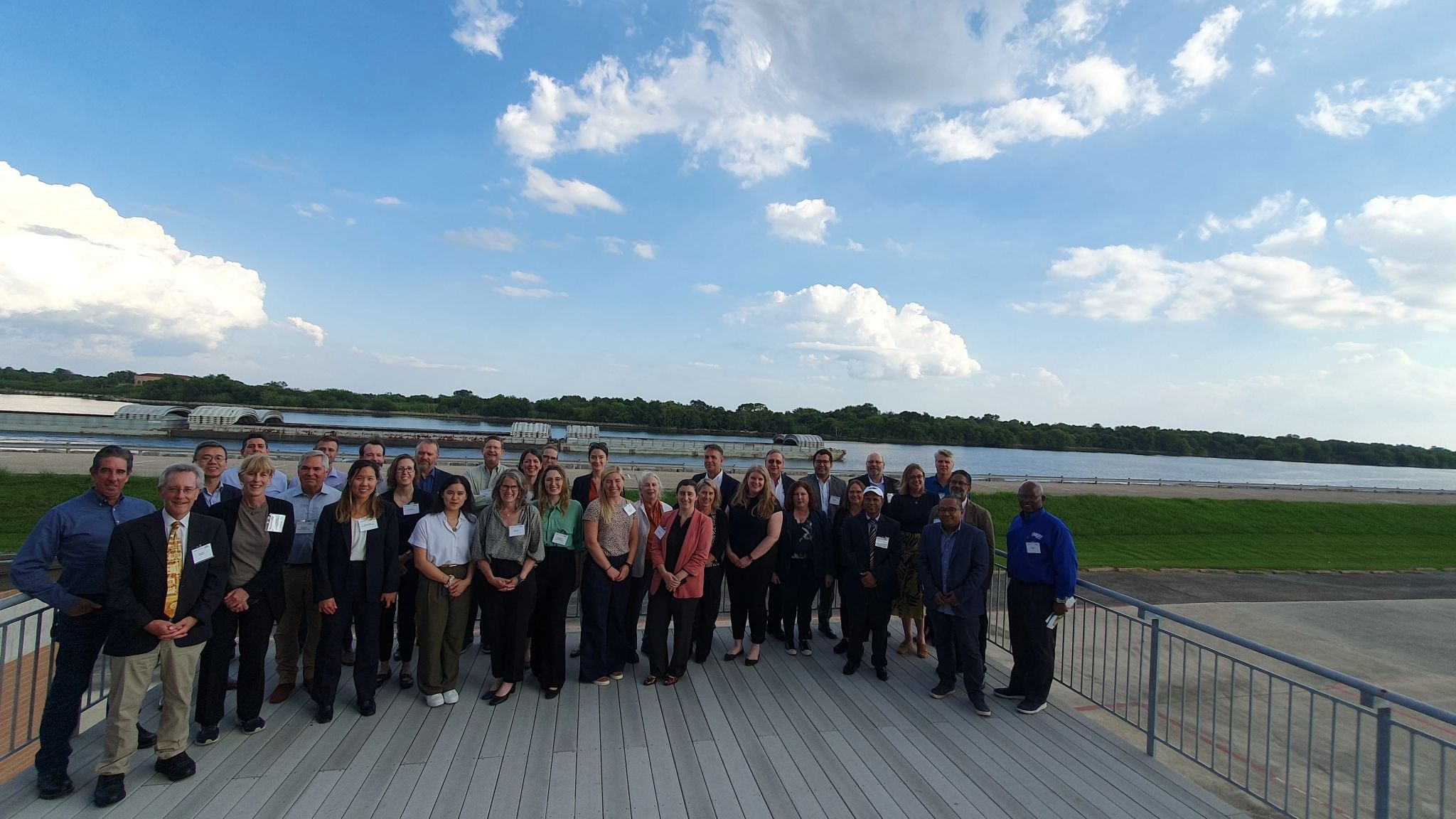
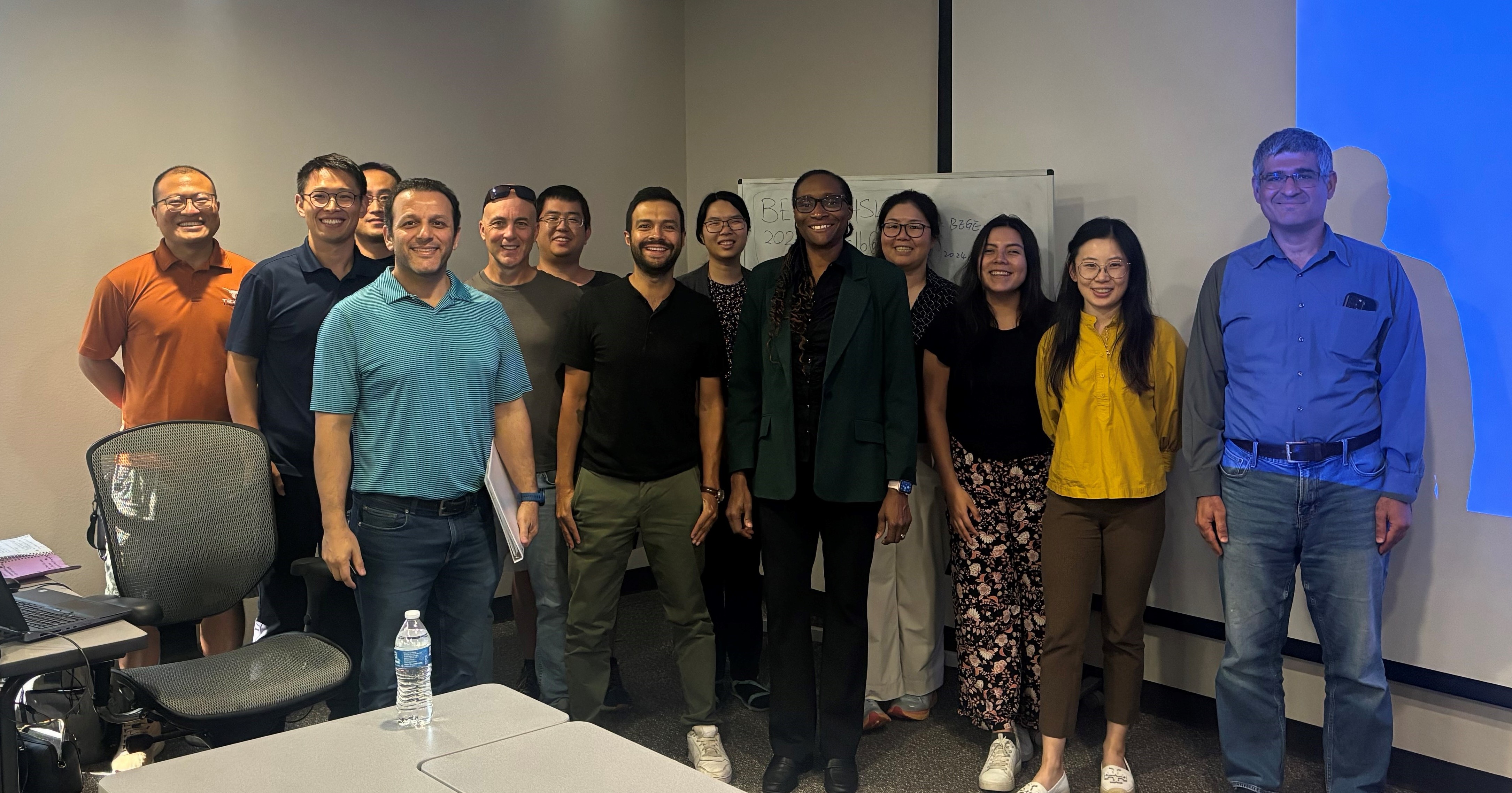
September 17, 2024: For those interested at the Bureau of Economic Geology, Seyyed Hosseini and Zhicheng (William) Wang organized a “Carbon Dioxide Storage Simulation Training” session by Dr. Damilola Ajose-Ogunlana, a Principal Reservoir Engineer from SLB. Eighteen Bureau employees were able to attend this event. The workshop focused on SLB’s Petrel™ and Intersect subsurface software with respect to CCS. The group received an overview about using Intersect software for CO2 storage modeling, and ran scenarios injecting into either saline aquifers or depleted gas reservoirs. They also covered Intersect software’s advanced options about chemical reactions and the Joule-Thompson effect.
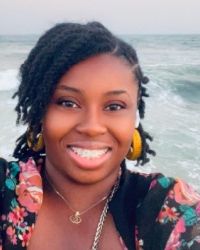
September 15, 2024: The GCCC welcomes Edwina Owusu-Adjapong as a JSG-EER graduate student. Edwina will be supervised by Ramón Gil-Egui, Ramón Treviño, and Sue Hovorka. Edwina’s research will focus on carbon capture and storage (CCS) technologies, infrastructure reuse, and their integration into sustainable energy systems. Edwina previously worked with NineDot Energy, where she gained experience in energy systems and the renewable energy sector. Edwina received a Bachelor’s degree in Energy Resources Engineering from Stanford University. Edwina is proficient in Python, MATLAB, and ArcGIS. She is passionate about bridging the gap between innovative energy solutions and policy frameworks. Edwina embraces collaborative and multidisciplinary approaches to create impactful and sustainable solutions and looks forward to contributing to the global energy transition.
September 11–13, 2024: GCCC Representatives attended and presented at the 3rd Energy Group CCS Symposium: Characterization and Monitoring of Containment held by the Energy Group of the Geological Society of London.
- On Thursday, Sept. 12, 2024, Alex Bump was invited to and presented at the event in person on, “Composite Confining Systems for Permanent CO2 Sequestration”
- On Friday, Sept. 13, 2024, Katherine Romanak was invited and presented virtually on, “Environmental baselines in geological CO2 storage monitoring- what are they really good for?”
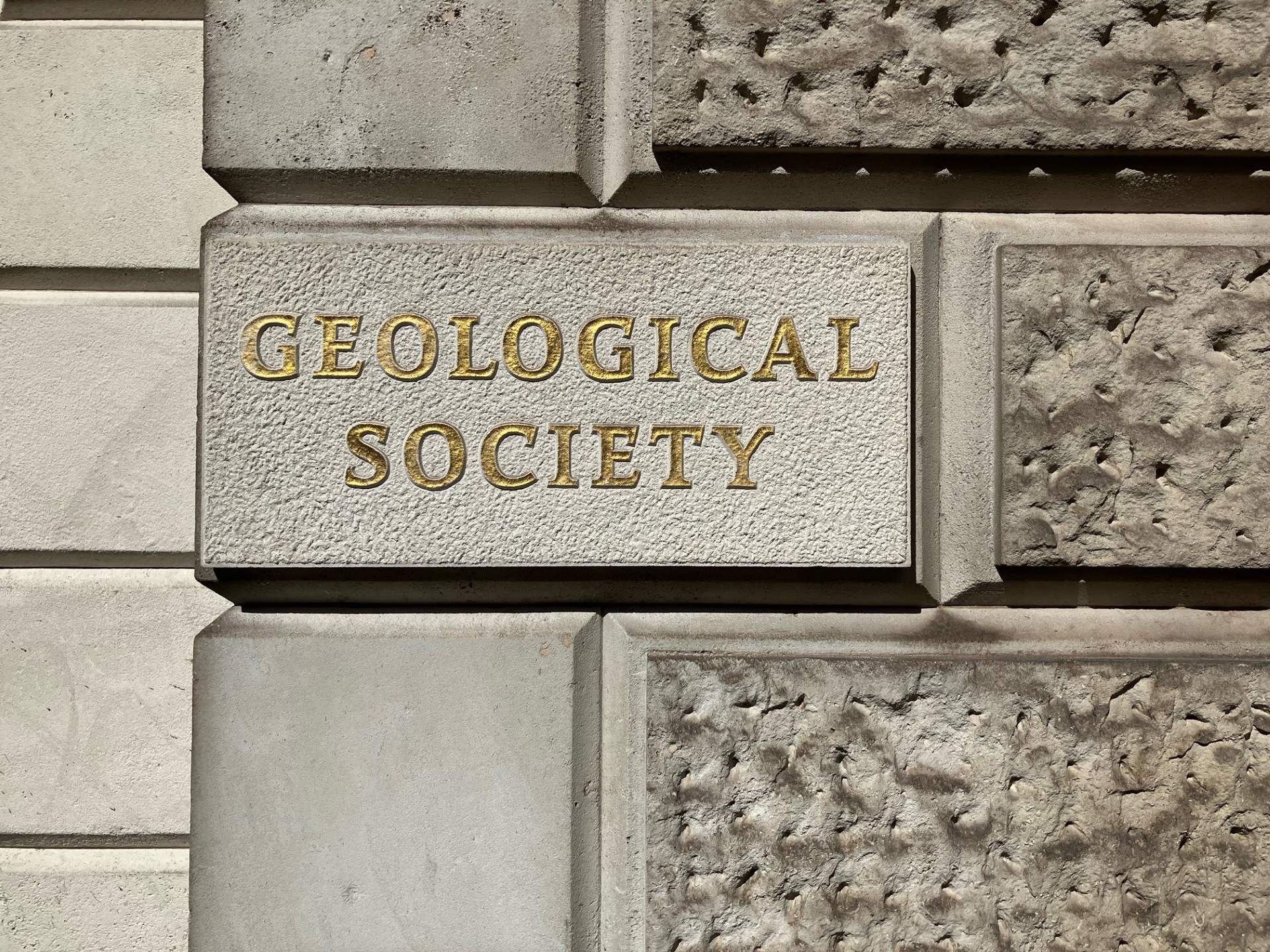
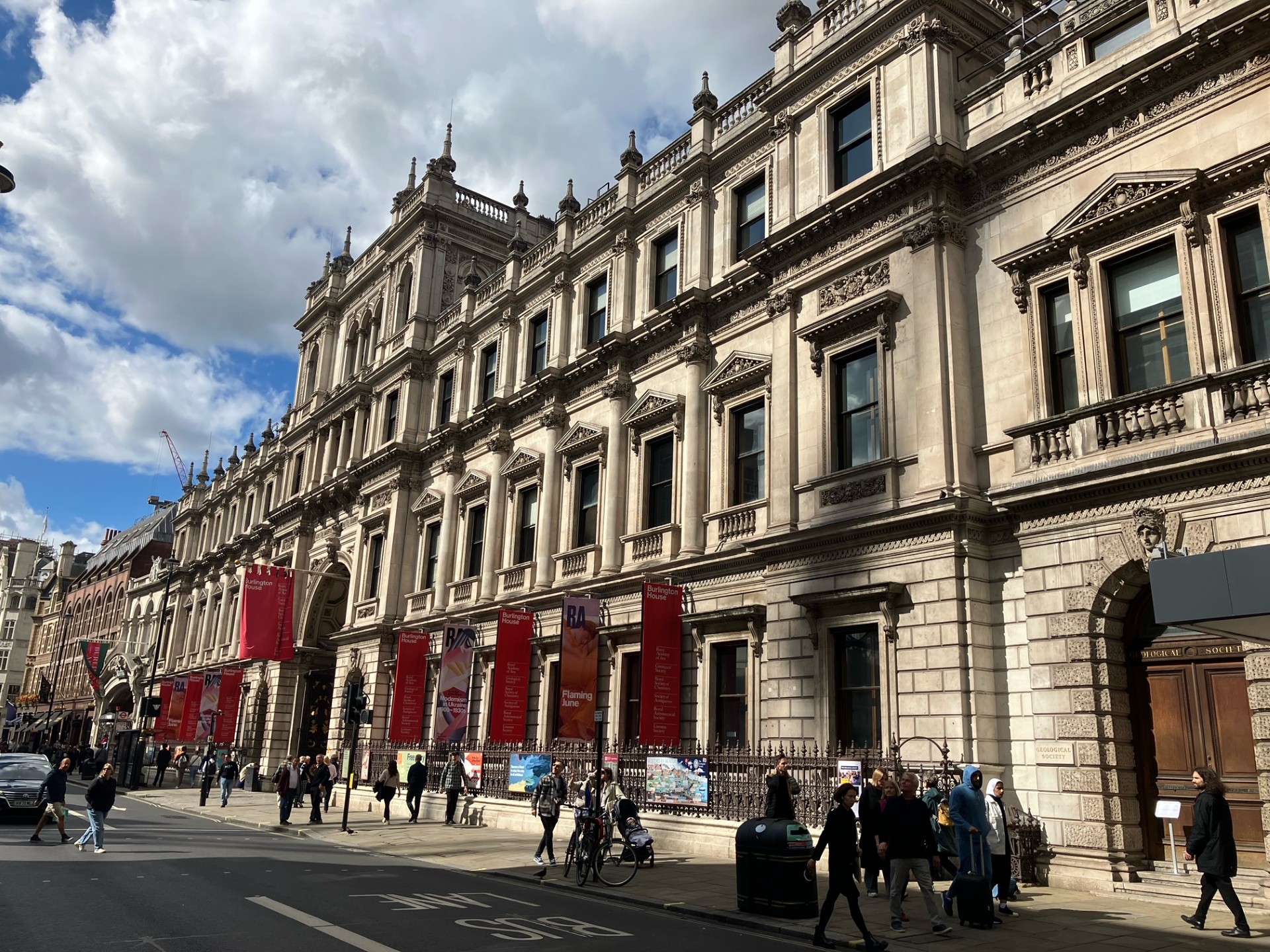




September 10–12, 2024: Both Sue Hovorka and Seyyed Hosseini attended and presented at the 2024 Ground Water Protection Council (GWPC) Annual Forum in Nashville, TN.
- On Tuesday, Sept. 10, 2024, GCCC Representatives provided a workshop and training entitled, Application of Machine Learning to Support CCS Deployment. Speakers include: Seyyed Hosseini (GCCC), Hema Siriwardene (USDOE NETL), Hari Viswanathan (Los Alamost National Laboratory). Read more about this workshop here.
- On Thursday, Sept. 12, 2024, GCCC Representatives provided a 1.5-hour technical session about Class VI UIC & CCUS, which provided professionals with CE credit. This session was moderated by Ivan Salas (Manager-Underground Injection Control Railroad Commission of Texas) with speakers Sue Hovorka (GCCC), Seyyed Hosseini (GCCC), and Danny Kingham (Senior Associate Hydrogeologist, GSI Environmental Inc.).
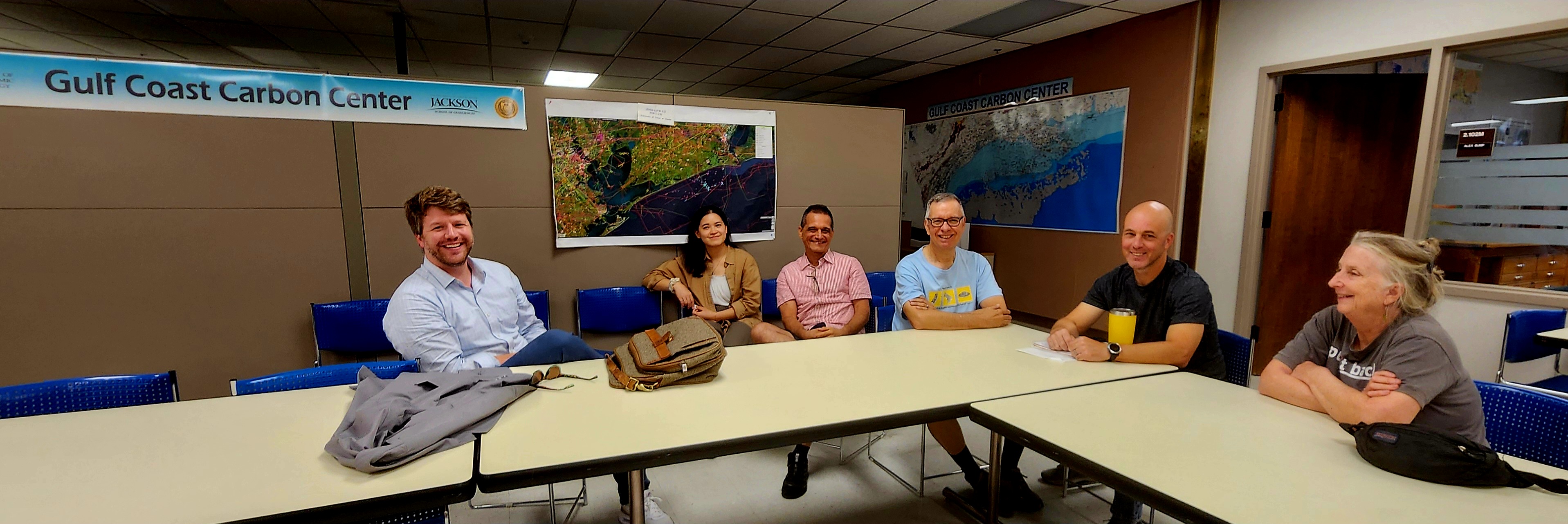
September 6, 2024: GCCC Representatives had an informal meeting with Ben Wernette, Principal Scientist and Strategic Partnerships Lead with the Southern States Energy Board (SSEB).
September 6, 2024: The GCCC had the first official group meeting of the fall 2024 semester that focused on new student introductions and an orientation. 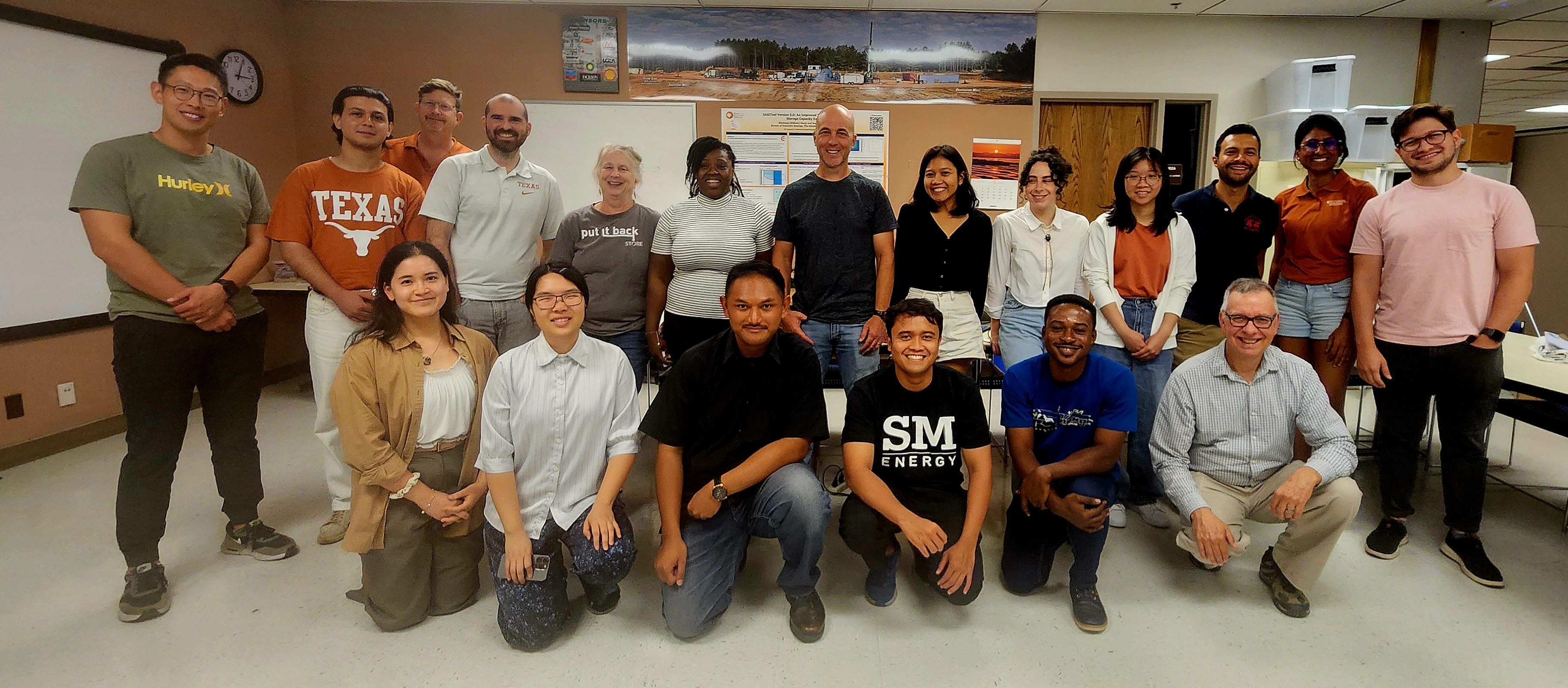
September 6, 2024: Seyyed Hosseini is invited to give a talk in Oklahoma at The University of Tulsa’s McDougall School of Petroleum Engineering. Seyyed’s presentation is entitled, “Geological Carbon Storage: Dynamic Modeling Considerations.”

September 4, 2024: The GCCC’s Senior Research Professor and Scientist, Tip Meckel, testified for the Texas Senate Finance Committee on the benefits of offshore CO2 storage at the Texas State Capitol.
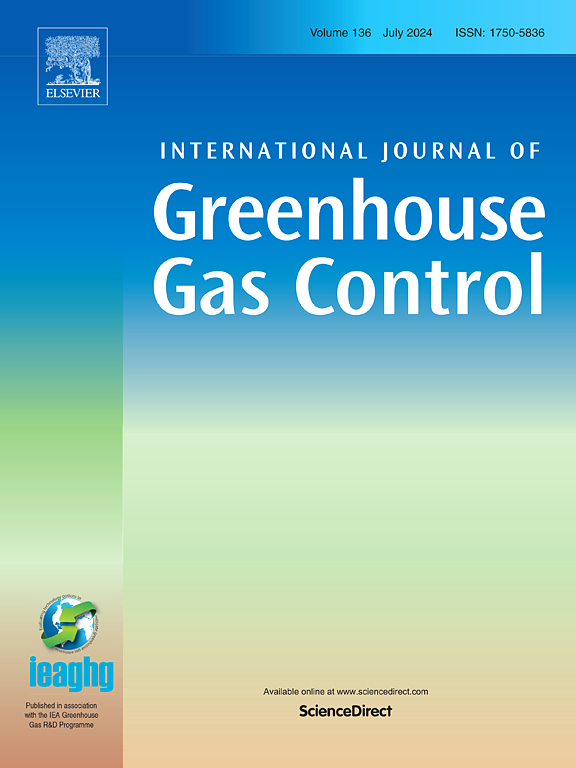
September 4, 2024: Excited to announce that Seyyed Hosseini and co-authors published a manuscript entitled, "Dynamic Modeling of Geological Carbon Storage in Aquifers – Workflows and Practices" in the October issue of the International Journal of Greenhouse Gas Control. Congratulations to authors: Seyyed Hosseini, Reza Ershadnia, Lisa Lun, Stephen Morgan, Matt Bennett, Chris Skrivanos, Boxiao Li, Reza Soltanian, Rajesh Pawar, and Sue Hovorka for this great contribution. Seyyed stated that this is “a great paper to read for anyone in the business of reservoir simulation for geologic carbon storage and related Class VI permitting” and highly recommends the paper to learn more about suggested workflows and the best practices of today. To read more about this article, click here.
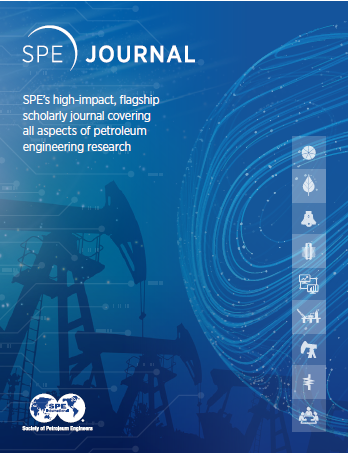
September 3, 2024: Congratulations to Hongsheng Wang, Ruichang Guo, Laura E. Dalton, Dustin Crandall, Seyyed A. Hosseini, Ming Fan, and Cheng Chen for publishing, “Comparative Assessment of U-Net-Based Deep Learning Models for Segmenting Microfractures and Pore Spaces in Digital Rocks” in the SPE Journal. To read more about this article, click here.
September 1, 2024: Congratulations to Reza Ershadnia, Farzad Moeini, Seyyed Hosseini, Zhenxue Dai, and Mohamad Reza Soltanian for their recent manuscript entitled, “Predicting multiphase flow behavior of methane in shallow unconfined aquifers using conditional deep convolutional generative adversarial network” that was published in the Journal of Hydrology. Reza was a GCCC Postdoctoral Fellow who is now with ExxonMobil. Read more about their publication here.
August 26–30, 2024: The GCCC’s Carlos Uroza and Shuvajit Bhattacharya attended, and were involved with the following presentations and activities related to CO2 storage while at the SEG-AAPG-Image Conference in Houston, TX:
Monday, Aug. 26, 2024
- Well Logging and Petrophysics for Geologic Carbon Sequestration – Shuvajit Bhattacharya’s Short Course (8:30 am to 4:30 pm)
Tuesday, Aug. 27th, 2024
- Calibrating Performance Prediction for Large-Scale Injection – Chinemerem C. Okezie, Alexander Bump, and Susan Hovorka Oral Presentation (presented by Carlos Uroza at 1:20 pm)
- A new workflow to assess the feasibility of CO2 plume monitoring by time-lapse seismic modeling: A case study from the Decatur site, United States – Shuvajit Bhattacharya, Sahar Bakhshian, and Sujith Swaminadhan’s Poster Presentation (3:40 to 5:20 pm)
Wednesday, Aug. 28th, 2024
- Unravelling the potential for CO2 sequestration of a sandy system with a deep USDW: The Paleogene Wilcox Group, onshore Texas, USA – Carlos Uroza’s Oral Presentation (9:15 am)
- At the Carbon Management Pavilion
- Repurposing My Geological Skills for CCS: The GCCC-BEG Approach – Carlos Uroza Oral Presentation (10:40 am)
- Panel on “Training the Next Generation of CCS Geoscientists” – Carlos Uroza (11:20 am – 12 pm)
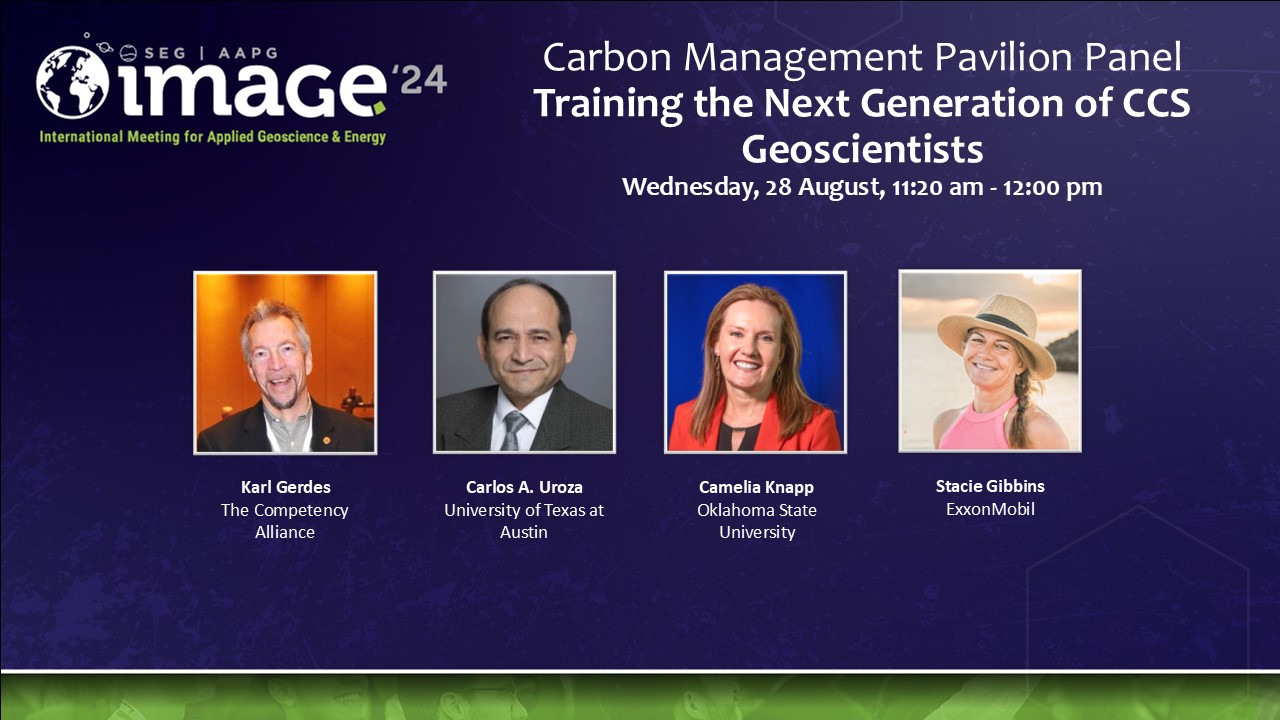
Thursday, Aug. 29th, 2024
- Effects of fluid saturation models on seismic response in carbon dioxide monitoring – Sujith Swaminadhan, Shuvajit Bhattacharya, and Sergey Fomel’s Poster Presentation (10:20 to 12:00 pm)
Friday, Aug. 30th, 2024
- Assessing the Potential for CO2 Sequestration in the Chandeleur Sound Area, Offshore Louisiana, USA – Carlos Uroza, Yushan Li, and Susan Hovorka Poster Presentation at Post-Convention Workshop (3:05 to 3:40 pm)
- Feasibility of time-lapse seismic on CO2 monitoring: Examples from the field and lab studies – Shuvajit Bhattacharya (4:05 pm)
August 23, 2024: Sue Hovorka provided a virtual brown bag seminar entitled, "How the Underground Injection Control Program provides support to the new field of Carbon Management” to the TCEQ.
August 21, 2024: Katherine Romanak attended, and participated in, the National Conservative Energy Summit in Houston, Texas. Katherine highlighted key aspects as to why CCS is useful on a panel entitled, “Innovations in Carbon Capture and Sequestration: Paving the Way to a Sustainable Future.” The session was moderated by Charles McConnell and the other panelist included Steve Everley.
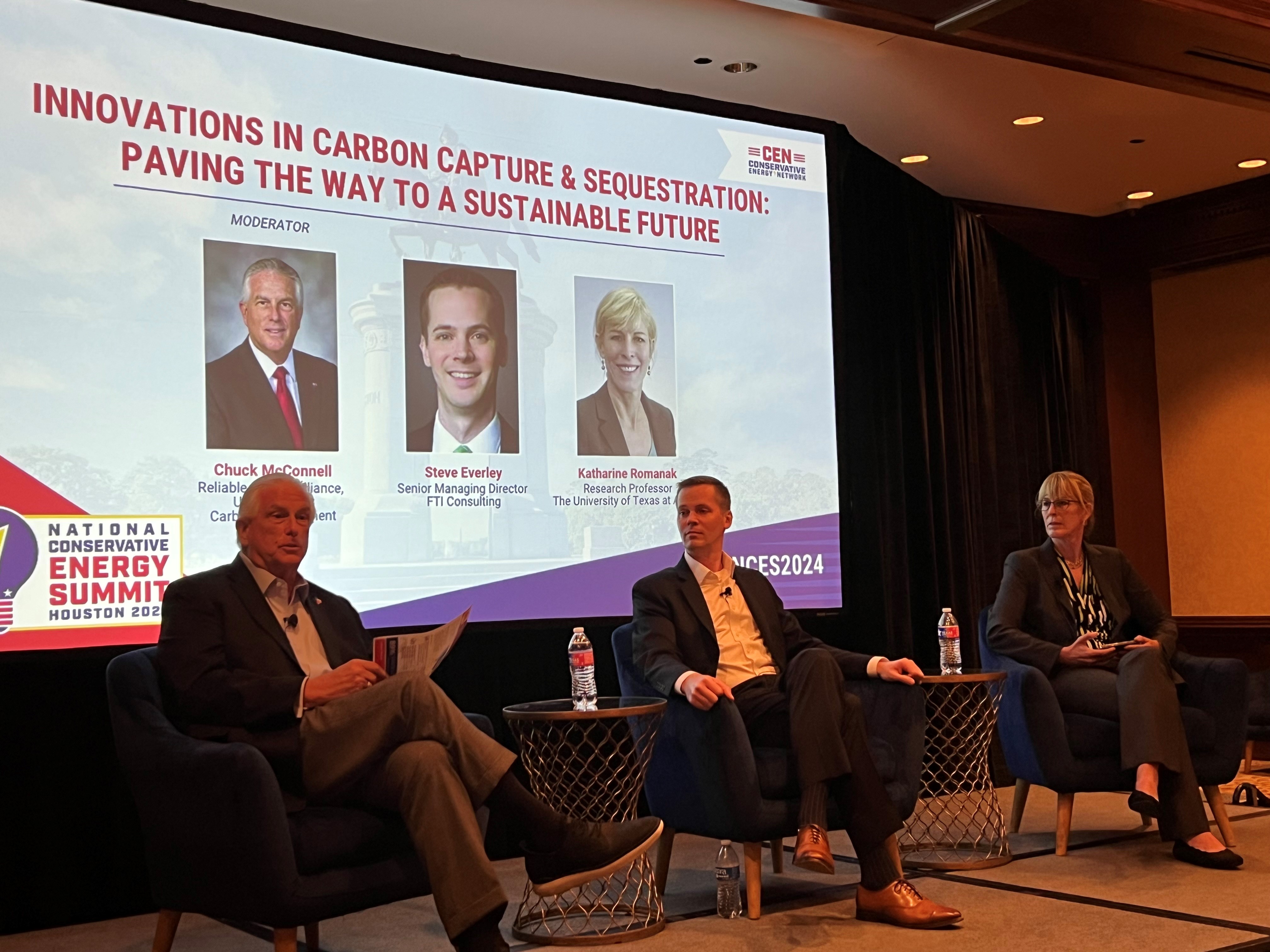
August 21, 2024: Tip Meckel presented HR3D from San Luis Pass & A Summary of NASM Workshop on Plugging Abandoned Wells in the GCCC’s weekly meeting.
August 21, 2024: Sue Hovorka was the guest speaker for the Enverus Innovation Underground webinar series, based out of Calgary in Alberta, Canada. Sue had a 50-minute discussion with Graham Bain on technical aspects of CCS entitled “Innovation Underground: Gulf Coast CCS.” Sue provided an introduction about the GCCC, advantages of CCS for the Gulf Coast, a breakdown of Class VI applications and advice for applicants, strategies for minimizing CO2 plume migration, addressing faulting and pressure communication in the Gulf Coast, and projecting the outlook of CCS to 2025. To learn more about this discussion or to listen in, click here.



August 20, 2024: Sue Hovorka had a virtual presentation entitled, “Siting and monitoring successful CO2 storage projects: What is new and developing?” at the American Chemical Society (ACS) Conference. At this conference, Prof. Jingbo Louise Liu with Texas A&M Energy Institute and a TXLA CMC collaborator, received the ACS Division of Energy and Fuels (ENFL) Mid-Career Award. Sue’s presentation was in a session held in Prof. Liu’s Honor.
August 16, 2024: The Gulf Coast Carbon Center welcomes 5 graduate students to our program at The University of Texas at Austin:
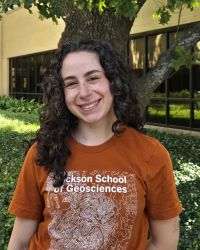
Ruba Afifi is starting a Master’s degree with the Jackson School of Geoscience (JSG), and will be supervised by the GCCC’s Tip Meckel. Ruba will work on a regional subsurface assessment of carbon dioxide (CO2) storage sites to ensure long-term containment of CO2. Ruba is prestigiously sponsored by Saudi Aramco. She brings valuable experience from over the past 5 years working in both oil and gas exploration as well as upstream R&D. Ruba developed a deep understanding of the importance carbon capture and storage (CCS) and the growing demand for experts in the field. Ruby's academic interests encompass modeling, mapping, geological carbon storage, geomechanics, and regional and subsurface assessments, which reflects her current commitment in advancing the knowledge of CCS and contributing to sustainable energy solutions.
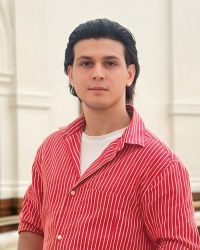
Javid Aliyev is starting a Master’s degree with the Energy and Earth Resources (EER) program at the JSG. Javid will be supervised by Alex Bump and will be working on part of an anticipated DOE initiative called CarbonStore, looking at the 1.1 million legacy wells in the Gulf of Mexico, trying to quantify the risk and define a plan to test and calibrate risk assessments.
Javid is originally from Azerbaijan, has a Bachelor’s of Petroleum Engineering from Azerbaijan State Oil and Industry University, where he became passionate about CCS after attending a Society of Exploration Geophysicists (SEG) conference. While conducting research on his undergraduate thesis, Javid learned about the GCCC’s research, which inspired Javid to explore CCS further. Javid also enjoys drawing, playing soccer, and exploring history, science, and the arts. Javid’s academic interests include CCS, petrophysics, petroleum geology, economics, and geopolitics.
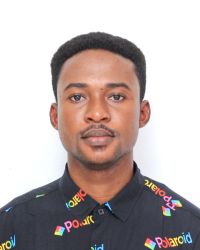
Eddie Talen is starting a Master’s degree with the EER-JSG Program under the supervision of Alex Bump. Eddie will be assessing the storage potential of the Corsair Trough, which offers the biggest gap in legacy wells anywhere between the shelf edge and the up-dip margin of the Gulf of Mexico. Eddie is from Asante Mampong within the Ashanti Region of Ghana. Eddie earned both Bachelor’s and Master’s degrees in Geomatic Engineering from The Kwame Nkrumah University of Science and Technology, where he developed strong expertise in geospatial data analysis.
Eddie was introduced to CCS during a Climate Change and Carbon Capture course offered by the University of Edinburgh; Eddie became interested in low-carbon energy transitions and is inspired to contribute to the CCS industry. Through his exploration of geological CO2 storage solutions, Eddie discovered the GCCC and was inspired by the group’s prominent role in CCS innovation and development. Eddie is also interested in GIS, programming and data analysis, carbon neutrality and low-carbon energy transitions, and modeling.
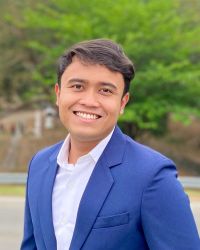
Romal Ramadhan is starting a PhD with the JSG under the supervision of Seyyed Hosseini and Tip Meckel. Romal’s PhD research will focus on geomechanical modelling of CCS. Romal earned a Bachelor's degree in Petroleum Engineering from Universitas Islam Riau in Indonesia, and a Master's degree in Petroleum Engineering from Chulalongkorn University in Thailand. Prior to joining UT Austin’s GCCC, Romal was a Reservoir Engineer at the Chiang Mai Carbon Capture and Storage Frontier Research Centre in Thailand, where he conducted reservoir simulations for CCS projects.
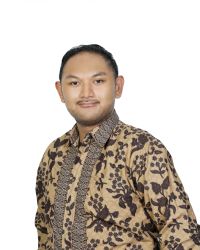
Bimar Maulana is a starting the EER Master’s program under Tip Meckel’s supervision. Bimar will focus on geomechanical properties and reservoir heterogeneity with respect to CO2 containment in saline aquifers within the Asri Basin in Indonesia. Bimar is originally from Yogyakarta, Indonesia where he also received a Bachelor’s degree in Geological Engineering from the University of Pembangunan Nasional “Veteran” Yogyakarta. Bimar’s passion for the CCS field and the GCCC’s well-known research among Indonesian geoscientists led him to joining the group to further explore his interests in modeling, geomechanics, and exploration. Bimar also enjoys playing the guitar, singing, and watching movies.
August 15, 2024: Tip Meckel taught a 1-day short course on carbon capture and storage (CCS) in New Orleans, LA for the Deepwater Technical Symposium, with about 15 attendees from diverse backgrounds including BSEE, BOEM, Environmental Consultants, and Project Developers.

August 14, 2024: Congratulations to Hailun Ni for co-authoring a paper entitled, “Impact of Pressure-Dependent Interfacial Tension and Angle on Capillary Heterogeneity Trapping of CO2 in Storage Aquifers,” published in the SPE Journal. Read more about it here.
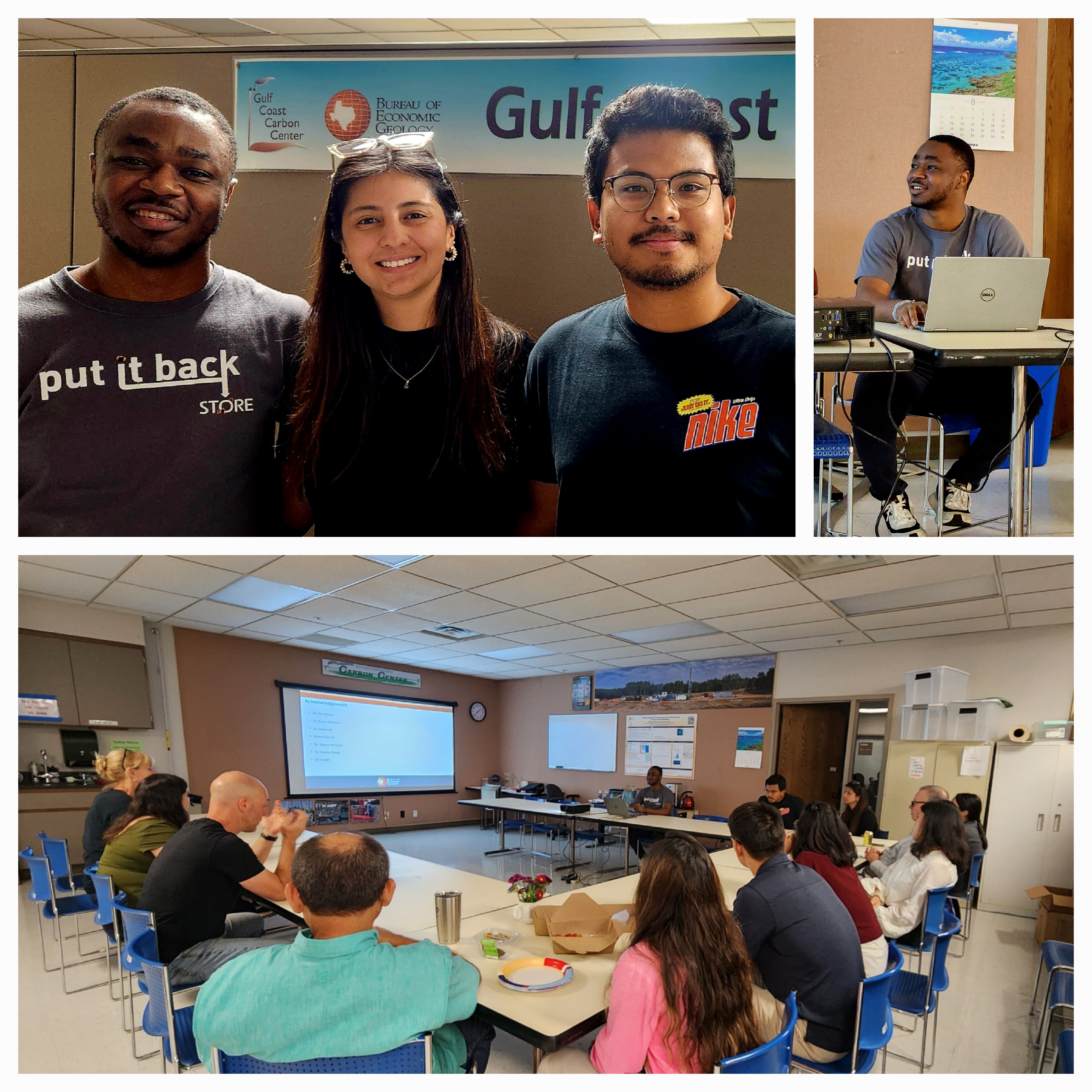
August 14, 2024: During our weekly GCCC meeting, we heard summary presentations and celebrated our M.S. student’s Chinemerem Okezie, Ismail Faruqi, and Maria Madariaga who are officially wrapping up their M.S. projects this week at the Gulf Coast Carbon Center. Congratulations, Graduates!
We wish them well on their new career paths. Congratulations to Chinemerem who starts a PhD program this fall at the New Jersey Institute of Technology’s Geomechanics for GeoEngineering and Sustainability Lab, located at University Heights in Newark, NJ. Congratulations to Ismail who has accepted a Subsurface Geologist position at the North Dakota Geological Survey.
August 9, 2024: Many were traveling, but several colleagues congratulated Sahar Bakhshian over chocolate cake on her last day at the Bureau of Economic Geology’s Gulf Coast Carbon Center. Sahar accepted an Assistant Professor position at Rice University’s Department of Earth, Environmental and Planetary Sciences. We will miss having Sahar in the office and as a member of the GCCC team. We look forward to continuing research projects with Sahar as well as many future collaborations with her.


August 6–8, 2024: In preparation for upcoming DOE Fossil Energy and Carbon Management (FECM) public meetings, Angela Luciano participated in planning meetings with Climate Now. Planning focused on addressing the needs of the Houston Ship Channel, Galveston, and Port Arthur-Beaumont regions in Texas. The GCCC was invited to provide scientific expertise and resources to help serve the community's needs on critical issues related to carbon capture and storage.
August 6, 2024: Announcing the 7th International Workshop on Offshore Geologic CO2 Storage that will be held in Port Arthur, Texas on September 16–18, 2024. Join us by reading more about this workshop and registering for the conference here.

August 5–9, 2024: GCCC members Seyyed Hosseini, Sue Hovorka, Tip Meckel, Katherine Romanak, and Hongsheng Wang attended the 2024 FECM/NETL Carbon Management Research Project Review Meeting in Pittsburgh, PA. The conference had over 1,400 attendees! Our group was involved with the following sessions:
Tuesday, August 6, 2024
9:05 – 9:15 am - Labor and Workforce Development and Community Engagement Panel, Susan Hovorka
10:40 – 10:55 am - SMART Tools - Computational and Visualization Advances, ML-based Dimension Reduction Strategies Seyyed Hosseini and Hongsheng Wang
5:45 – 7:45 pm – Poster: Efficient Dimension Reduction of Complex 3D CO2 Saturation Using Deep Learning Models, Hongsheng Wang
Thursday, August 8, 2024
5:20 – 5:35 p.m. Offshore Topics, International Offshore Initiative, Katherine Romanak
Friday, August 9th, 2024
4:00 – 4:20 p.m. CarbonSAFE Phase II – Storage Complex Feasibility: Coastal Bend and Offshore Carbon Storage (FE0032271)
4:20 – 4:40 p.m. Field Validation of MVA Technology for Offshore CCS: Novel Ultra-High Resolution 3D Marine Seismic Technology (P-Cable) (FE0028193)

August 2, 2024: Tip Meckel was invited to speak at The White Hall breakfast club at the River Oaks Country Club in Houston, TX. Tip provided a group of about 60 participants a presentation on “Carbon Management and New Business Opportunities.” Thanks to Mark Waller for the invitation and Claudio Gutierrez for photographs.


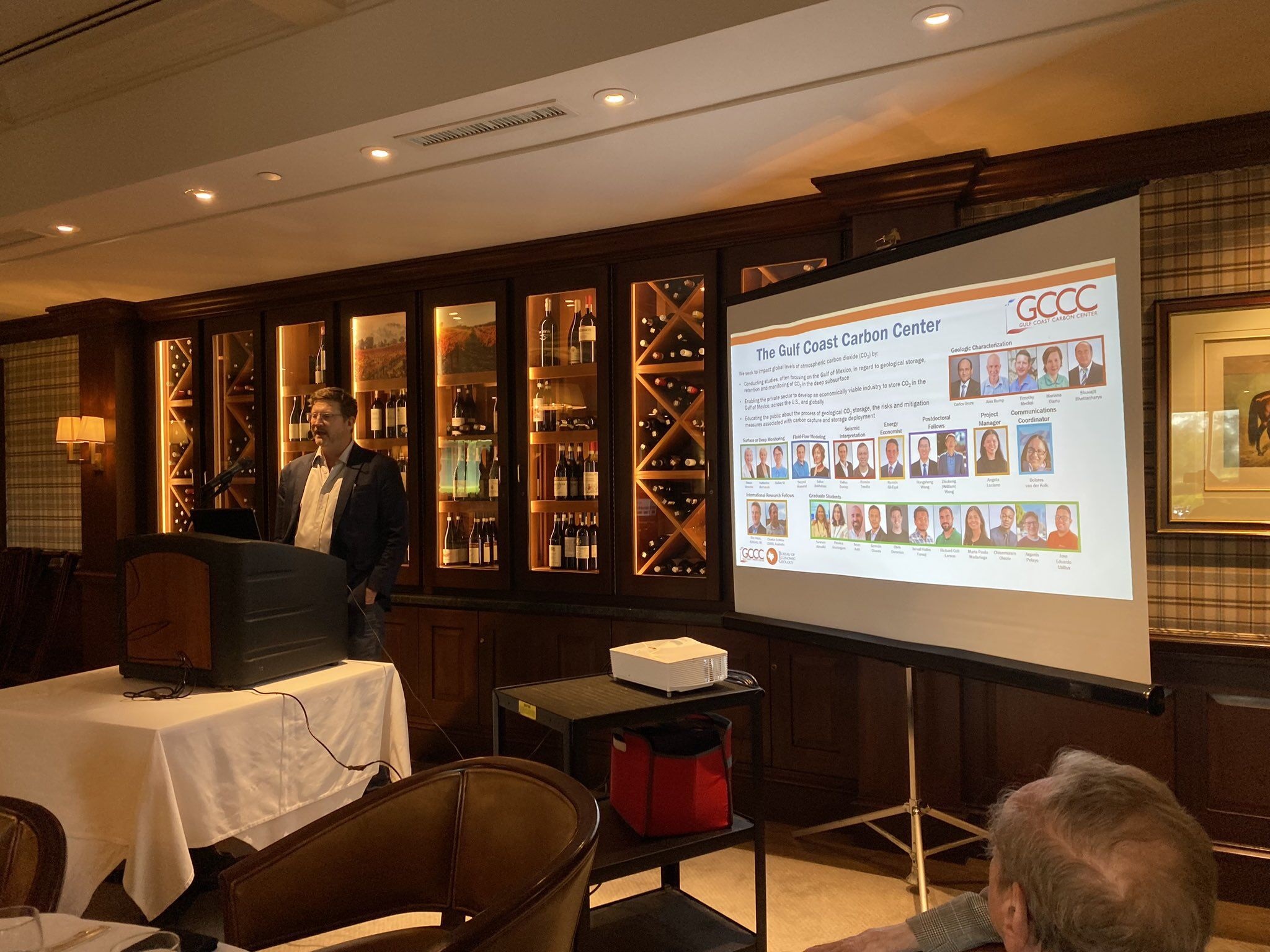

August 1, 2024: PowerHouse Texas hosted their first Energy Academy class for bipartisan legislative staffers. This Academy was kickstarted with a class on Carbon Capture, Utilization and Storage (CCUS). A group of staffers learned how storage works and discussed long-term stewardship, post-closure liability, and many other key lessons. Expert speakers included Tip Meckel from the Bureau of Economic Geology, Nichole Saunders from Environmental Defense Fund and Scott Castleman from the Houston CCS Alliance.
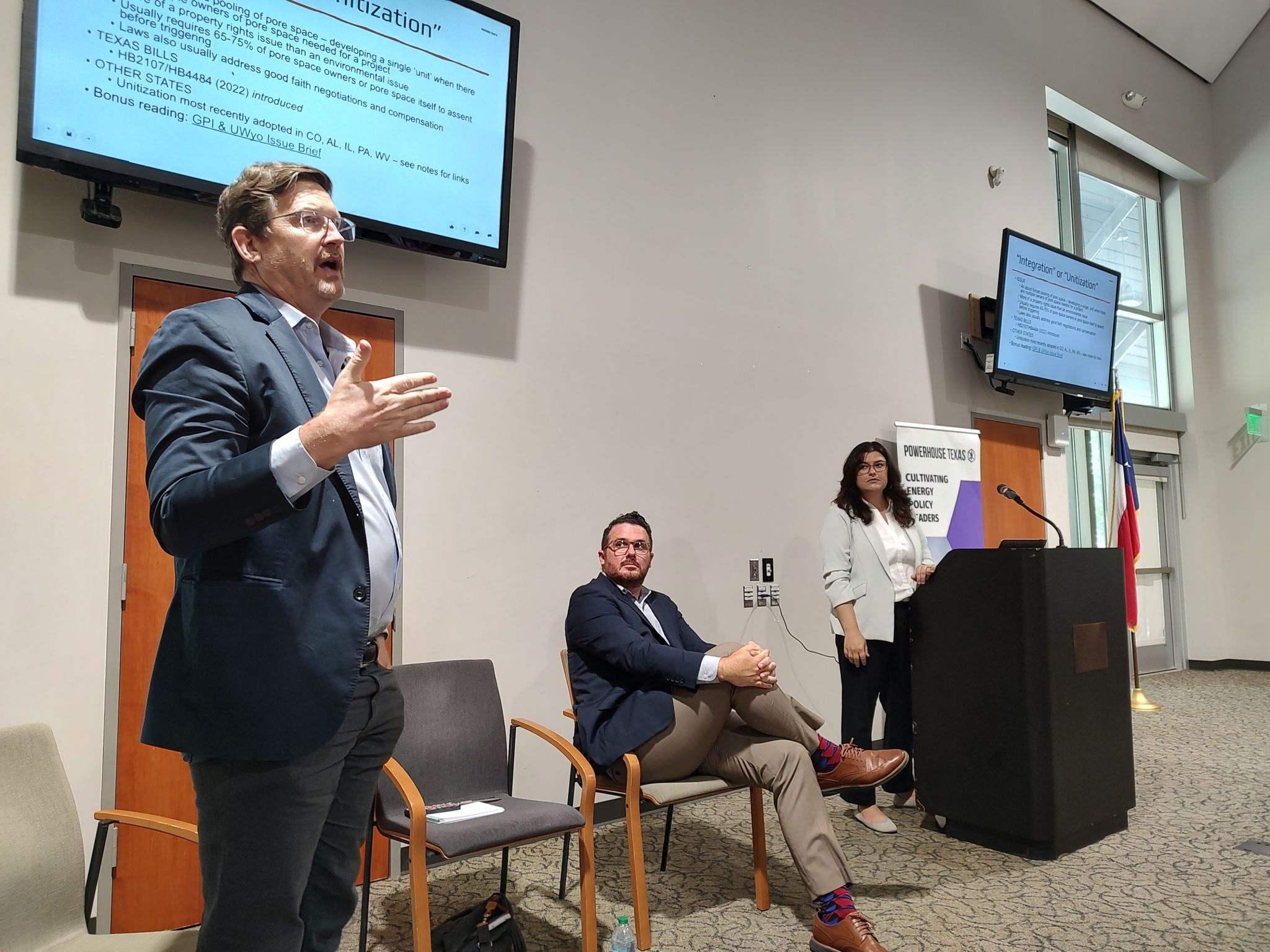
July 31, 2024: The Gulf Coast Carbon Center has been thrilled to host 3 undergraduates for the JSG's Research Training Experience (RTX) this summer, and they presented their final projects on the main campus today. Since mid-June, we have had the pleasure of having students working with the following advisors and projects:
- Ashtyn Christian is paired up with Sue Hovorka to map the USDW along the onshore Texas coastline to help assess future CCS sites;
- Priyansh Dhandha is working with both Ramón Arturo Gil-Egui and Sahar Bakhshian on utilizing natural language processing to perform sentiment and emotion analyses around CCS sites proposed for Class VI injection; and
- Taegon Hibbitts is paired up with Hassan Dashtian to utilize an automated classification system to help identify methane super emitters using satellite data.
Congratulations to these students and their advisors for completing excellent projects! Hook’em!



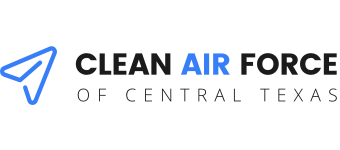
July 25, 2024: Ramón Treviño presented, “Carbon Capture & Sequestration (CCS): An Overview,” to the Clean Air Force of Central Texas. The talk occurred at the Alen Corporation during the Clean Air Force’s monthly meeting.
July 24, 2024: The GCCC research team was impressed by presentations created by Ashtyn Christian, Priyansh Dhandha, and Taegon Hibbits who are currently enrolled in the JSG’s Research Training Experience (RTX) program. These three undergraduates provided 10- to 15-minute long powerpoint presentations summarizing their summer research projects. This was a great practice run, since they will present their research in a final poster format for the RTX Research Symposium scheduled for July 31st, 2024. Congratulations to this great team as well as their summer advisors: Sue Hovorka, Ramón Gil-Egui, Sahar Bakhshian, and Hassan Dashtian. We have enjoyed our interactions with these students all summer as well as seeing their internal collaborations and camaraderie. Go, team!

July 23, 2024: Tip Meckel attended the American Farm Bureau - Southern Region Legislative Conference. Tip presented "Hydrogen, Geothermal and Carbon Storage Project Issues for Landowners" in a session with Jennifer Owen, the Executive Director Texas Land & Mineral Owners Association. Landowners involved in agriculture, forestry, and ranching were able to ask questions about the land ownership issues associated with various low-carbon energy projects. The southern region in includes 15 states in the southeastern United States.
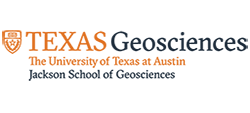
July 23, 2024: The Gulf Coast Carbon Center’s Alex Bump, Hailun Ni, and Sahar Bakhshian are in the news. Take a look at this article by Monica Kortsha with the Jackson School of Geosciences at The University of Texas at Austin! Read more about carbon storage and what our Bureau of Economic Geology Researchers are doing here.

July 22–29, 2024: The GCCC’s PI, Sue Hovorka, hosted 20 high school seniors for the GeoFORCE Texas 12th Grade Research Academy. Students worked together in teams to assess real-world carbon storage projects and datasets. This TXLA CMC effort, led by Sue, brought in guest lecturers and GCCC researchers Dolores van der Kolk, Alex Bump, and Zhicheng William Wang to speak about basic geology, sedimentology, seismic-subsurface data, and how to use EASiTool software. The GCCC’s graduate students Ismail Faruqi and Chinemerem Okezie helped coached teams on their projects throughout the week. Special thanks the TxCMP's Fred Closman and Gary Rochelle for giving GeoFORCE students a tour of their Carbon Capture Pilot Plant that has been testing the mitigation methods for amine oxidation.
July 16, 2024: Alex Bump was invited to provide a virtual presentation about "CCS for Professional Geologists" for American Institute of Professional Geologists (AIPG) for over 100 members around the USA.
July 10, 2024: Special thanks to Andrey Bakulin for providing a “Geophysical Monitoring Discussion” with the GCCC during our weekly meeting presentation series. Andrey is with Texas Consortium for Computational Seismology (TCCS) at the Bureau of Economic Geology.
July 3, 2024: The GCCC’s postdoctoral fellow, Hongsheng Wang, presented on artificial intelligence with respect to carbon capture & storage in a talk entitled, “Seeing the Invisible: How AI Powers Image Analysis in Carbon Capture and Storage.”
July 1–3, 2024: Based on Katherine Romanak’s attribution research and a call to add attribution as a step in the CCUS methodologies (Dixon and Romanak, International Journal of Greenhouse Gas Control, 2015), Katherine was invited to give a talk at the Intergovernmental Panel on Climate Change (IPCC) Expert Meeting on Carbon Dioxide Removal (CDR) Technologies and CCUS activities by the IPCC Task Force on Inventories. At this meeting, held in Vienna, Katherine summarized two decades of experience in the robust nature of carbon storage, the GCCC’s research on risk and environmental impacts, and the role of environmental monitoring in CO2 storage regulations in a virtual presentation to the audience.

July 1, 2024: Congratulations to Alex Bump for his promotion from Research Scientist IV to Research Associate Professor today. Congratulations, Alex, and thank you for keeping your carbon footprint low even on 90 to 105°F days in Austin.
June 29, 2024: The GCCC is proud to announce that our EER-JSG M.S. Student, Previna Arumugam, was the co-recipient of an Outstanding Student Award from the IEAGHG International CCS Summer School that was held between June 23 and 29, 2024 in Darwin, Australia.
Every year, this CCS summer school systematically picks the top 2 students in the program. The other recipient, Dillon Ramsook, is currently an Asst. Prof. at The University of Trinidad & Tobago (UTT). The IEAGHG CCS summer education program has become quite a competitive summer school over the last several years. This year, there were only 45 participants from 28 countries selected from 200+ applications of professionals and students who applied from all over the world. Previna's current M.S. advisor is Dr. Alex Bump. Congratulations to Previna and Dillon! Hook’em Horns!
June 26, 2024: Katherine Romanak, Tim Dixon, and IEAGHG Summer School Student Martine Enge were interviewed for ABC Radio’s “Drive Time” program in Darwin, Australia about carbon capture and storage (CCS) and the IEAGHG International CCS Summer School. Click here to listen to this interview.

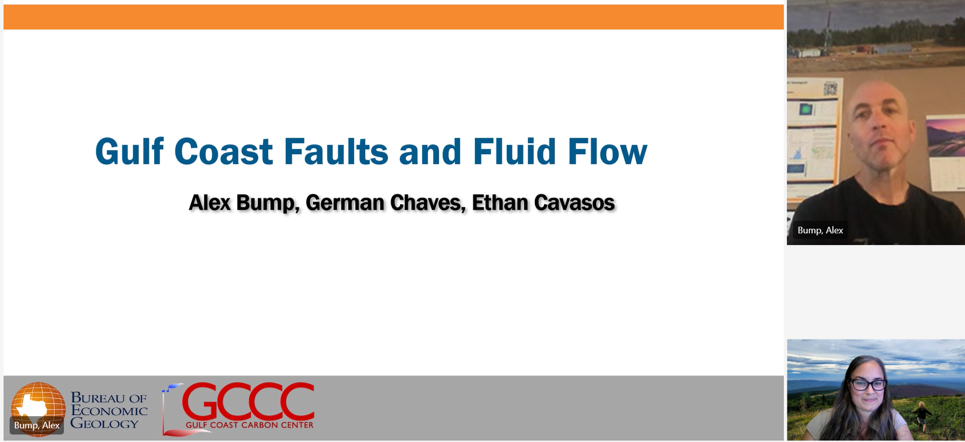
June 26, 2024: For our weekly GCCC group meeting, Alex Bump presented, “Gulf Coast Faults and Fluid Flow.”
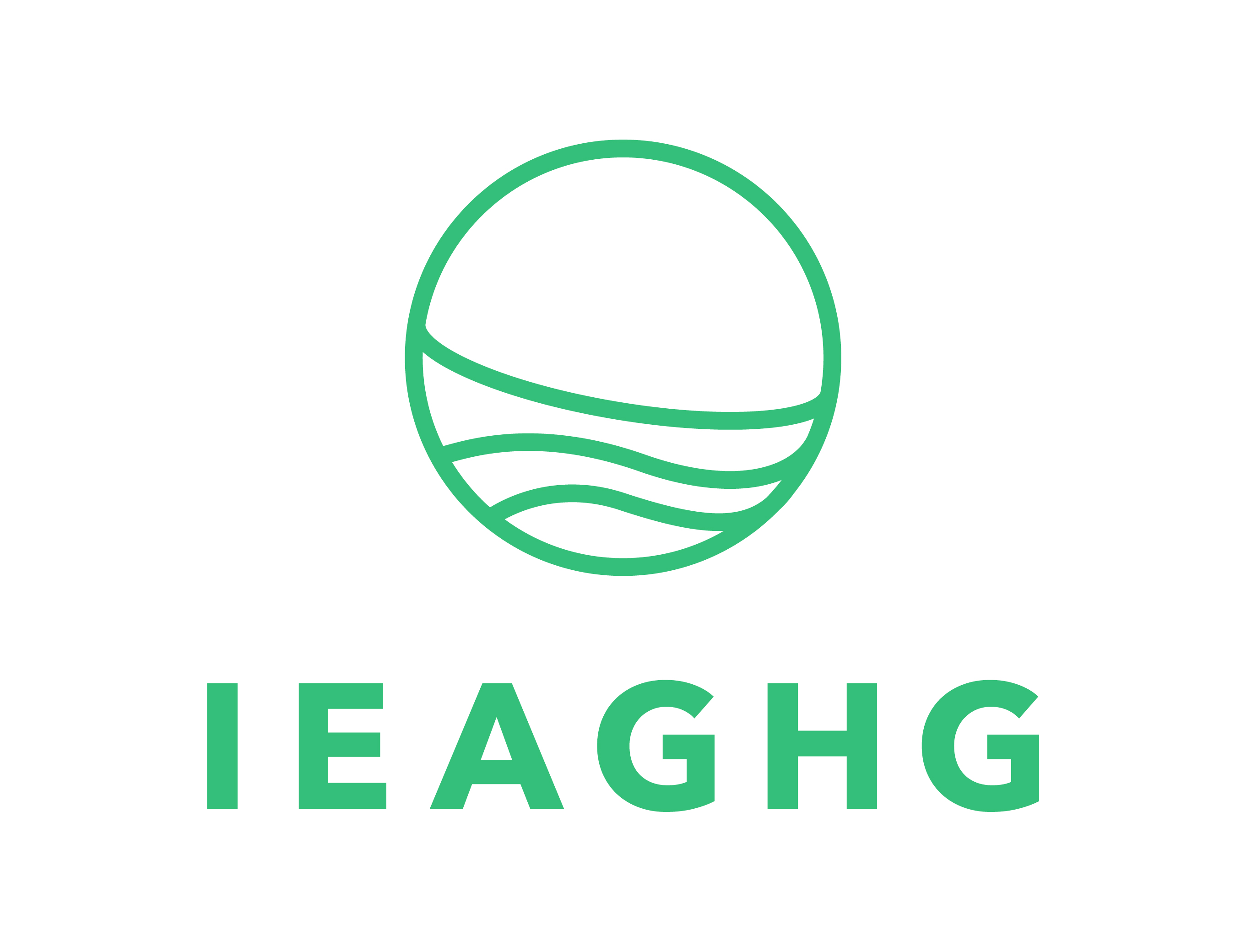
June 23–29th, 2024: Katherine Romanak attended IEAGHG’s 2024 International CCS Summer School as an instructor, and we are excited to announce that a GCCC’s graduate student, Previna Arumugam, was selected to attend as a student this year. IEAGHG International CCS Summer School was held in Darwin, Australia this year. This 5-day CCS course includes lectures from world-leading scientists and experts, interactive sessions, field trip and group activities, panel discussions, networking opportunities, student presentations, and career talks. To read more about this program, click here.

June 21, 2024: The Gulf Coast Carbon Center hosted their 2nd Sponsors’ Meeting at ExxonMobil’s Energy Center’s Town Hall in Spring, TX for 2024. Our research group was delighted to share results from current carbon storage projects with respect to modeling, sand tank/lab experiments, onshore and offshore field-based projects, subsurface assessments, outreach projects, and updates about state and federal policies.
We thank ExxonMobil for generously hosting and sponsoring the GCCC's Sponsors' Meeting. Special thanks to Matthias Imhof and Taylor Rodriguez for coordinating all the details that went into logistics for our event.
Thanks to our presenters: Sue Hovorka, Tip Meckel, Seyyed Hosseini, Alex Bump, Carlos A Uroza, Hailun Ni, Shuvajit Bhattacharya, Zhicheng William Wang, Sawsan Almalki, Chaves German, Angela Luciano, Ismail Halim Faruqi, and Dolores van der Kolk. There was great research shared from our researchers, Katherine Romanak and Sahar Bakhshian, that could not be there as well as from our students who have graduated this year from the Jackson School of Geosciences or the Hildebrand Department of Petroleum and Geosystems Engineering at The University of Texas at Austin. Thanks to Dolores van der Kolk for running the logistics of our meeting, feel free to contact her if you are interested in becoming a sponsor of the GCCC. Hook'em, team!

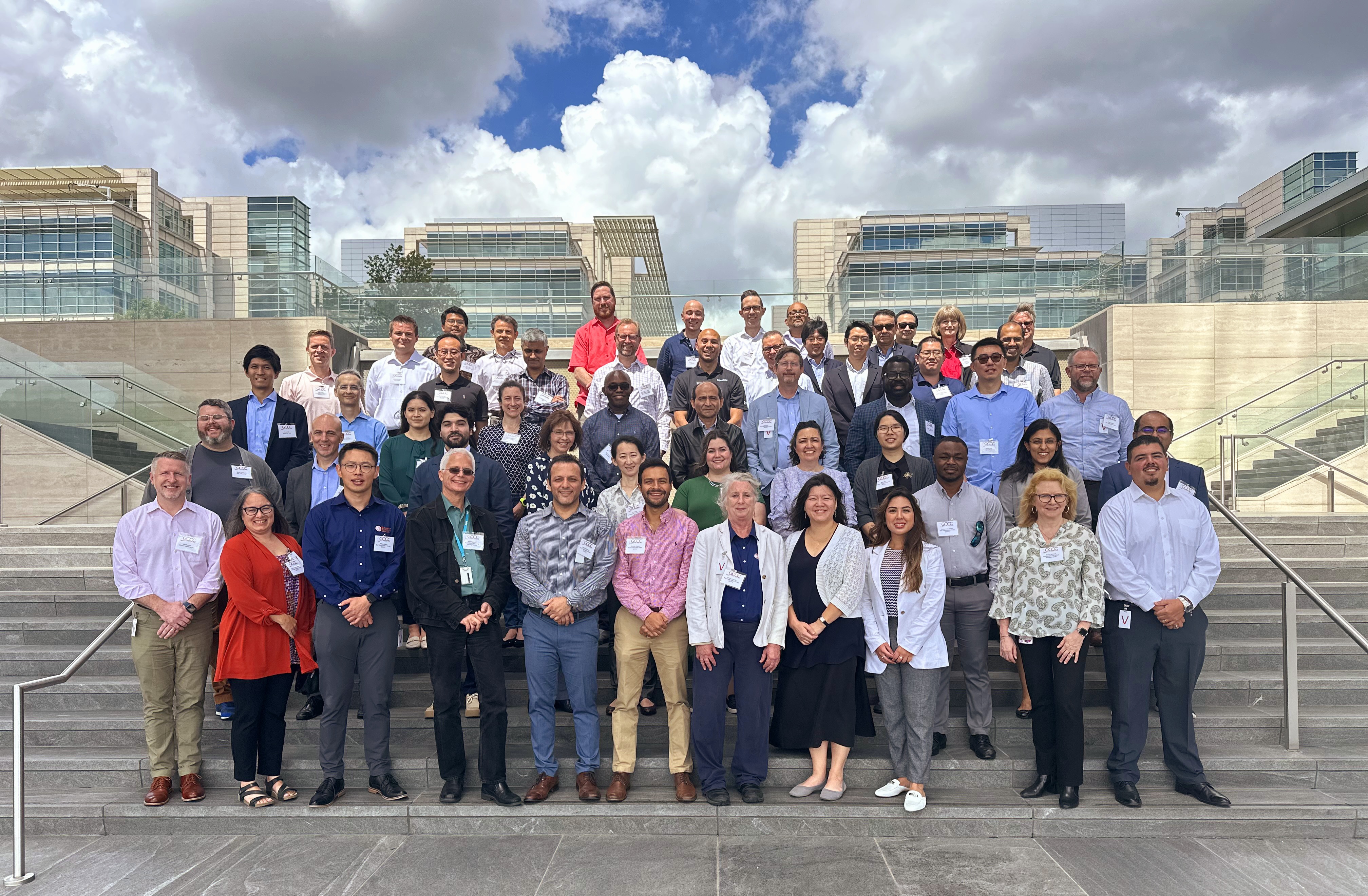
June 19, 2024: Alex Bump was invited as a speaker to provide a presentation about "Pressure Space" as part of the Chevron Energy Fellows Seminar in Houston, TX.
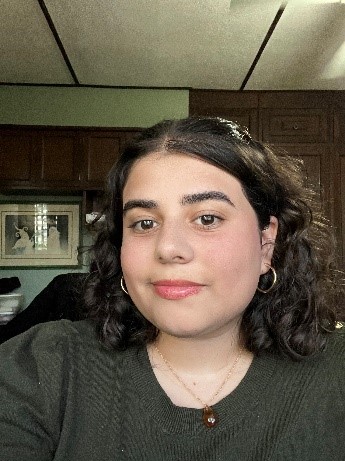
June 12, 2024: The GCCC welcomes a new undergraduate research assistant, Isabella Gutierrez, who is currently pursuing a degree in B.S. in Geosciences at The University of Texas at Austin (class of 2026). Isabella will work with Tip Meckel this summer to download and organize CCUS map files. Isabella has lived in Houston, Dallas, Virginia, Rio de Janeiro, and the Woodlands. She enjoyed taking advanced courses in Igneous & Metamorphic Petrology and Field & Stratigraphy Methods; she has a keen interest in GIS and coding. Welcome, Isabella!
June 12th, 2024: The GCCC hosted a weekly meeting and welcomed several new students including the following three Research Traineeship Experience (RTX) students:
Ashtyn Christian is currently pursuing a degree in Geology with a minor in GIS at Texas A&M University – Kingsville (class of 2025). This summer, Ashtyn will be working with Susan Hovorka on a project focused on creating an ArcGIS map to showcase the depth of the USDW base for counties along the Texas coastline, bringing datasets together for a cohesive view of the protected depths of groundwater essential to CCS projects in the region.
Ashtyn is from Lagarto, Texas, located near Lake Corpus Christi, and he enjoys hunting, working out, and playing video games. Ashtyn has been on several geology field trips, mainly in Central Texas, to gain field experience in courses such as Mineralogy, and Field Methods. He is particularly interested in GIS and remote sensing methods.
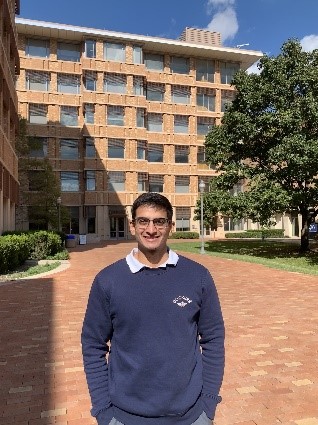
Priyansh Dhandha is currently pursuing a degree in Economics with a Certificate in Elements of Computing and Applied Statistical Modeling at The University of Texas at Austin (class of 2025). This summer, Priyansh will be working with Ramón Gil-Egui and Sahar Bakhshian on utilizing natural language processing to perform sentiment and emotion analyses around CCS sites proposed for Class VI injection. This project will help gain a better understanding of the public perception surrounding these projects.
Priyansh is originally from India, and he loves playing golf, working out, spending time outdoors, coffee, and house music. He is excited about working on CCS given how promising CCS projects are. Priyansh’s interests include Machine Learning, Macro Finance, Financial Economics, and Econometrics.
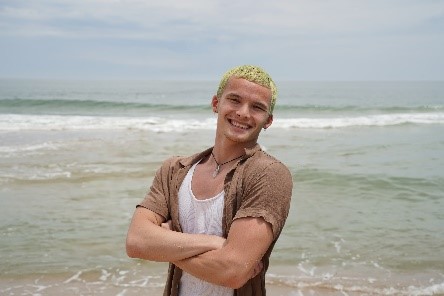
Taegon Hibbitts is currently pursuing a degree in Computer Engineering at University of Maryland at College Park (class of 2026). This summer, Taegon will be working with Hassan Dashtian on utilizing automated classification of methane super emitters using satellite data.
Taegon enjoys reading, going to the gym, and playing video games. He plays the viola in the Gamer Symphony Orchestra at the University of Maryland, where they exclusively perform video game music. Taegon is also a brother of the Kappa Theta Pi professional tech fraternity at UMD. He is passionate about technology and programming, enjoys working on PCs, and researching consumer technologies.
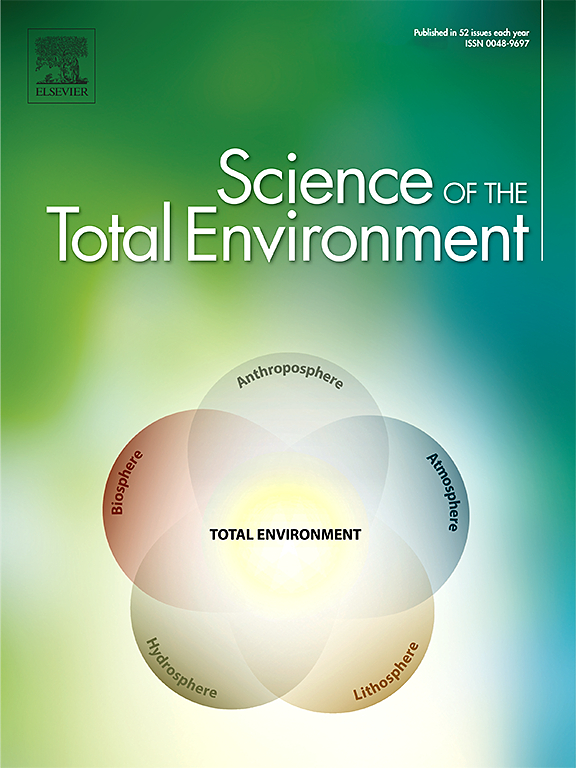
June 10, 2024: Congratulations to Seyyed Hosseini for co-authoring a manuscript entitled, “Geomechanics contribution to CO2 storage containment and trapping mechanisms in tight sandstone complexes: A case study on Mae Moh Basin.” This manuscript was published in a weekly international peer-reviewed scientific journal known as the Science of the Total Environment. Read more about this research here.
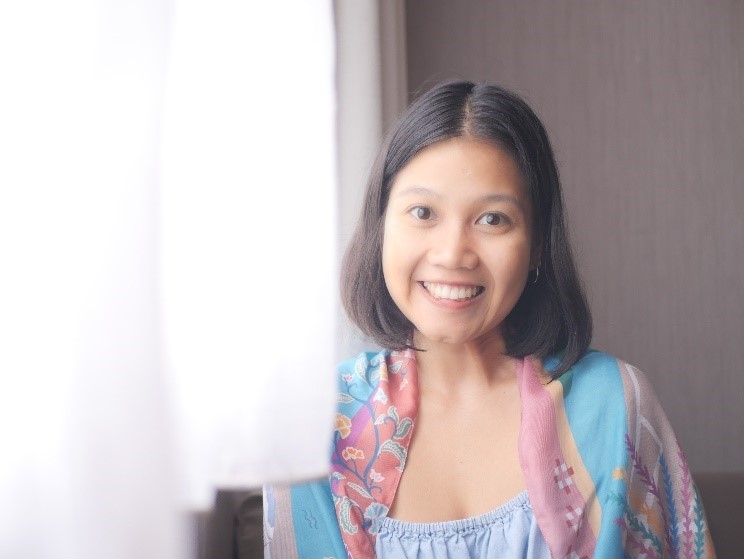
June 3, 2024: The GCCC welcomes Melianna Ulfah who is starting a Ph.D. with the Department of Earth and Planetary Science at the Jackson School of Geosciences (JSG) in collaboration with the GCCC and Center for Injection and Seismicity Research (CISR) at the Bureau of Economic Geology. Melianna is currently working with CISR to investigate induced seismicity caused by the impact of saltwater disposal injections in West Texas.
For her Ph.D., Melianna will be supervised by the GCCC’s Dr. Alex Bump and CISR’s Dr. Katie Smye; her project will have a geomechanics focus with respect to CO2 storage and saltwater disposal (SWD) injection. For her PhD project, Melianna will analyze the pressure interactions between injection wells and the possibilities of triggering distal earthquakes. By understanding the mechanisms behind the migration of induced seismicity, this collaborative study with CISR aims to evaluate potential outcomes and will develop effective prevention strategies for geological CO2 storage.
Melianna was born and raised in Indonesia. She studied geophysics during undergraduate years at Universitas Padjadjaran, and worked as a field geophysicist in the Mahakam Delta, Indonesia. Melianna received a M.S. degree from the Energy and Earth Resources Program at the JSG. For her M.S., she worked with the GCCC to build a geologic-petrophysical model for testing different injection scenarios, and analyzed the impacts on CO2 plume migration and pressure distribution. After graduation, Melianna interned with the Lawrence Livermore National Laboratory and her research focused on CO2 storage estimation capacity in the Northern California Basin. For the last few years, Melianna worked at Tetra Tech with a newly founded carbon sequestration team, supporting the technical analysis of CCS operations for the Class VI permit application. When not immersed in CCS research, Melianna practices Ashtanga yoga, hikes with their dog, and enjoys solving jigsaw puzzles with friends.
June 3, 2024: Our research group at the Gulf Coast Carbon Center is excited about the 17th International Conference on Greenhouse Gas Control Technologies, known as GHGT-17, that will be held between October 20–24th, 2024 in Calgary, Alberta, Canada. Researchers from our group are authors or co-authors on 14 presentations at this prestigious carbon capture and storage conference. Click here to download all of their abstracts.
May 21–22, 2024: Dr. Tip Meckel attended the first CCUS Permitting Task Force for Federal and non-Federal Lands meeting. This meeting was hosted by USGS in Reston, VA, and USGS Director, Dr. David Applegate, provided a warm welcome. Tip serves on the Federal Lands committee with ~ 20 other experts from industry and government. For more information, check out: https://www.whitehouse.gov/ceq/news-updates/2023/03/24/ceq-announces-members-of-task-forces-to-inform-responsible-development-and-deployment-of-carbon-capture-utilization-and-sequestration/.
The Chair of the Federal Lands committee is Tara Righetti from the University of Wyoming and Julio Friedmann from Columbia University is the Chair for the non-Federal Lands group. The work of the Task Force is covered by the Federal Advisory Committee Act. Topics covered in the initial meeting included permitting reform, pipeline regulation and oversight, financial incentives, and recommendations for capture development. Both Task Forces (Federal and non-Federal Lands) have a legislated list of 8 duties and a requirement to produce a report each year. Tip will provide an update on this topic at the GCCC Sponsors’ Meeting in Houston on Friday, June 21.
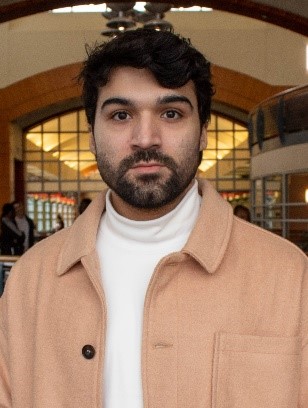
May 20, 2024: The GCCC welcomes Muhammad Haseeb Mukhtar for a 2024 summer internship with Seyyed A. Hosseini. Muhammad's summer project involves simulating wellbore leakage for the development of leakage risk profiles to help constrain risks for CO2 injection sites.
Muhammad is currently pursuing a Ph.D. in Petroleum Engineering at the University of Houston (class of 2025). Muhammad is a reservoir engineer, dedicated to understanding the migration patterns of CO2 and brine in saline aquifers for carbon storage. Muhammad is known for designing advanced multiphase, fluid-flow models to explore and analyze extended aquifer systems. He is currently working on investigating unconfined aquifer systems and developing improved boundary conditions. Muhammad’s technical interests include reservoir engineering, petroleum geology, CO2 storage, enhanced-oil recovery (EOR), hydrogeology, reservoir characterization, reservoir modeling, fluid dynamics, multiphase flow modeling, geological mapping, and geomodelling.
May 17, 2024: Ramón Gil-Egui collaborated on a Global CCS Institute report that was released to the public entitled, "Building Our Way to Net-Zero: Carbon Dioxide Pipelines in the United States." This report may be accessed here.
May 17, 2024: Argenis Pelayo provided the GCCC with an update about his M.S. research in a presentation entitled, “Impact of Subsurface Settings on CO2 Storage Leakage Risks: Implications for Financial Responsibility and the Insurance Industry.”
May 16, 2024: As part of The University of Texas at Austin designating 2024 as the “Year of AI,” Seyyed Hosseini and Dolores van der Kolk organized the Bureau of Economic Geology’s first Artificial Intelligence (AI) Workshop for Bureau researchers.
The Bureau‘s AI Workshop highlighted GCCC researchers Seyyed, Shuvajit Bhattacharya, and postdoctoral fellow Hongsheng Wang. Zoltán Sylvester provided an “Introduction to AI,” which was followed by several technical presentations by Bureau researchers and a few panel discussions about AI benchmarks, monitoring, and physics. Approximately 60 attendees from the Bureau attended this all-day event. Congratulations to all those who helped put together a wonderfully successful event that will help encourage collaborations for years to come.
May 13, 2024: Excited to announce a manuscript that Hailun Ni co-authored is available online, check out:

May 10, 2024: Tip Meckel participated in the Texas Energy Tour hosted by PowerHouse Texas and the Texas Energy & Climate Caucus, that provided a summary on innovative energy technologies in Houston, TX. State legislators and topical experts visited Port Houston, Air Alliance Houston and NETPower. Tip provided participants with perspectives on carbon capture and storage (CCS) along the Gulf Coast. If you have CCS input for the interim session of the State Legislature, please connect with Tip.
May 7, 2024: Since 2018, the Gulf Coast Carbon Center (GCCC) has been instrumental in facilitating technology transfer and providing expert guidance to Trinidad and Tobago for the development of their national Carbon Capture and Storage (CCS) program. The collaborative goals set by the country has included: 1) developing a comprehensive CO2 storage atlas to identify potential storage sites, 2) launching a Center of Excellence in CCS to foster innovation and expertise, 3) initiating a pilot project to demonstrate the practical application of CCS technologies, and 4) securing funding from the Green Climate Fund (GCF) to support CCS initiatives. Historically, the GCF has been hesitant to fund CCS projects.
In a groundbreaking move today, however, the government of Trinidad and Tobago launched the "CCUS Collaborate" initiative, funded in part by GCF readiness funds. This initiative, led by the University of the West Indies and the University of Trinidad and Tobago, marks the establishment of a dedicated center for CCUS research. The GCF Readiness Programme is set to bolster a variety of CCS-related capacity-building activities, including the development of a storage atlas for saline formations, as part of a broader project with Suriname. A heartfelt congratulations to everyone involved for their unwavering perseverance!
The journey began in 2017 with the planting of a seed at our side event at COP23 in Bonn. It is with pride that we acknowledge the stimulation and support provided by The University of Texas at Austin's Gulf Coast Carbon Center with our partner, IEAGHG. However, the lion's share of credit is due to the CCUS pioneers at the University of Trinidad and Tobago and the University of the West Indies. Their leadership has set a global precedent! Special recognition goes to the individuals who have been pivotal in this endeavor: Andrew Jupiter, David Alexander, Donnie Boodlal and Raffie Hosein. Their contributions have been instrumental in achieving this milestone.
May 5th, 2024: For a riveting read, take a look at a new Gas Science and Engineering publication by Jianqiao Leng, Alex Bump, Seyyed A. Hosseini, Tip Meckel, Zhicheng Wang, and Hongsheng Wang entitled, “A comprehensive review of efficient capacity estimation for large-scale CO2 geological storage.” Click here to read more.
May 3rd, 2024: Tim Dixon, the Director & General Manager of IEAGHG and one of the Gulf Coast Carbon Center's Honorary Senior Research Fellows presented "International Developments in Offshore Carbon Capture and Storage (CCS) Deployment" as part of the Bureau of Economic Geology's Special Seminar Series. Have a listen to Tim Dixon's presentation here. Special thanks to Katherine Romanak for hosting this presentation update.

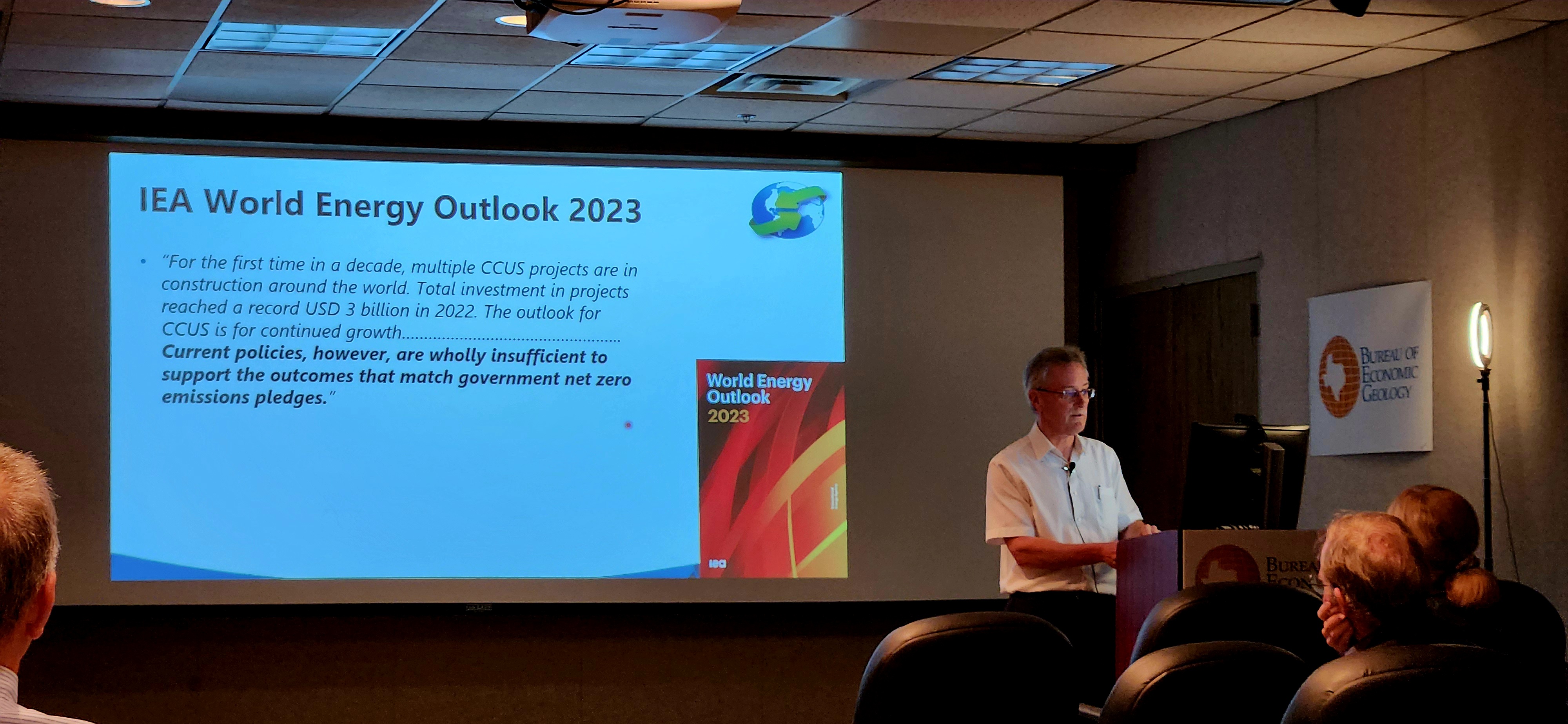
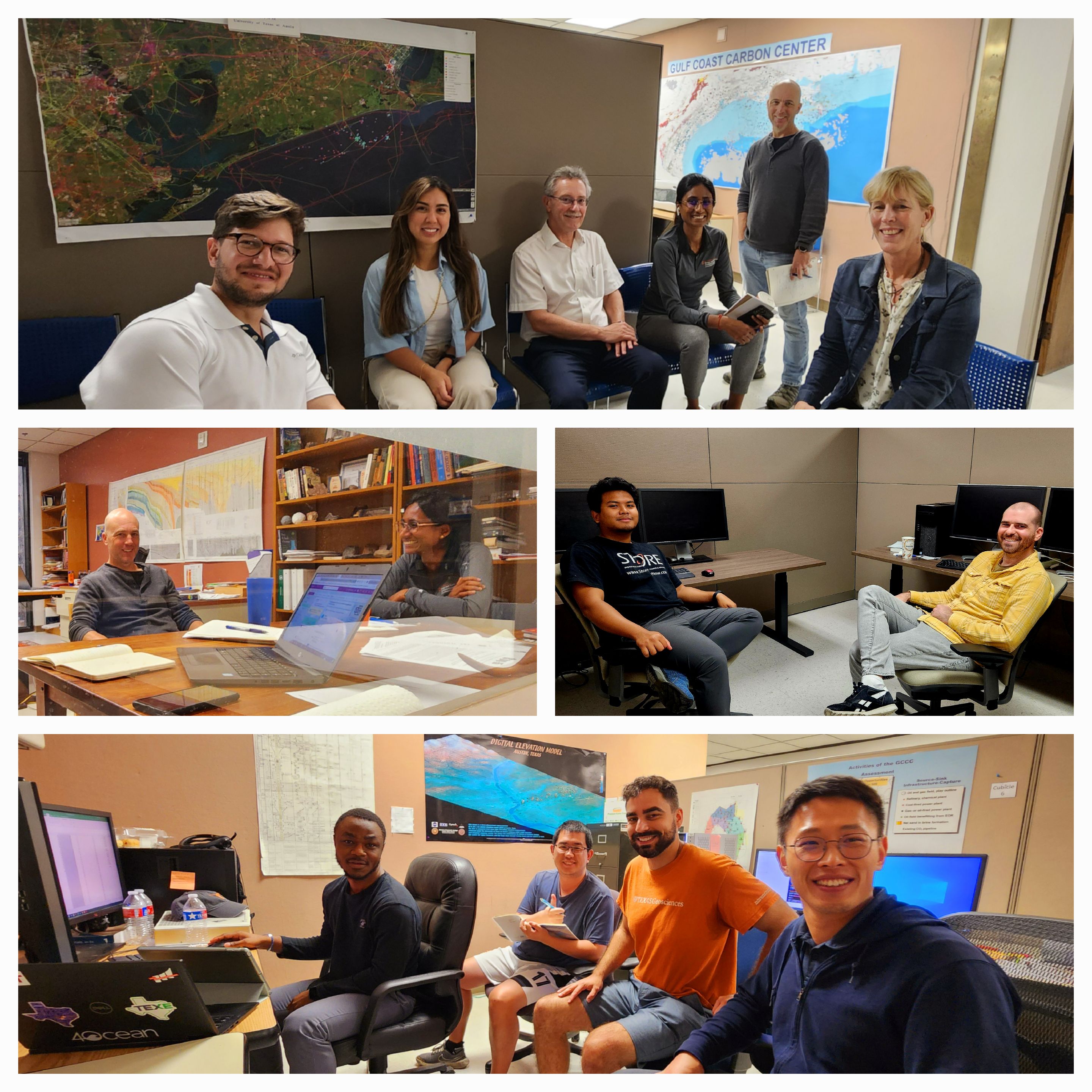
May 3rd, 2024: Happy Friday from the Gulf Coast Carbon Center, located within the Bureau of Economic Geology, Jackson School of Geosciences at The University of Texas at Austin.
As we start wrapping up another academic year, our Fridays over the last 2 semesters have been buzzing and busy! Student courses and faculty teaching schedules are typically lighter on Fridays, and a large percentage of our group is available to meet up. We typically host weekly group meetings about various technical topics in the morning and students often meet with GCCC researchers to discuss their projects in the afternoon.
Today, we had the privilege of having many visitors at the GCCC including Tim Dixon (IEAGHG) who gave a special BEG Seminar today, Charles Jenkins (CSIRO) visiting from Australia, Vanessa Núñez-López [U.S. Department of Energy (DOE)], and several others who met, mentored, and advised graduate students about their careers. Thanks to all of our visitors today!
Walking through and seeing the various conversations and meet ups between graduate students, students and postdocs, students and faculty, and international research fellows made for a great day. Photos just can't capture it all. Hearing international visitors and our researchers (a.k.a. CCS world-renowned experts) meet, listen, answer questions, mentor, and take notes from student interactions, makes the Gulf Coast Carbon Center a beautiful place to be. We have hope for the future, thanks to our visitors, researchers, postdocs, and students.
May 1–31, 2024: Charles Jenkins joins us from CSIRO, located in Canberra, Australia as one of his last visits as part of his sabbatical funding from CSIRO. During the last two years, Charles has joined us at the GCCC at the BEG for a total of six months. Over this period of time, Charles has observed the CCS landscape in the United States change a lot as new funding initiatives have been rolled out. Charles is interested in seeing what obstacles and opportunities arise as more people seriously contemplate CCS projects. Charles mentioned that the current “stress test” for CCS does not reveal any new technical issues, but he is sure there will be lessons that he can take back to Australia. Australia is on a similar trajectory with respect to CCS, but with different regulatory and financial mechanisms.
May 1, 2024: Announcing a new publication entitled, “An experimental investigation on the carbon dioxide (CO2) storage capacity of the composite confining system" by Hailun Ni, Alex Bump, and Sahar Bakhshian in the International Journal of Greenhouse Gas Control. Click here to read more.
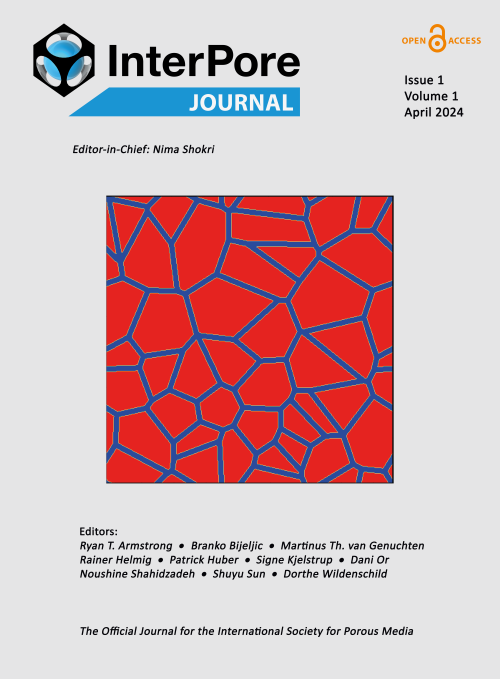
April 26, 2024: Delighted to announce that Zhichang (William) Wang, Cheng Peng, Luis Ayala, and Seyyed Hosseini have published the following paper in Interpore and have also been featured on the cover of the premiere issue, take a look here.
April 25, 2024: Alex Bump and Katherine Romanak visited BOEM headquarters in Washington, D.C. to present a workshop entitled, “Carbon Capture and Storage (CCS) 101 Day.” Approximately 200 people attended, both in person and online, from BOEM field offices for the Gulf of Mexico, Pacific and Alaska. Alex provided BOEM teams with a morning overview of CCS and an afternoon deep dive into offshore carbon storage plays. Katherine wrapped up the day with discussions about understanding environmental impacts, risks, and monitoring.
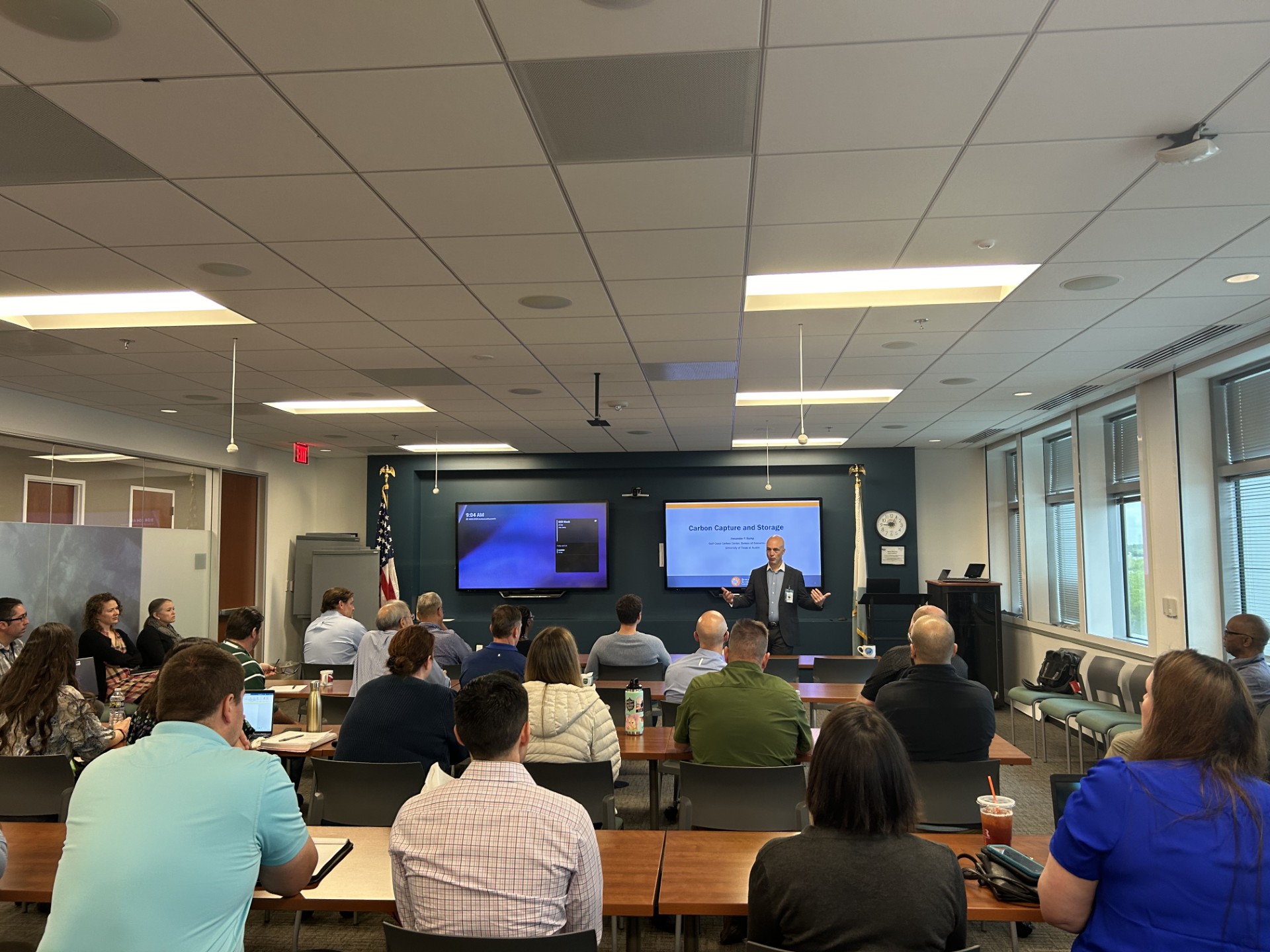
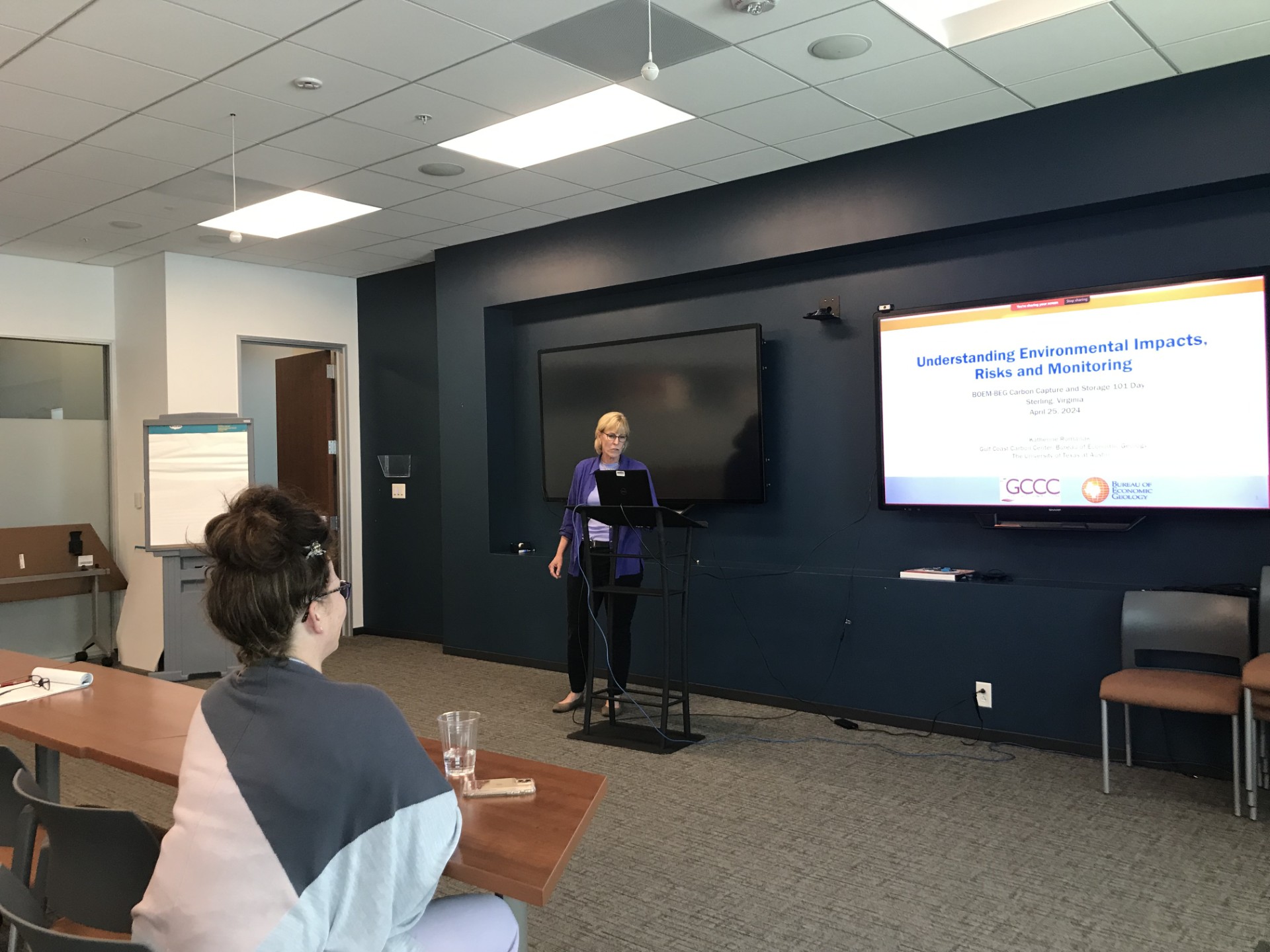
April 19, 2024: The GCCC was proud to watch several GCCC graduate students present their Master’s Theses at the Jackson School of Geosciences as part of their requirements for graduating.
- Chinemerem Clement Okezie (EER) presented “Calibrating Performance Prediction for Large-Scale Injection”
- Christopher Deranian (EER) presented “Evaluating the Financial Implications of Injectivity Risk in Compartmentalized Reservoirs for CCS”
- Ismail Halim Faruqi (EER) presented “CO2 Storage Potential in the Late Neogene Interval, Federal Offshore, Gulf of Mexico Shelf”
- Richard Larson (EER) presented “The Effect of Microscale Heterogeneity on the Transport of Carbon Dioxide in Geologic Carbon Sequestration”
- Maria Paula Madariaga Cubides (EER) presented “Assessment of CO2 Storage Potential of the Wilcox Group, Onshore Texas, USA”
In addition, Jose Ubillus (PGE) also handed in his Master’s thesis entitled, “Laboratory Experiments and Modeling to Evaluate Critical CO2 Saturation for Geologic Carbon Storage.”
Congratulations to all of our students who have been busy wrapping up their projects this year!
April 19, 2024: The Gulf Coast Carbon Center's researcher, Alex Bump, summarized "Composite Confining Systems: Rethinking Petroleum Seals for Carbon Dioxide (CO2) Storage" recently as part of the Bureau of Economic Geology’s Seminar Series. A description of his presentation and a recording can be found here.
Alex with co-authors, Sahar Bakhshian, Hailun Ni, Sue Hovorka, Iulia Olariu, Dallas Dunlap, Seyyed Hosseini, and Tip Meckel notably won the 2023 Bureau's publication of the year award for this research that was published in the International Journal of Greenhouse Gas Control, v. 126, p. 1–12.
Thanks to the Bureau of Economic Geology's Seminar Series at the Jackson School of Geosciences at The University of Texas at Austin for hosting Alex. Congratulations to Alex and the GCCC team for this great achievement.
April 19, 2024: As a Churchill Trust Fellow, Nils Hay with the Mid West Development Commission of Western Australia, joined us at the Gulf Coast Carbon Center’s weekly meeting to discuss "Carbon Capture and Storage (CCS) in the (Australian) Mid-West." To read more about Nil's adventure, click here.
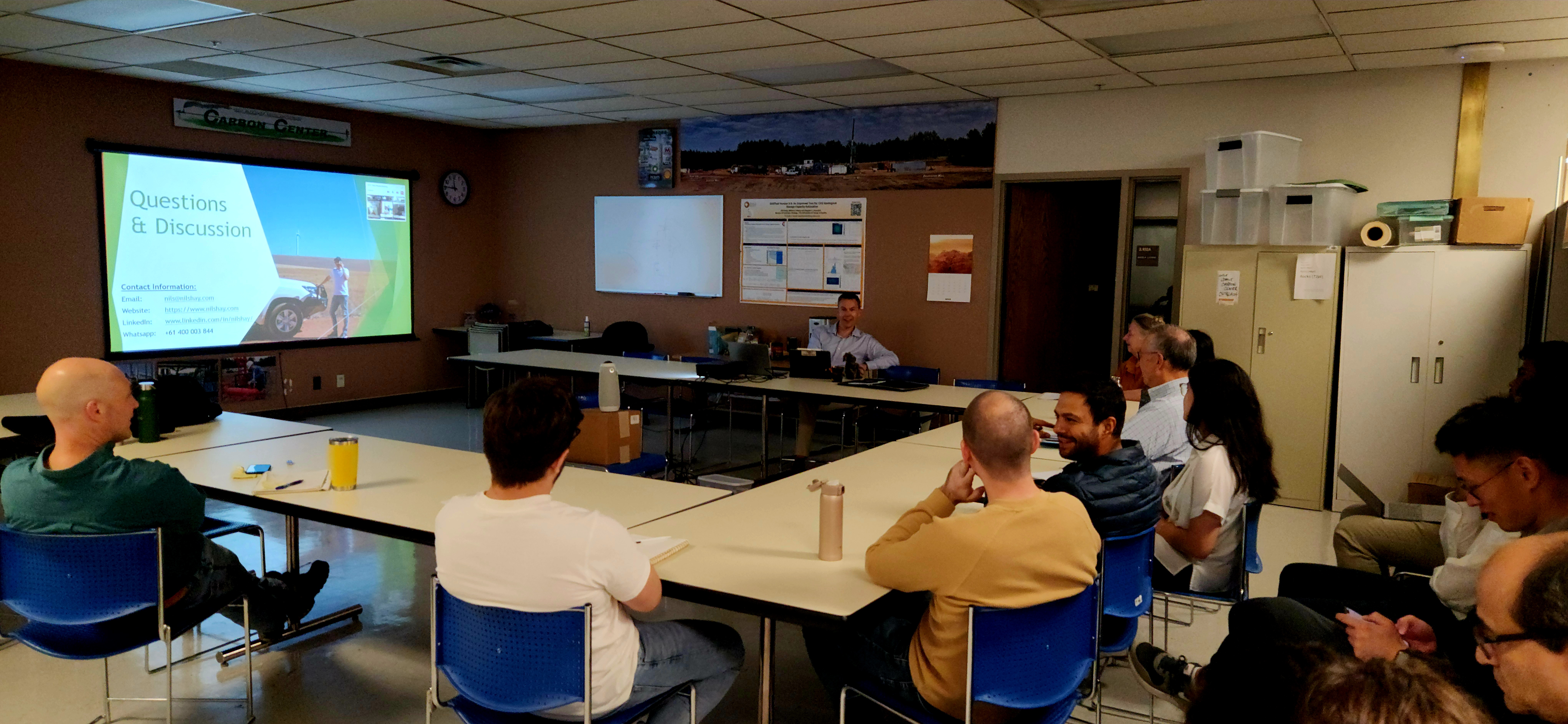
April 15, 2024: Congratulations to Shuvajit Bhattacharya, Hailun Ni, and Nicola Tisato (from the Jackson School of Geosciences, Department of Earth and Planetary Sciences) for being selected to receive a 2024 Strategic Energy Seed Grant from the University of Texas at Austin’s Energy Institute. Out of 61 proposals, this group was 1 of 12 proposals selected. These funds will help to kick off their research project entitled, “Lab-to-field scale time-lapse seismic monitoring for carbon storage.”
April 11–12, 2024: Zhicheng (William) Wang will attend “Breaking the Barrier: A Conference on Integrating Reserves and Emissions” hosted by Ryder Scott and Combocurve in Houston, TX.
April 11, 2024: The GCCC will meet with a visitor from U.S. Department of Energy.
April 11, 2024: Ramón Treviño attended, and presented, at the Texas American Shore and Beach Preservation Association’s (ASBPA) 2024 Texas Chapter Coastal Symposium. Ramón presented “Carbon Capture and Sequestration (CCS): Recent Regional Gulf of Mexico Developments” at the symposium, which was held at the Harte Research Institute for Gulf of Mexico Studies at Texas A&M University Corpus Christi.
April 10–12, 2024: GCCC Representatives will attend and present at GEOGULF2024 in San Antonio, TX. Alex Bump will chair a morning session entitled, Geologic Carbon Storage on the Gulf Coast, on April 12th with the following presentations from our group:
08:00 Maria Paula Madariaga and Carlos A. Uroza: Assessment of the Wilcox Group for CO2 storage potential, in an area onshore South Texas
08:25 Alex Bump: Pressure Space: The key subsurface commodity for CCS
08:50 Timothy Mcmahon, Shuvajit Bhattacharya, Qiqi Wang, and Katherine Yut: Potential for carbon sequestration in depleted Eagle Ford Shale Reservoirs
09:15 Jose Ubillus Alcivar: Laboratory experiments and modeling of the impact of small-scale heterogeneities on geologic carbon storage
April 10, 2024: Ramón Gil-Egui attended a joint Southern States Energy Board and Center for Carbon Management in Energy (CCME) CCUS Commercialization Acceleration Consortium Meeting at the University of Houston in Houston, Texas.
April 10, 2024: Katherine Romanak and Sue Hovorka were invited to provide remarks on panels for CO2NNECT: CO2 Conversations held in Austin, TX. Katherine will be speaking on “The Safety of Carbon Dioxide Storage” session of the agenda to help answer common safety questions and dispel myths about geologic storage. Sue will be on a panel for a Q&A session following a CO2 Storage Insurance Discussion.
April 9th, 2024: Congratulations to Alex Bump and co-authors Sahar Bakhshian, Hailun Ni, Sue Hovorka, Iulia Olariu, Dallas Dunlap, Seyyed Hosseini, and Tip Meckel for winning the 2024 Tinker Family Bureau of Economic Geology Publication Award. Their paper entitled, "Composite Confining Systems: Rethinking Petroleum Seals for Carbon Dioxide (CO2) Storage" was selected as the Bureau's publication of the year for 2023!
Special thanks to Scott W. Tinker and his family, for creating such a special award for our researchers at the Bureau of Economic Geology, Jackson School of Geosciences at The University of Texas at Austin.
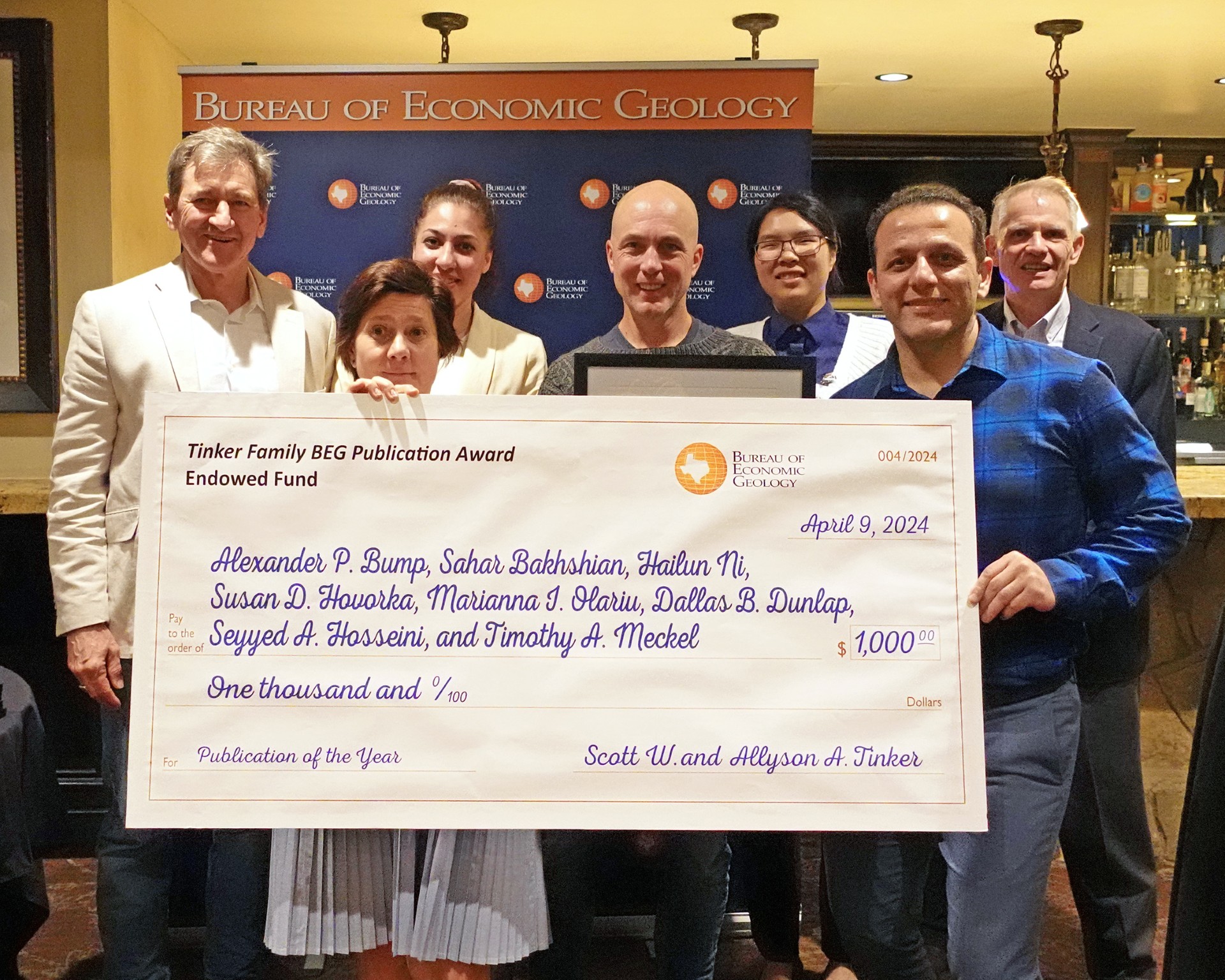
April 9, 2024: The GCCC’s Sue Hovorka will attend DAC Dialogues: Bridging Policy and Innovation for Direct Air Capture (DAC) Deployment hosted by the Great Plains Institute and the Carbon Capture Coalition in Austin, TX. DAC Dialogues is a 1-day long session that “aims to accelerate the deployment of DAC technologies by fostering synergies between state and federal policy and industry implementation efforts.”
April 5, 2024: Susan Hovorka presented a virtual overview of carbon capture and storage (CCS) to the Texas Farm Bureau.
April 5, 2024: Katherine Romanak provided the GCCC Team with a presentation entitled, “Environmental Baselines: Can’t Live with Them, Can’t Live without Them” for the GCCC’s weekly meeting series.
April 1–3, 2024: Dr. Tip Meckel participated in the ISEM Energy Round Table in Galveston. Tip provided an evening keynote on the current CCS landscape, focusing on project experience and opportunities for project development, with emphasis on the Gulf Coast and offshore Gulf of Mexico.
March 29, 2024: As part of the Bureau of Economic Geology’s Seminar Series, Hailun Ni presented "Using Sand Tank Experiments to Model CO2 Plume Migration and Trapping," which was recorded and can be watched online here. To learn more about Hailun’s lab, please check out the Sandbox Lab.
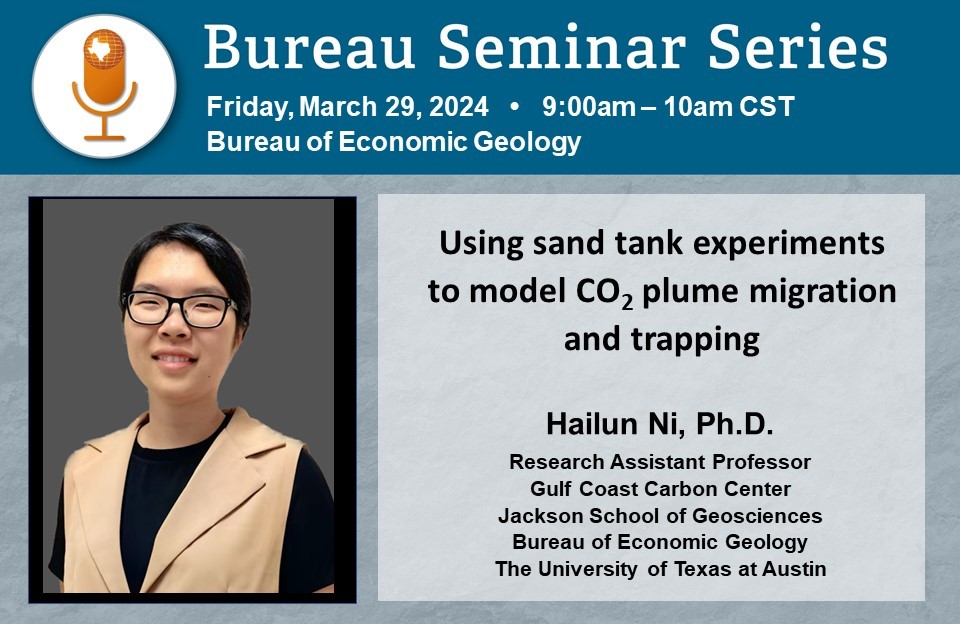
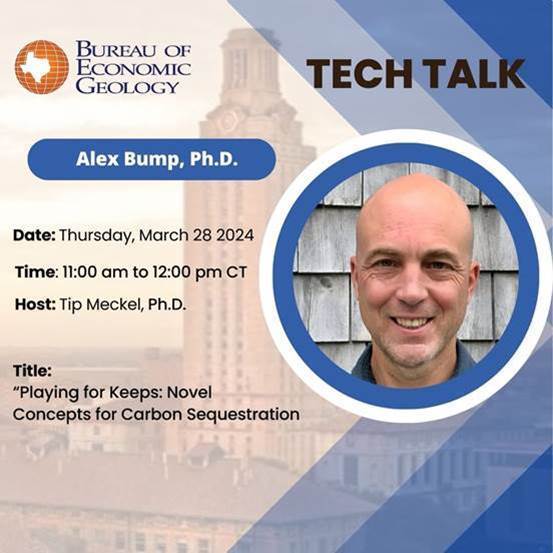
March 28, 2024: Alex Bump provided the Bureau of Economic Geology with an overview of his research and thoughts for geologic carbon storage, the variables that matter, and the play for storage. In his presentation entitled, Playing for Keeps: Novel Concepts for Carbon Sequestration, Alex outlines how carbon storage is fundamentally different from classic petroleum plays. As you may know, it is the same subsurface, but there are different goals and different constraints that conspire to create a very different idea of what “good” prospects are. To have a listen to Alex’s talk, have a listen here.
March 27, 2024: Katherine Romanak provided a virtual keynote presentation about Monitoring, Measurement and Verification (MMV) Principles: Principles and Objectives to the Emissions Reduction as part of Alberta’s Carbon Capture and Storage Executive Series.

March 26, 2024: The Bureau of Economic Geology's Gulf Coast Carbon Center (GCCC) had a strong presence for UT’s Energy Week, hosted by the UT Energy Institute. GCCC presentations included the following on this date:
Combining Quantitative Leakage Risk Assessment with Financial Liability for CO2 Geologic Storage - Sahar Bakhshian and Sue Hovorka (Bureau of Economic Geology, Jackson School of Geosciences) and James Dyer (Department of Information, Risk, and Operations Management; McCombs School of Business)
Self-Sealing Capacity of Wellbore Cement Under Geologic CO2 Storage – presented by Richard Larson with co-authors: Charles Werth and Maria Juenger (Department of Civil, Architectural and Environmental Engineering; Cockrell School of Engineering) and Sahar Bakhshian (Bureau of Economic Geology, Jackson School of Geosciences)
Laboratory Experiments & Modeling to Accurately Evaluate Critical CO2 Saturation for Geologic Carbon Storage - presented by Jose Eduardo Ubillus with co-authors: Hailun Ni, Sahar Bakhshian, (Bureau of Economic Geology, Jackson School of Geosciences) and David DiCarlo (Department of Petroleum and Geosystems Engineering, Cockrell School of Engineering)
Long-term Surveillance of Plugged and Abandoned Wells for Immediate Detection of CO2 Leakage in Geologic Carbon Storage Sites - Sahar Bakhshian, Sue Hovorka and Michael Young (Bureau of Economic Geology, Jackson School of Geosciences)
March 23–31, 2024: Dr. Tip Meckel led an offshore high-resolution 3D (HR3D) seismic survey in the Gulf of Mexico. The DOE-funded project re-visited a site where Tip and team collected a HR3D seismic dataset in 2013. This site has shallow gas anomalies, and the recent survey will allow an assessment of 4D monitoring capabilities for these types of shallow gas anomalies that are analogs for potential CO2 leakage from deep-storage reservoirs. Other UT participants included the Bureau of Economic Geology’s Dallas Dunlap, UTIG's Dan Duncan, and GCCC graduate student Previna Arumugam.
March 21, 2024: Sue Hovorka presented “The SECARB early test at Cranfield, what we knew in 2009 and what has changed since then” at the GCCC’s weekly meeting. Thank you, Sue!
March 19–21, 2024: Special thanks to Carlos Uroza for representing the Bureau of Economic Geology’s Gulf Coast Carbon Center by participating in the symposium, entitled the Role of Geosciences in Carbon Storage, which was held in Mumbai, India. Carlos was invited by the Society of Exploration Geophysicists (SEG) Asia-Pacific Chapter to provide a presentation on the potential for CO2 storage in the Gulf of Mexico area. Carlos presentation was held on March 20th and he chaired sessions with the theme of Seismic Reservoir Characterization on March 20th and Monitoring on the 21st.
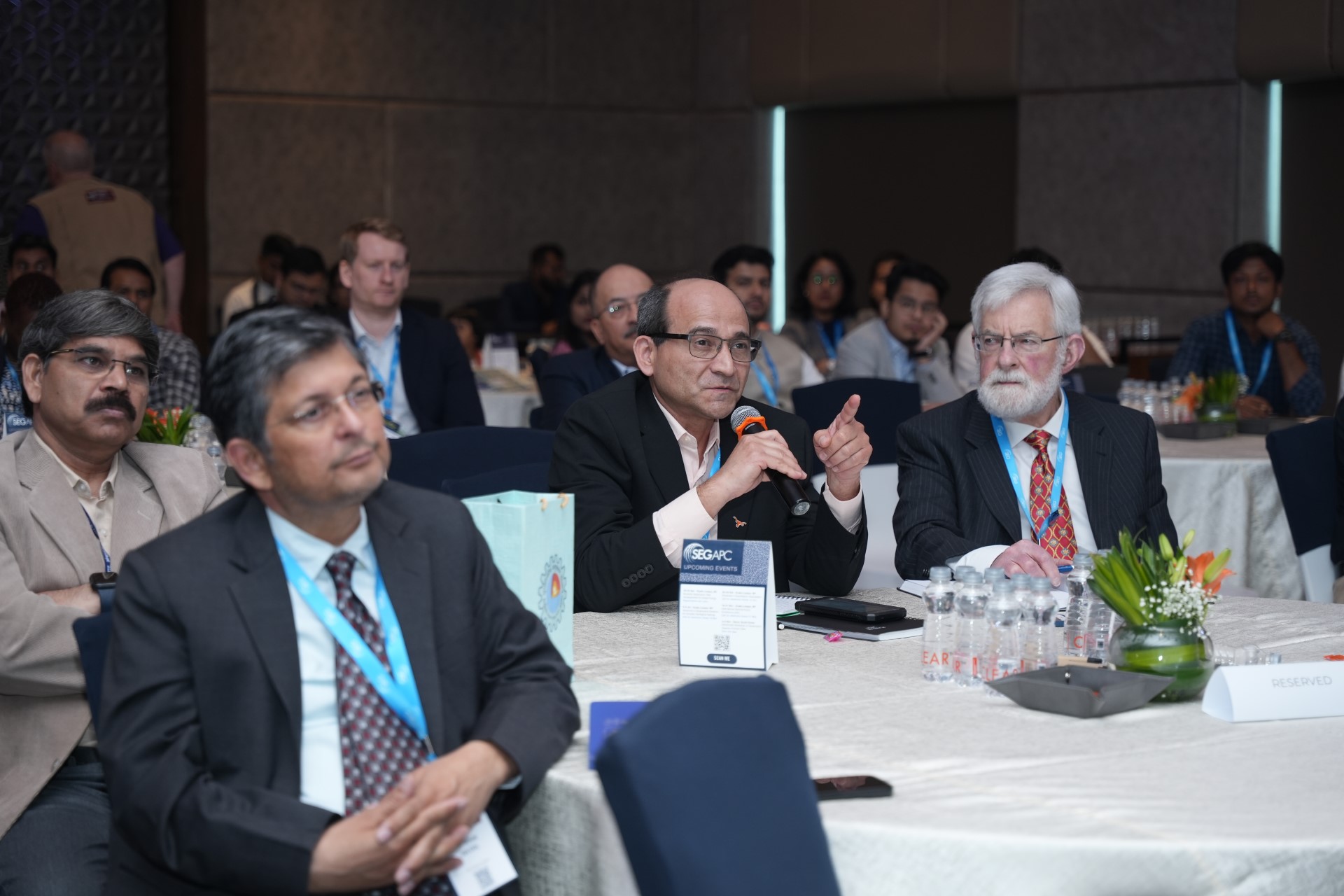
March 18, 2024: A group of GCCC graduate students including Ismail Faruqi, Richard Larson, and Chinemerem Okezie, competed with UTIG’s undergraduate student Jake Margoshes, in the Imperial Barrel Award Program (IBA) competition. This was a historic year, since this was the first IBA that featured carbon capture and storage (CCS) projects.
The team was coached by Dr. Tip Meckel and the grouped worked on a project in the Otway Basin, located along the southern coast of Australia. Special thanks to industry mentors Chris Freeman (Shell), Nathan Robinson (Sempra Infrastructure), and Jonathan Osmond (DNV) for their mentorship, time, and effort.
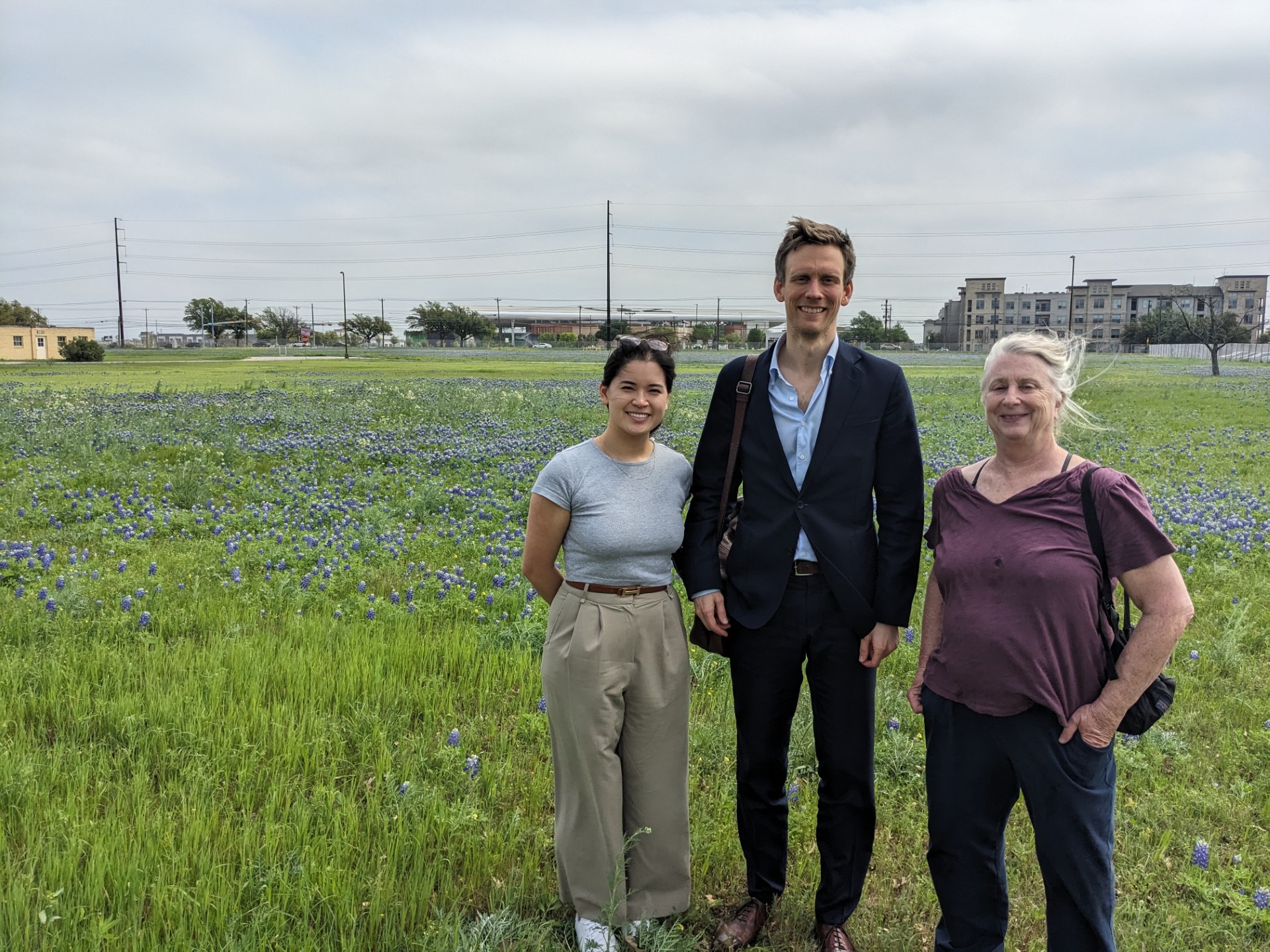
March 15, 2024: Ola Terjeson Miljeteig, VP of CCS Solutions from Equinor in Stavanger, Norway, visited the GCCC and discussed "Equinor's Perspectives on Business, R&D, and Opportunities in CCS" at our weekly meeting.
March 14th, 2024: Excited to announce that the GCCC’s Alex Bump and Sue Hovorka led a workshop associated with and, following the SPE-AAPG-SEG Carbon Capture and Storage (CCUS) Conference at the George R. Brown Convention Center in Houston, TX. Alex and Sue provided a 1-day long short course, between 8:30 am to 5:00 pm entitled, Characterizing, Permitting, and Monitoring Novel Storage Plays Optimized for Saline Reservoirs. Click here for a .pdf of the short course webpage.
CANCELLED: Sue Hovorka and Carlos Uroza planned to co-lead a short course with Blake Mock, Ryan Rupert, and Daisy Gallagher, entitled, Introduction into CCUS Whole Core Acquisition, which was cancelled due to registration numbers.

March 13, 2024: The Gulf Coast Carbon Center’s Texas-Louisiana Carbon Management Community (TXLA CMC), officially emailed the first quarterly newsletter as well as the latest copy of the TXLA CMC phone book out to members. Would you like to become a community member of TXLA CMC ? If so, complete the registration form here.
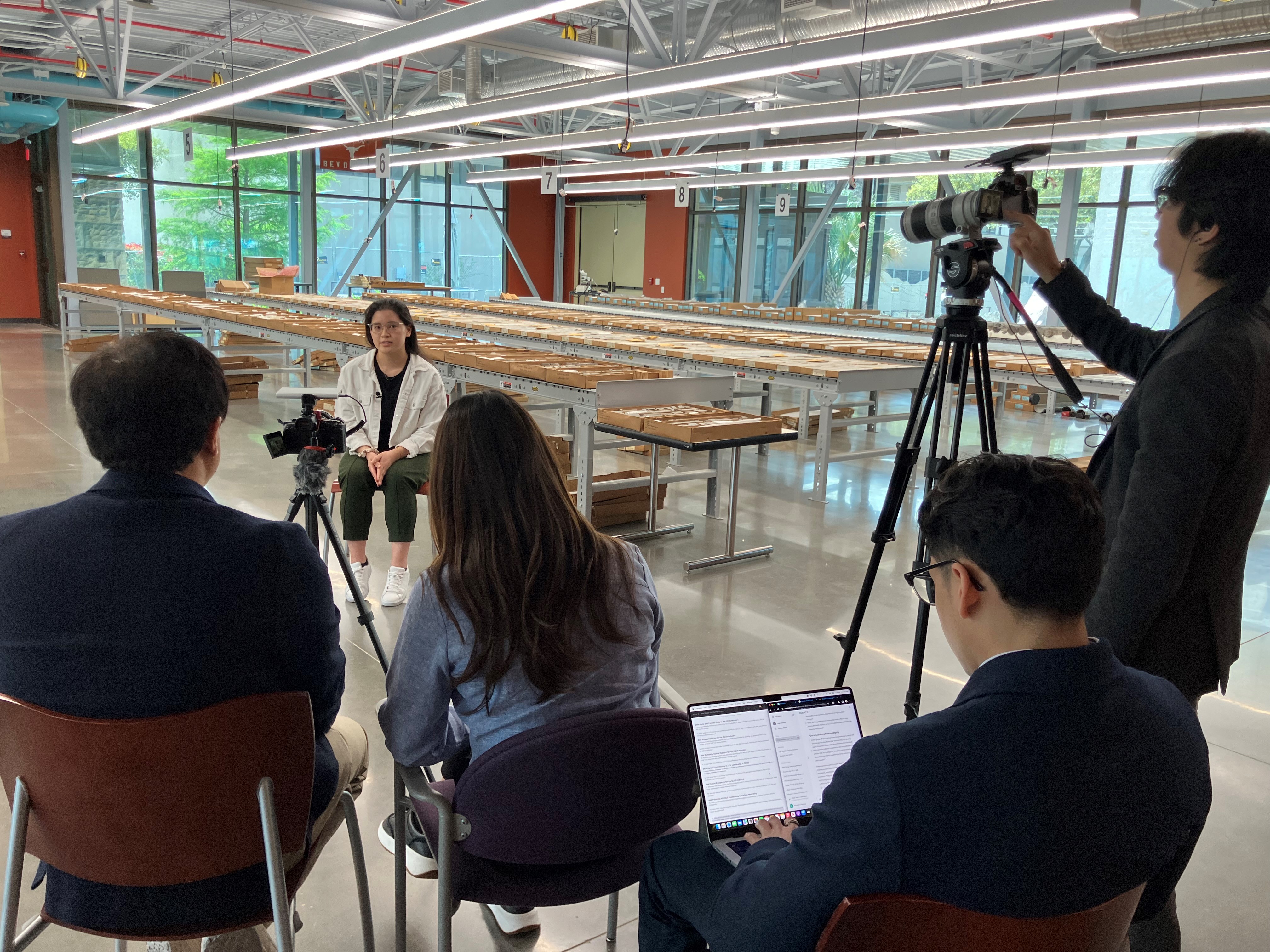
March 12, 2024: Susan Hovorka and Angela Luciano, from the Bureau of Economic Geology’s Gulf Coast Carbon Center, hosted a film crew from Korea Education Broadcasting System (EBS) in South Korea. They are filming an episode entitled, The Era of Decarbonization to showcase how various nations are responding to the challenges and opportunities of the energy transition and they wanted to ask the GCCC about carbon capture and storage (CCS).
March 11–13, 2024: The GCCC’s research group had a large impact at the 2024 SPE-AAPG-SEG Carbon Capture and Storage (CCUS) Conference at the George R. Brown Convention Center in Houston, TX this year:
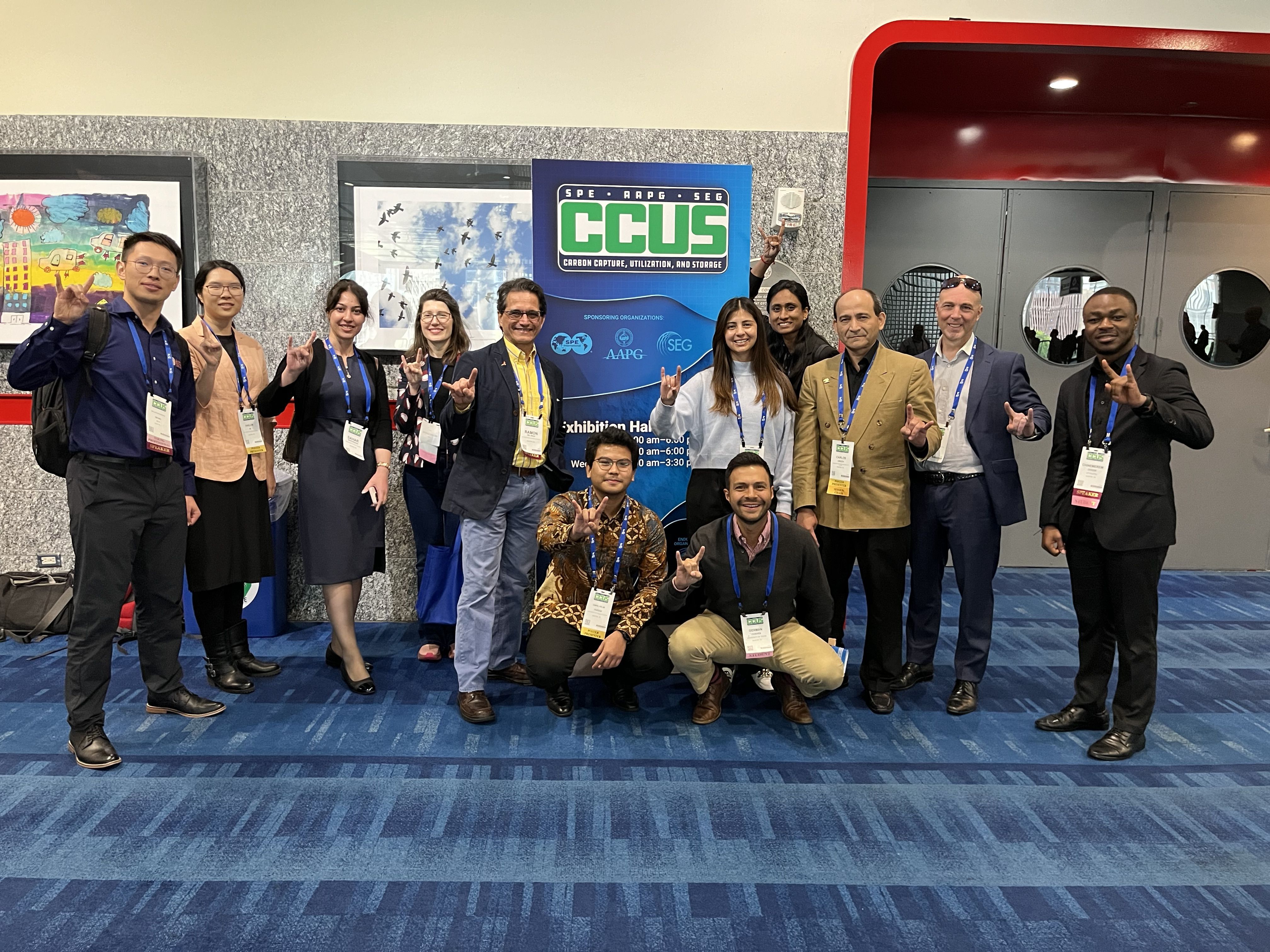
Events on Monday, March 11
1:40 pm - Geology and Reservoir Simulation-guided Time-lapse Seismic Modeling for CO2 Plume Detection in an Onshore CCS Site: Lessons Learned by S. Bhattacharya*1, S. Bakhshian1, B. Gremillion1 (1. The University of Texas at Austin), Theme 6: Monitoring Plan Optimization
1:40 pm - Impact of Small-Scale Heterogeneity on Field-Scale Simulations of CO2 Geologic Storage by J. E. Ubillus1, H. Ni2, S. Bakhshian2, D. DiCarlo1, T. Meckel2 (1. Hildebrand Petroleum and Geosystems Engineering, University of Texas at Austin; 2. Bureau of Economic Geology), Theme 2: Dynamic Simulations I
1:40 pm - Environmental and Financial Risk Assessment of Leakage in Geologic CO2 Storage by S. Bakhshian*1, A. Farhadinia1, S. Hovorka1 (1. University of Texas at Austin), Theme 3: Capacity Integrity and Risk III
Sessions Co-Chaired by GCCC Representatives:
- 9:25 am - Theme 9: Data Integration and Assessment by Shuvajit Bhattacharya & Yanhua Yuan
- 11:00 am - Theme 3: Caprock Integrity and Risk II by Erkan Ay & Sahar Bakhshian
- 1:40 pm - Theme 2: Dynamic Simulations I by Esuru Okoroafor & Seyyed Hosseini
- 3:40 pm - Theme 2: Dynamic Simulations II by Seyyed Hosseini & Lisa Lun
Events on Tuesday, March 12
1:40 pm - How Close is Too Close? The Importance of Pressure Space for Storage Project Development by Alex Bump* (Bureau of Economic Geology, University of Texas at Austin), Theme 1 Storage Resources and Capacity 1
2:00 pm - Calibrating Performance Prediction for Large-Scale Injection by C. C. Okezie*1, A. Bump2, S. Hovorka2 (1. Energy and Earth Resources, University of Texas at Austin; 2. Bureau of Economic Geology), Theme 1 Storage Resources and Capacity I
2:20 pm - Impact of Societal Risks on CO2 Storage Capacity of Proposed Storage Sites by R. Gil-Egui*2, J. E. Ubillus1, S. Hovorka2 (1. Hildebrand Petroleum and Geosystems Engineering, University of Texas at Austin; 2. Bureau of Economic Geology), Theme 8: ESG and Stakeholder Engagement
2:40 pm - Advanced CO2 Storage Capacity Estimation with EASiTool V.5 by Z. W. Wang1, S. Hosseini1 (1. Bureau of Economic Geology, UT Austin), Theme 1 Storage Resources and Capacity I
Sessions Co-Chaired by GCCC Representatives:
- 9:25 am - Theme 1: Injectivity Challenges by Qing Chen & Sahar Bakhshian
- 9:25 am - Theme 9: Novel Machine Learning Approaches in CCS by Matthias Imhof & Seyyed Hosseini
- 10:55 am - Theme 2: Analytical Models by Seyyed Hosseini & Sahar Bakhshian
- 10:55 am - Theme 3: Leakage Assessment II by Carlos Uroza & Erkan Ay
- 1:35 pm - Theme 2: CO2 Rock Interaction/Geochemistry by Mike Formolo & Sahar Bakhshian
- 3:35 pm Theme 1: Storage Resources and Capacity II by Carlos Uroza & Alex Bump
Events on Wednesday, March 13
Mid-Day Posters:
External and Internal Controls on Petrophysical Heterogeneities of the Wilcox Group, Onshore Texas: Implications on Safe CO2 Storage by S. Bhattacharya*1, C. A. Uroza1, Y. Li1, S. Hovorka1(1. The University of Texas at Austin), Theme 1: Subsurface Storage and Site Selection
Assessing the Potential for CO2 Sequestration in the Chandeleur Sound Area, Offshore Louisiana, USA by C. A. Uroza1, Y. Li1, S. Hovorka1(1. Bureau of Economic Geology), Theme 1: Subsurface Storage and Site Selection
Using Sand Tank Experiments to Model and De-Risk CO2 Geological Storage by H. Ni*1, A. Feitz2, E. Tenthorey2, H. Nourollah3, S. Hovorka1(1. Bureau of Economic Geology, The University of Texas at Austin; 2. Geoscience Australia, Canberra; 3. CO2CRC Limited, Melbourne), Theme 3: Subsurface Risk Assessment
Evaluating the Potential for CO2 Storage in Federal Waters of Gulf of Mexico Shelf by I. Faruqi*1, A. Bump1, S. Hovorka1, C. A. Uroza1(1. Bureau of Economic Geology, University of Texas at Austin)
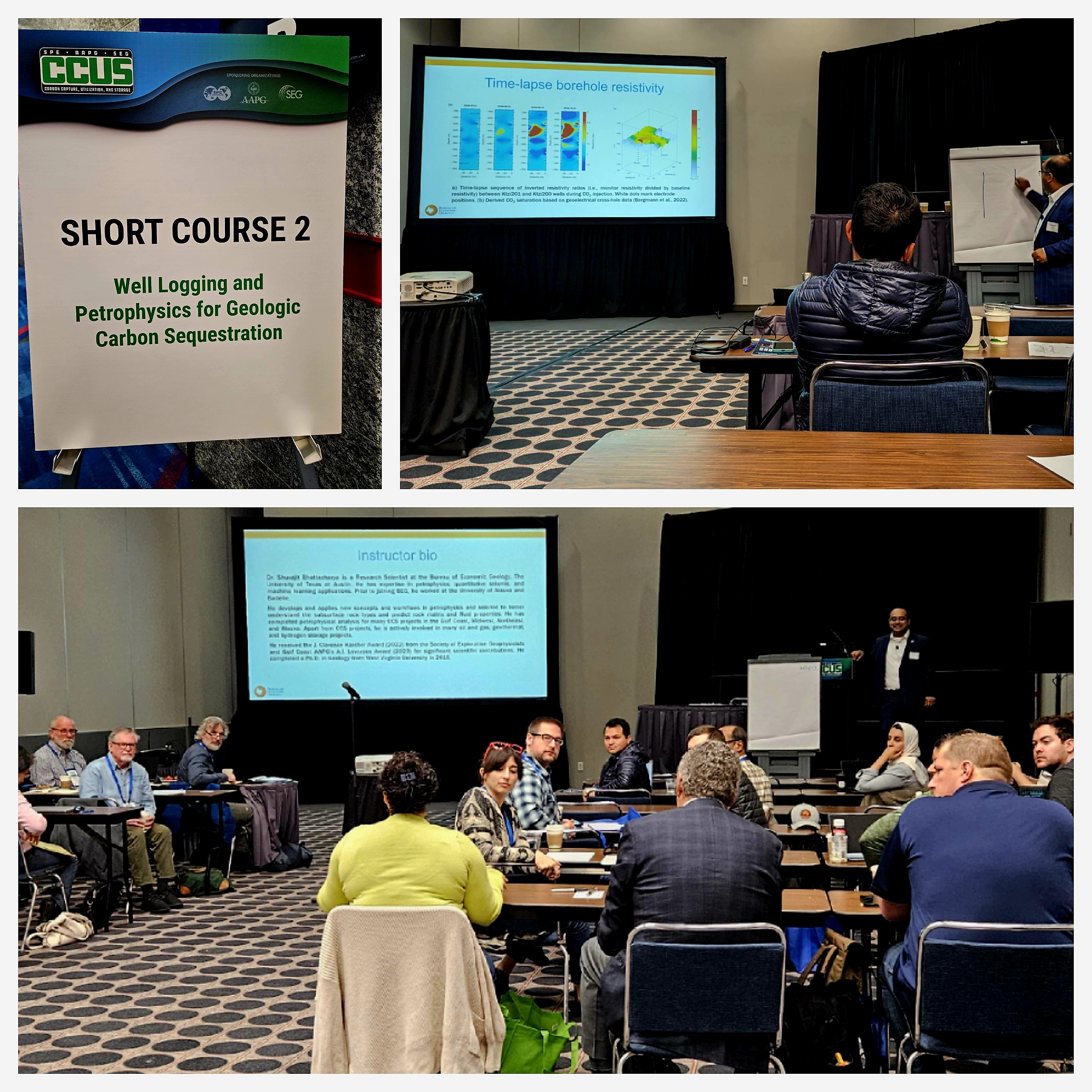
March 10, 2024: Excited to announce that the GCCC’s Shuvajit Bhattacharya led a workshop associated with and, leading up to the SPE-AAPG-SEG Carbon Capture and Storage (CCUS) Conference at the George R. Brown Convention Center in Houston, TX. Shuvajit led a 1-day short course between 8:30 am to 5:00 pm, entitled Well Logging and Petrophysics for Geologic Carbon Sequestration. Click here for a .pdf of the short course webpage.
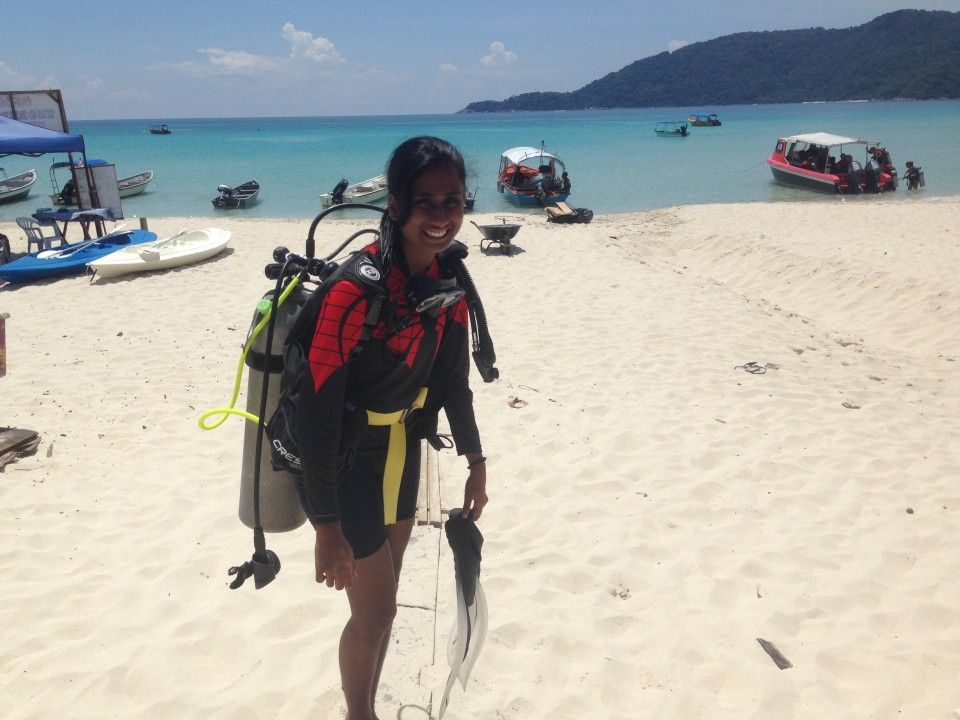
March 8, 2024: Congratulations to our Master’s Student, Previna Arumugam, for being selected to take part in the prestigious IEAGHG International CCS Summer School that will be held in Darwin, Australia in June of 2024. During this course, an international group of 45 students from study carbon capture and storage (CCS) for a week, complete activities, and take a field trip. We are also pleased that Dr. Katherine Romanak will continue as one of the course instructors.
Each year, the location of this school moves around the world, and the program has taken place in various countries across Europe, Australia, Asia and North America. IEAGHG arranges to have experts participate from all over the world, and they take pride having a diverse range of students from a variety of technical backgrounds. The IEAGHG summer school currently has 708 alumni representing 60 countries.
To read more about Previna, we have included a recent LinkedIn discussion (pdf) that Previna wrote about “Conquering the Depths: A Dive into Fear and Triumph.” Congratulations, Previna!
March 8, 2024: At the GCCC’s weekly meeting, Dolores van der Kolk provided a presentation entitled, Sedimentary Facies & Heterogeneity: Implications for CCS.
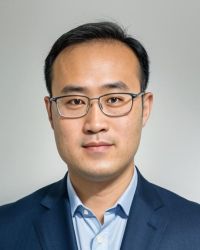
March 4, 2024: The GCCC welcomes Dr. Ruichang Guo as a new Postdoctoral Fellow who will be working with Dr. Seyyed Hosseini. Ruichang received his Ph.D. degree in Mining Engineering from Virginia Tech in 2022. His research focuses on multiphase flow in porous media, geological carbon sequestration, underground hydrogen storage, machine learning, hydraulic fracturing, and horizontal drilling technology. Ruichang worked as a senior researcher on ultradeep horizontal drilling technology in SINOPEC for six years. Ruichang also holds a Ph.D. degree in petroleum engineering and a BS degree in Mechanical Engineering from China University of Petroleum. He currently serves as an Associate Editor for the journal of Geoenergy Science and Engineering. Welcome to the GCCC, Ruichang!
February 26–28, 2024: GCCC Representatives Angela Luciano, Sue Hovorka, and Seyyed Hosseini attended the 2024 Groundwater Protection Council Meeting in Oklahoma City, OK.
On February 26, Sue co-chaired a Class VI Work Groups Training Workshop Training/Curriculum Development Workgroup with Corey Shircliff (Louisiana DNR), and Todd Boesiger (Nebraska OGCC).
On February 28, Seyyed co-chaired a Breakfast Meeting: Complementing the CCS Class VI Well Permit Process with DOE-NETL's SMART Initiative Tools & Workflows with Hema Siriwardane (US Department of Energy), Hari Visvanathan (Los Alamos National Laboratory)
Angela provided a presentation on Class I UIC Documenting Long-Term Operational Success of Class I Wells in the US Gulf Coast to Build Confidence in the UIC Program.
Sue provided a presentation on Class VI UIC & CCUS Issues Related to Multiple Wells Perforated in the Same Injection Zone.
February 24, 2024: Special thanks to the GCCC’s Sue Hovorka and Ramón Gil-Egui for volunteering at STEM Girl Day at UT Austin, hosted by UT Austin’s Women in STEM (WiSTEM). Sue and Ramón joined a group, organized by Linda McCall, from the Bureau of Economic Geology to help with Water and Rocks: A Water-Flow Demonstration.
At this event, ~10,000 K-8th graders and over 5,000 parents, Girl Scout Troop Leaders, Teachers, and other Chaperones participated. The Bureau’s team of volunteers taught groundwater concepts by showing attendees how water flows through aquifer systems and rivers. Attendees were also able to meet our geoscientists and learn about different career paths in Earth Sciences. Thanks to Carson Werner for photos from the event.
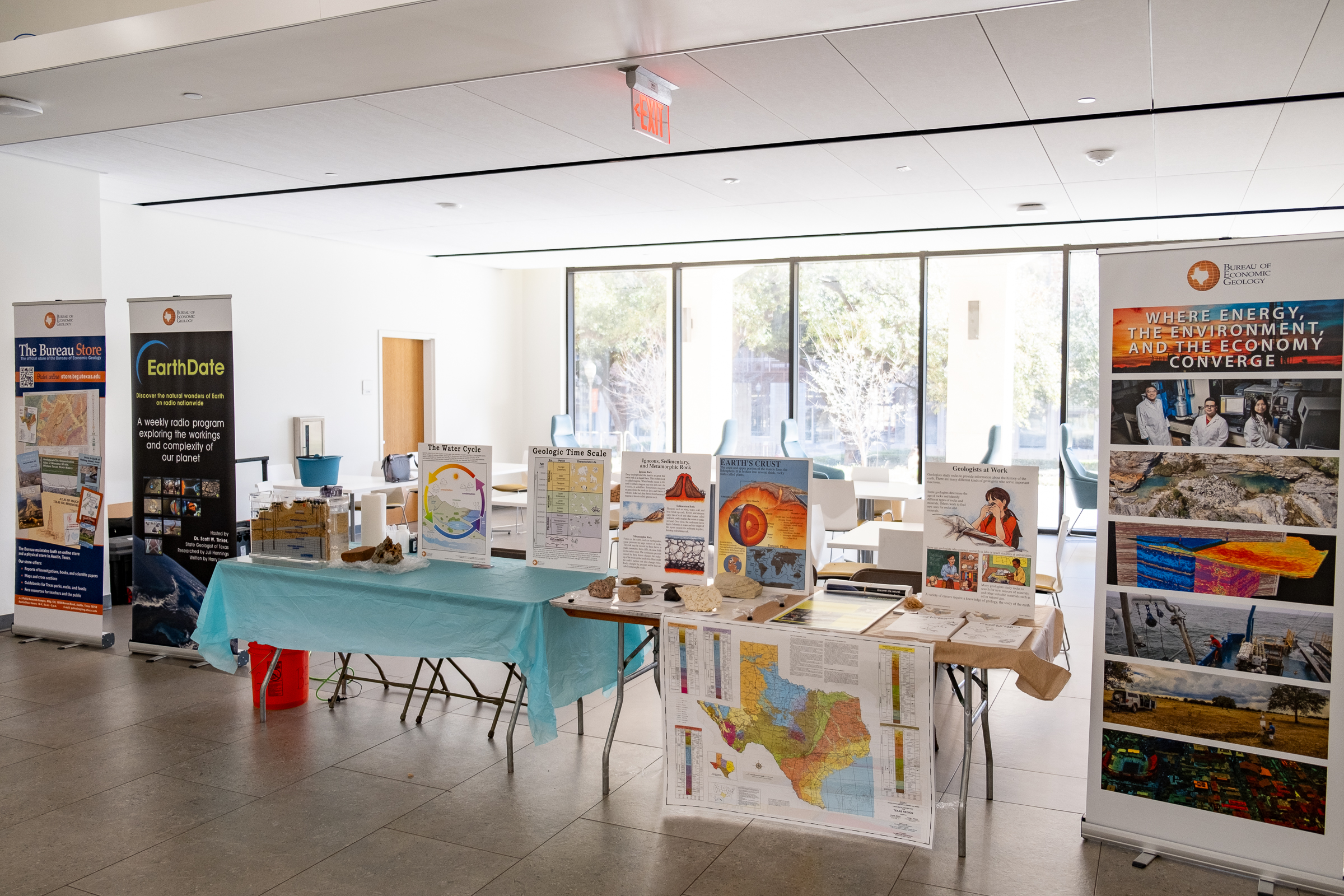
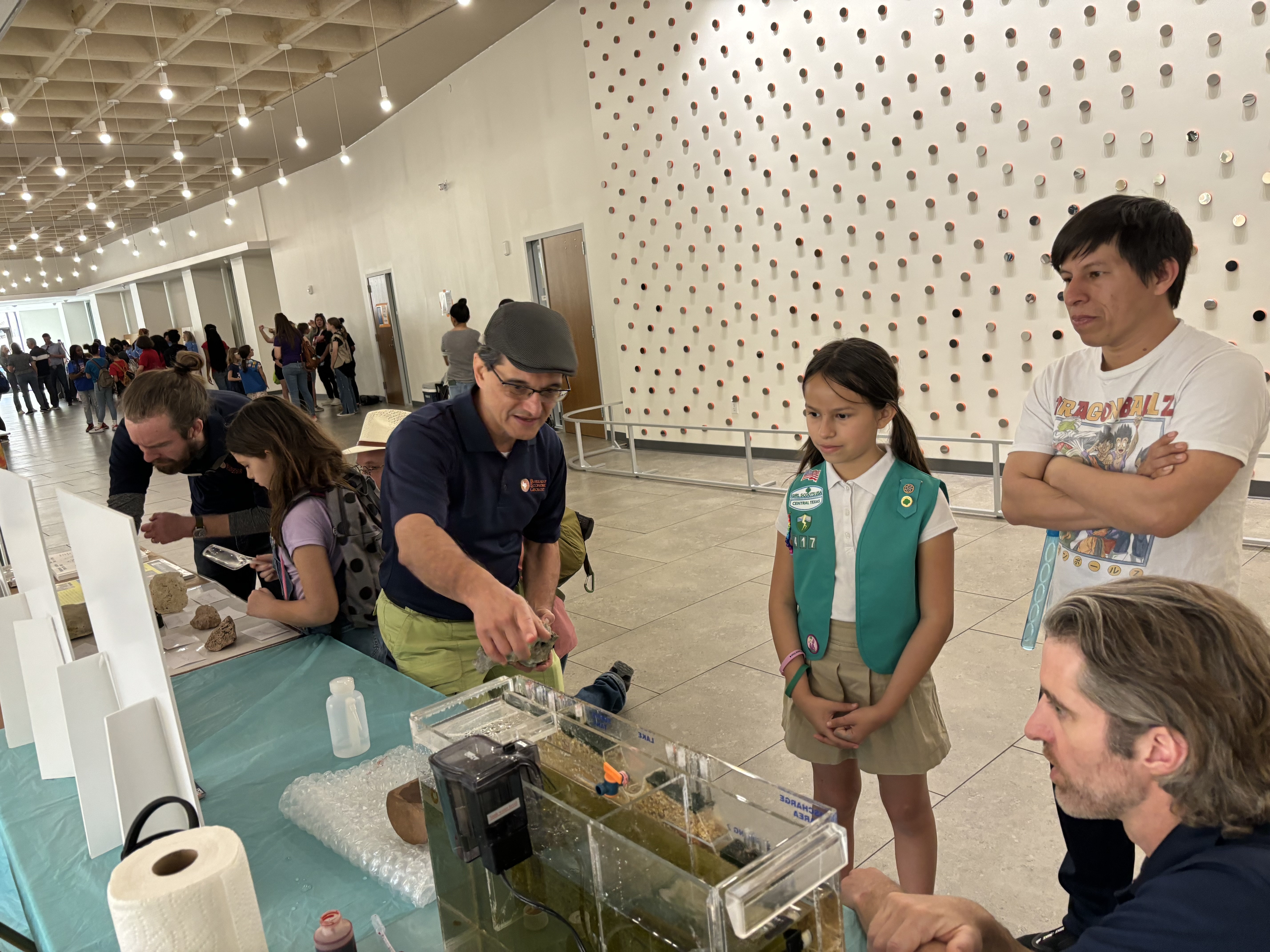
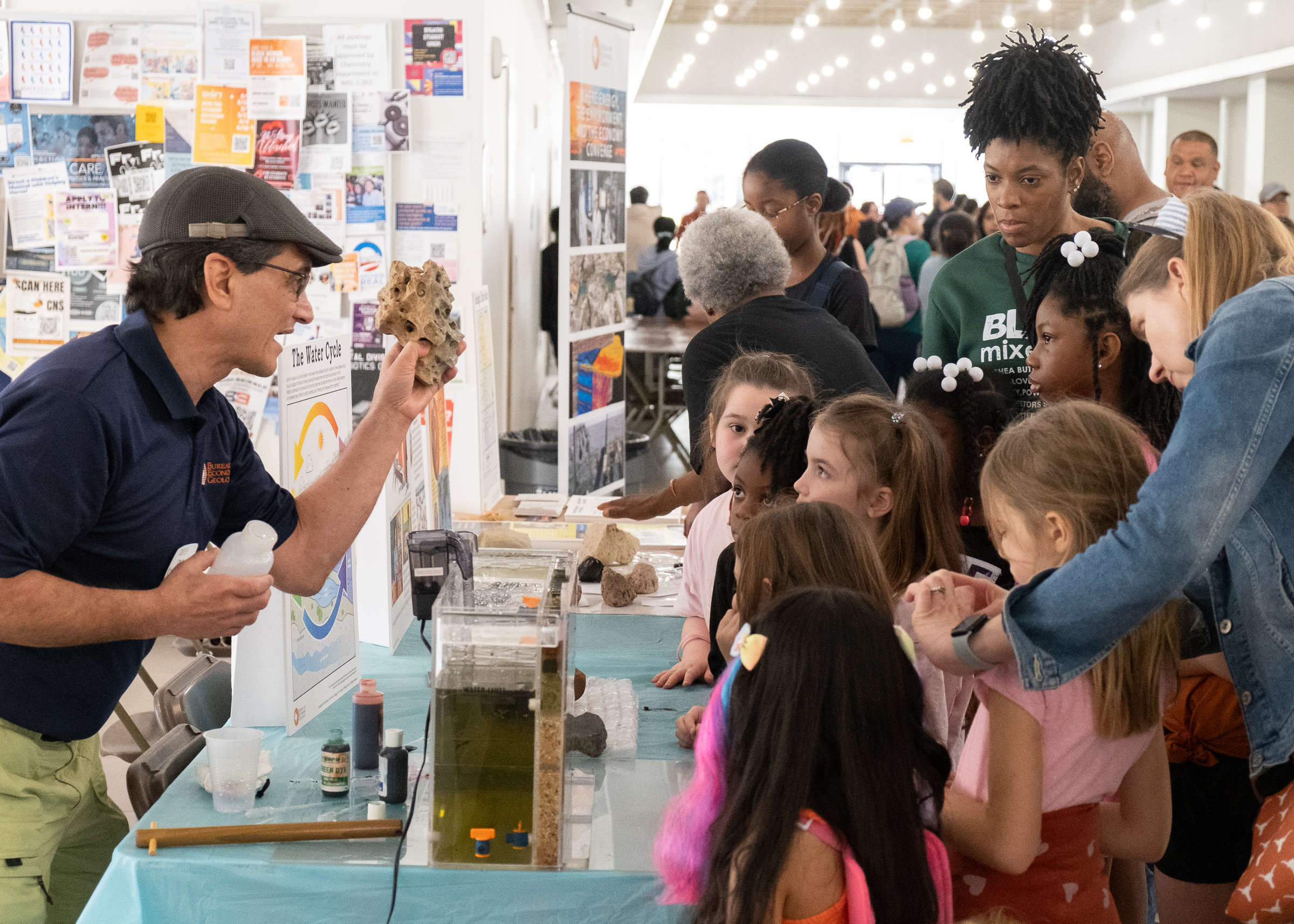
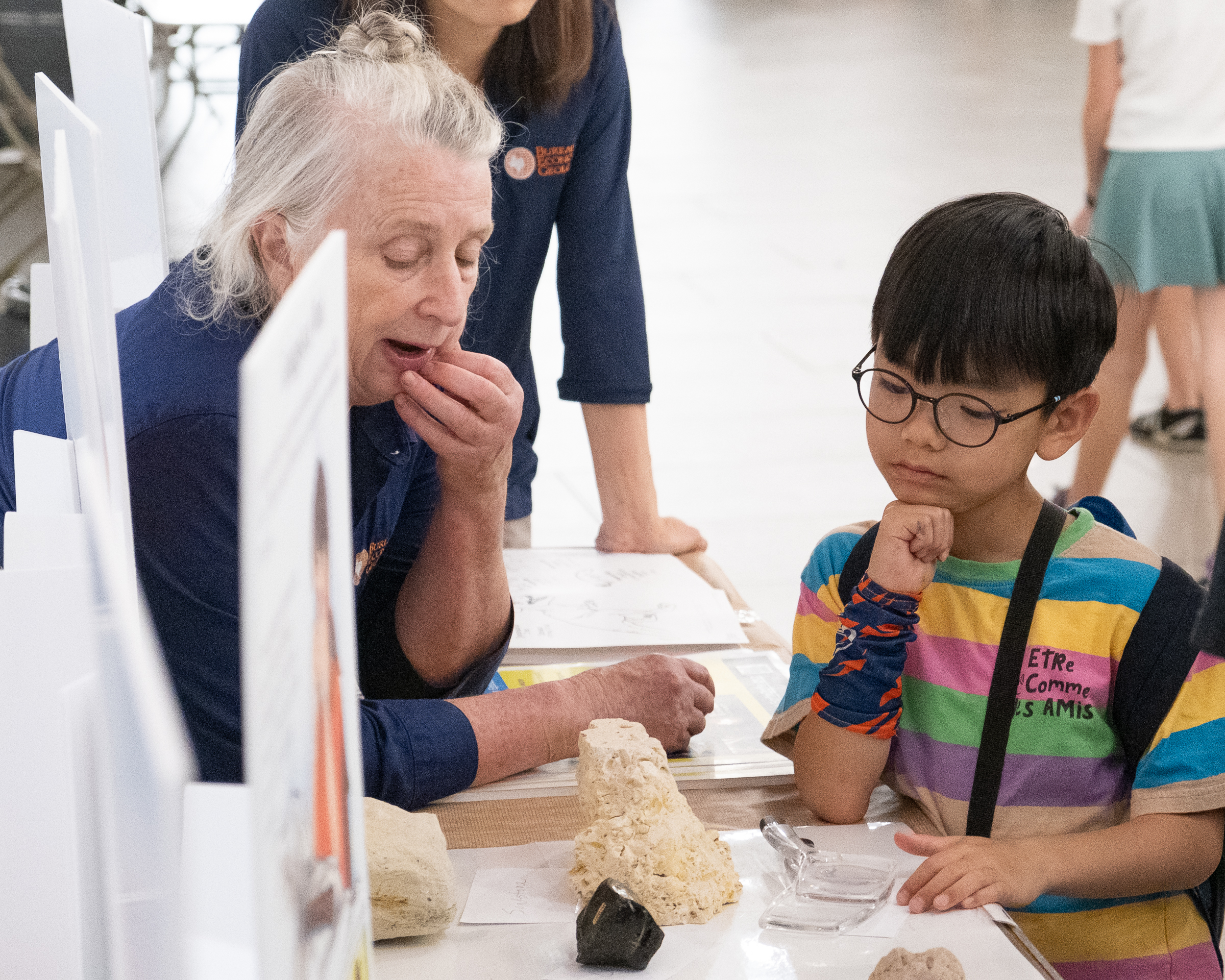
February 23, 2024: Zhicheng (William) Wang had a presentation entitled, Numerical Simulation 101 & 201: Introduction to Macro-Scale Simulations, and Pore-Scale Lattice Boltzmann Method (LBM) for our team of researchers and students at our GCCC weekly meeting.
February 22, 2024: Tip Meckel presented the AAPG Distinguished lecture for the University of Oklahoma’s Pigott Colloquium Series. His presentation entitled, “The Role of Carbon Capture and Geologic Storage and Opportunities for Geoscientists Accompanying Energy Diversification” was well received. Later this spring, Tip will also visit Rice University and the Colorado School of Mines as part of this prestigious speaker series. Congratulations, Tip, for this honor and for spreading the word about carbon capture and storage.
February 20, 2024: Ramón Treviño presented “Carbon Capture & Sequestration: Implications for Groundwater” to the Texas Commission on Environmental Quality’s (TCEQ’s) bi-monthly brown bag seminar. These seminars provide continuing education credits to TCEQ geoscientists licensed by the Texas Board of Professional Geoscientists. Sixty five people attended the presentation.
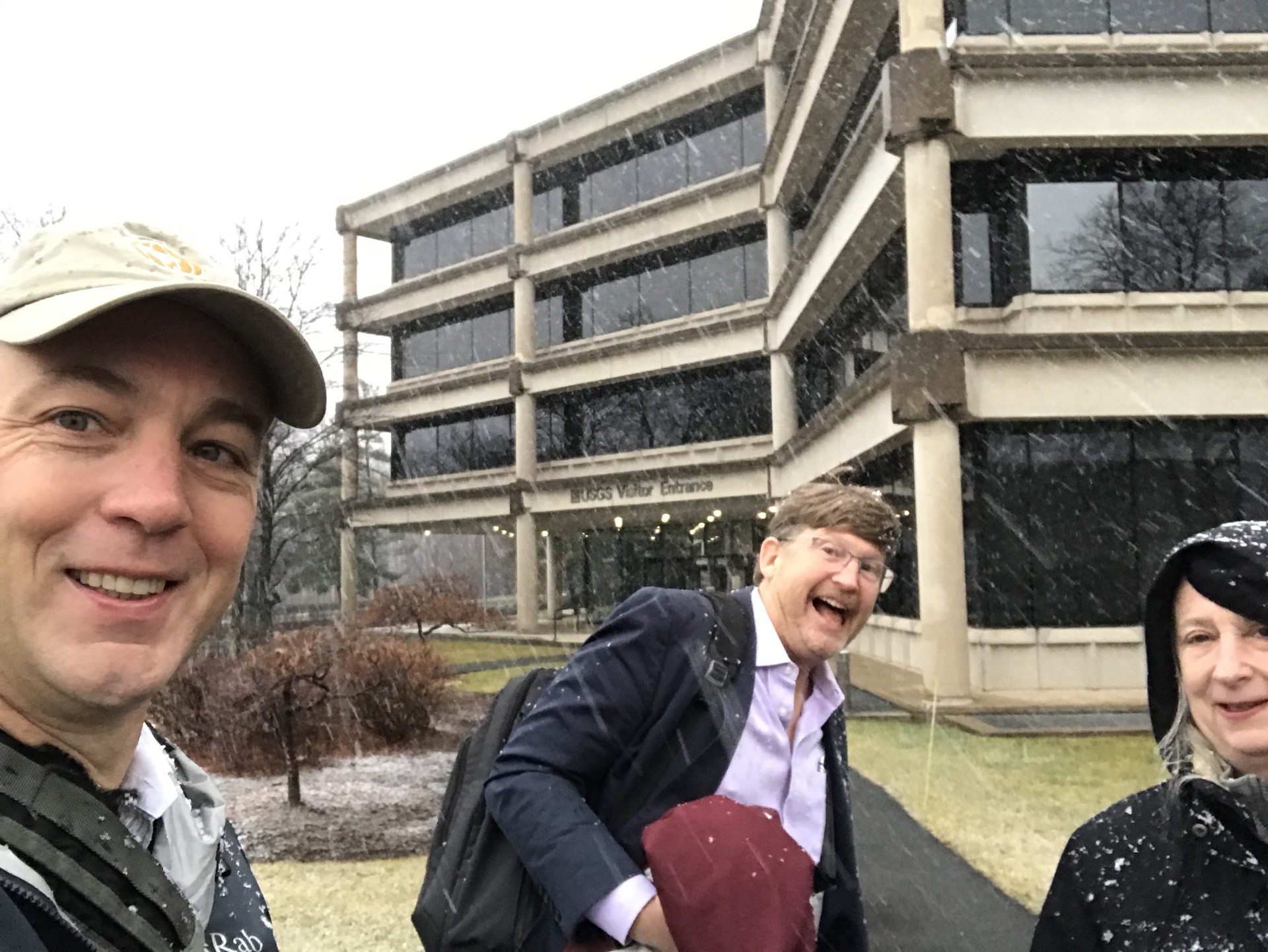
February 13–14, 2024: Sue Hovorka, Alex Bump, and Tip Meckel traveled to Reston, Virginia for an in-person only, Joint DOE-DOI Technical Workshop on Basin-Scale Issues for Carbon Storage. According to the United States Energy Association, “the objectives of the workshop included discussing effective ways to aggregate and serve data, and to provide DOI Bureau information for developing models for management of the nation’s vast Federal land and ocean resources.”
The topics and attendees represented both with onshore and offshore expertise and interests from many different agencies that are now becoming involved in CCS. Lengthy discussion sessions allowed great exchange of knowledge and ideas. Alex Bump had a presentation entitled, “Effective Basin Management for Different Types of Basins.” Special thanks to Sean Brennan and Rajesh Pawar for leading great discussions on basin-scale issues for carbon storage at this meeting.

February 13, 2024: The Texas-Louisiana Carbon Management Community (TXLA CMC) hosted the first public kick-off meeting in a webinar. TXLA CMC, in response to NETL’s Funding Opportunity Announcement DE-FOA-0002799, includes a carbon capture and storage (CCS) network from The University of Texas at Austin, Texas A&M University Kingsville, Texas A&M University Corpus Christi, University of Houston, Lamar University, and Louisiana State University. A goal of TXLA CMC is to utilize experts from these Universities to support and share information about CCS to communities and to diverse stakeholders in the Gulf Coast Region.
The Gulf Coast Carbon Center's Sue Hovorka is the PI for TXLA CMC and Angela Luciano is the Project Manager. In the first webinar, University leaders introduced themselves and highlighted project objectives. If you are interested in joining the TXLA CMC phone book for updates or to find out more about TXLA CMC activities, please sign up here.
February 9, 2024: Hailun Ni’s graduate student, Jose Ubillus, presented an update on his research entitled, "How do you scale up insight from lab experiments and core data to help build plume models that reflect real-world CO2 plume migrations, correctly?" at the GCCC’s weekly meeting.
February 8, 2024: Excited to announce that Dr. Katherine Romanak virtually presented on the topic of “Carbon Capture - Monitoring, Safety and Geologic Impact of Underground CO2 Injection” to the Healthy Planet Action Coalition (HPAC). The HPAC is “an international organization that advocates for an urgent and more ambitious global response to climate change.”
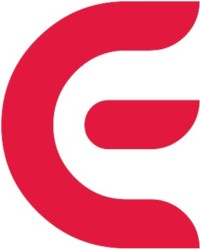
February 2, 2024: Zhicheng (William) Wang held a virtual EASiTool Workshop for participants currently in the Society of Exploration Geophysicist’s (SEG’s) Evolve Program. The SEG Evolve Program is a 6-month-long virtual internship, where mentors guide a multidisciplinary group of students and professionals from different countries through real-world datasets. William provided a training session for groups working on carbon storage projects using EASiTool software to help them conduct storage capacity estimations, and associated, economical evaluations. William extends his gratitude to Jessica Dostal and Jim DiSiena from SEG for their contributions during the workshop.
January 30 – February 1, 2024: In Houston, TX, the GCCC’s Carlos Uroza attended the conference entitled, “Investable CCUS Projects in Oil & Gas 2024: Pathways for Commercially Viable Capture, Transportation, Storage, and Utilization for EOR” specifically geared towards “combining financial incentives with technical and logistics solutions.”
While at this meeting, Carlos provided a 20-minute presentation about, “Identifying and Assessing Suitable Saline Aquifers for CO2 Storage Based on their Geological, Hydrological, and Geochemical Properties.” This presentation was categorized under aquifer selection and characterization in a session entitled, “Mastering CO2 Storage Site Selection: Comprehensive Analysis of Oil Wells, Depleted Reservoirs, and Saline Aquifers.” The following list outlines the considerations and assessments that Carlos’ presentation touched on:
- Ensure the integrity of the saline aquifer and assess an aquifer’s ability to contain injected CO2 over the long term securely
- Understand the interaction between CO2 and the saline aquifer, including its solubility, mineral reactions, and the potential for CO2 trapping mechanisms such as dissolution, residual trapping, and mineralization
- Develop effective injection strategies to optimize CO2 storage, considering factors such as injection rates, well design, and operational monitoring techniques to track the movement, behavior, and fate of the injected CO2 within the aquifer
- Conduct comprehensive risk assessments to identify and mitigate potential risks associated with saline aquifer storage, including geological risks, operational risks, and potential impacts on groundwater resources and the environment
- Establish a robust monitoring and verification program to continuously monitor CO2 behavior, aquifer pressure, and potential leakage, ensuring the safety and integrity of the storage operation.
January 30, 2024: Hailun Ni and Sue Hovorka took undergraduate and graduate students from the Jackson School of Geosciences on a field trip at Austin’s Core Research Center for their course entitled, “GEO371T/391: CO2 Injection and Storage in Geological Formations.”
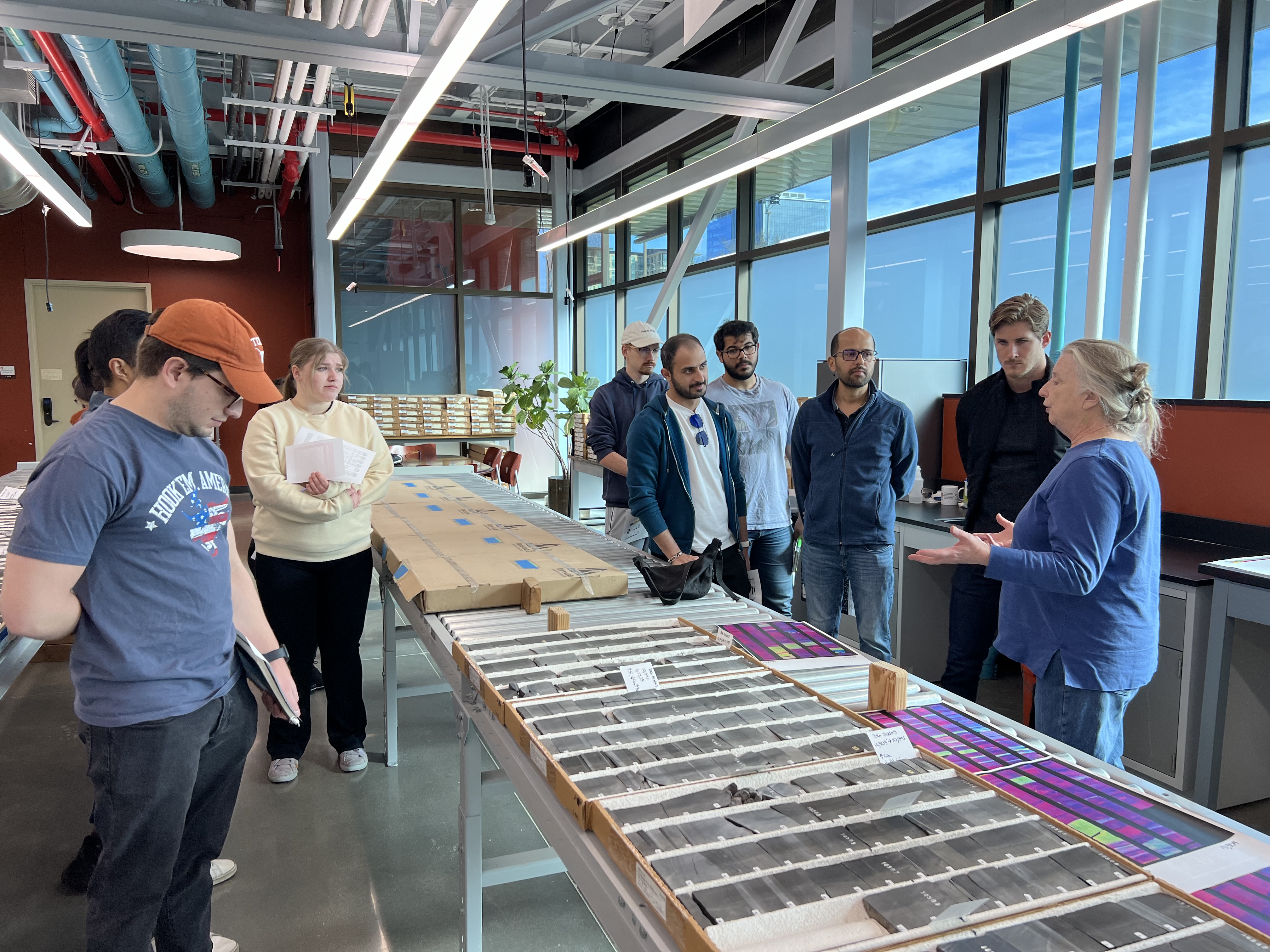
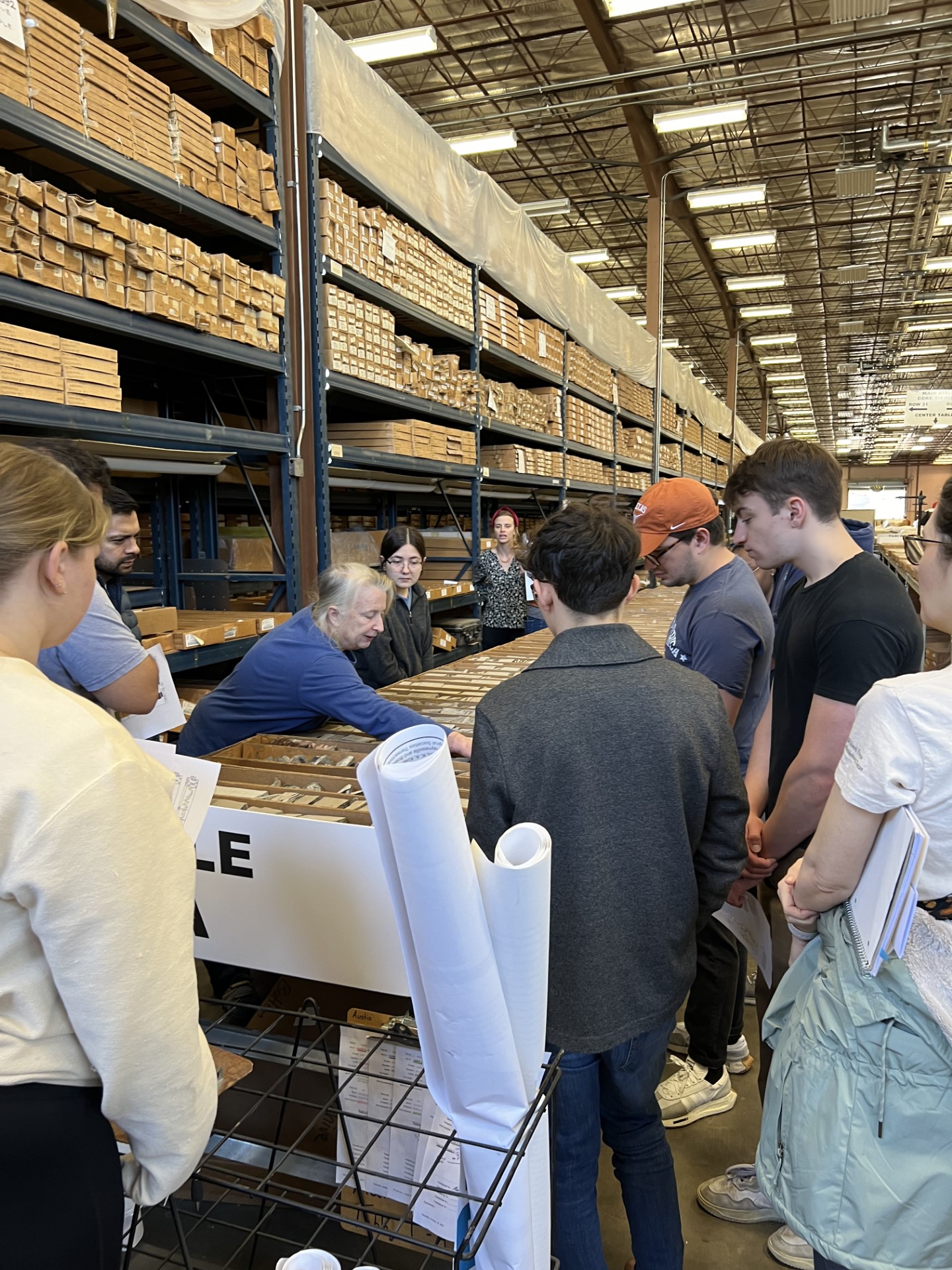
January 29, 2024: Special thanks to Professor Myles Allen, from the University of Oxford, for visiting us at the Bureau of Economic Geology and Jackson School of Geosciences at The University of Texas at Austin. Myles provided a riveting seminar and visited with many of our researchers, postdoctoral fellows and students throughout the day. Thanks to Katherine Romanak for organizing this event.
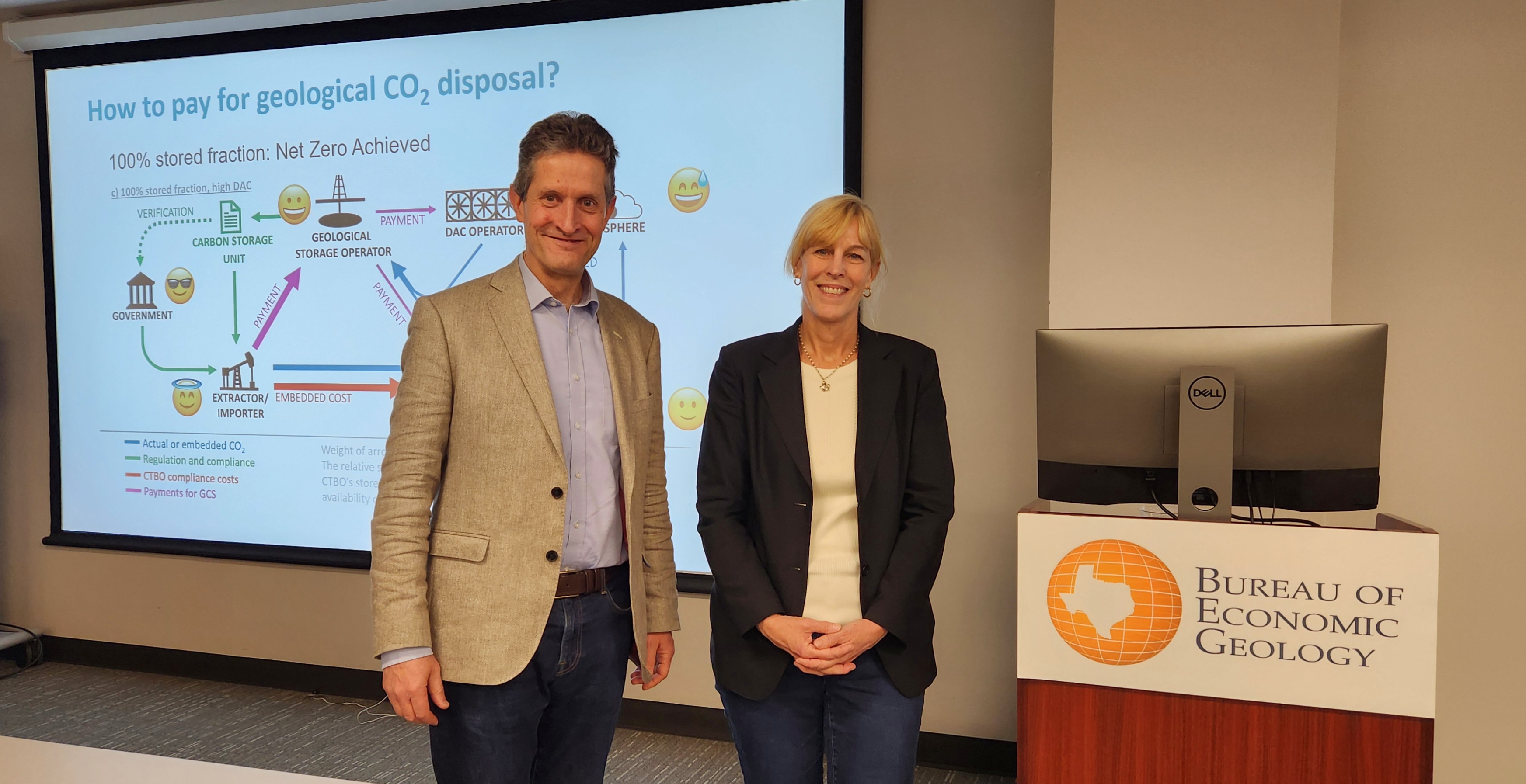
January 24–25, 2024: Associated with UTCCS-7 held on January 23, 2024, the Gulf Coast Carbon Center (GCCC) and the Texas Carbon Management Program (TxCMP) hosted a joint meeting for Sponsors of their consortiums. On January 24, approximately 110 people attended this meeting in person, and ~114 people joined, virtually. On January 25th, approximately 75 people attended this meeting in person, and 64 people joined in, virtually.
The event was a great success and even included two sessions in a workshop-style format. Seyyed Hosseini hosted a workshop on the “Best Practices in Dynamic Modeling.” Sue Hovorka, Katherine Romanak, and Ramón Gil-Egui hosted a “Roundtable Discussion about Handling Societal Aspects of CCS.”
January 23, 2024: The Gulf Coast Carbon Center (GCCC), joined the Texas Carbon Management Program (TxCMP), and the UT Energy Institute to host UTCCS-7, UT’s CCS Showcase that features a day of presentations covering current CCS topics and CCS technical research at UT Austin. The event was held at the UT Austin’s Pickle Research Campus Commons Conference Center’s in Austin, TX. We had ~170 people who attended the event in person, and ~204 people log in remotely to listen in to presentations throughout the day. Tim Dixon, from IEAGHG, provided a summary of this event here. Presentations that are permitted to be publicly available are included on the event’s page found here.

January 16, 2024: Lucy Atkinson, Dorothy Dankel, and Katherine Romanak published, “The effect of monitoring complexity on stakeholder acceptance of CO2 geological storage projects in the US gulf coast region” in Frontiers in Marine Science.
January 11, 2024: On behalf of the Bureau of Economic Geology’s Gulf Coast Carbon Center (GCCC), Carlos Uroza was the guest speaker for the Geophysical Society of Houston’s Unconventional and New Energy Special Interest Group, which was hosted by TGS. Carlos provided a lunch-time presentation to the society entitled, “Exploring the Opportunities for CO2 Storage in the Gulf Coast Area.” Click here to read more about the event.
January 11, 2024: Alex Bump's graduate student, Ismail Faruqi, presented at a Sponsors' Meeting for the ongoing, industry-supported, Gulf of Mexico Basin Depositional Synthesis (GBDS) Project spearheaded by The University of Texas Institute for Geophysics (UTIG). Ismail’s presentation entitled, “Evaluation of CO2 Storage Potential in Federal Waters, Gulf of Mexico Shelf” was well received at this meeting in Austin, TX. The GCCC enjoys collaborating with the GBDS and we thank GBDS for the invitation.
January 5, 2024: Angela Luciano presented a Tech Talk entitled, “Documenting Long-term Operational Success of Class 1 Wells in the US Gulf Coast to Build Confidence in the UIC Program” at the Bureau of Economic Geology.
January 5, 2024: Carlos Uroza’s graduate student, Maria Madariaga, presented an update at the GCCC’s weekly meeting about her Master’s research entitled: "Assessment of the Wilcox System for CO2 Storage Potential, onshore South Texas."

